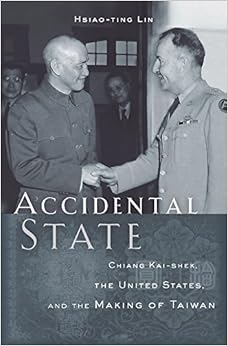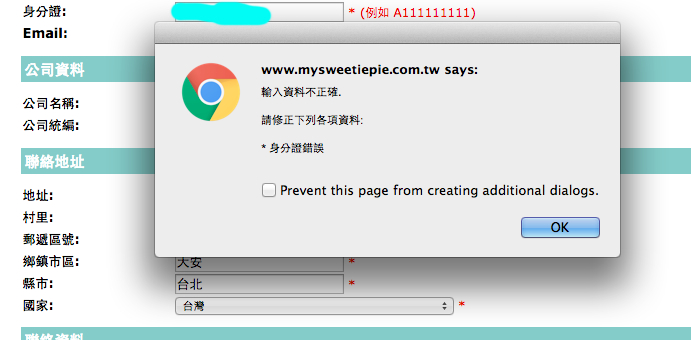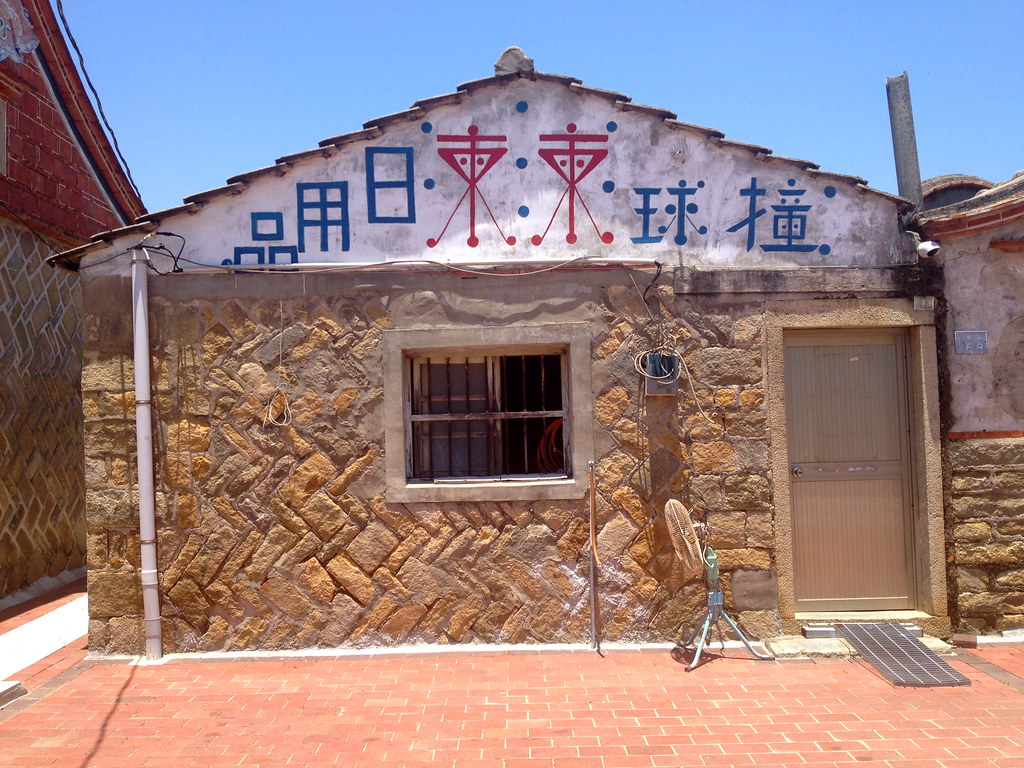I got a weapon in my lungs
So tell the fuckin' cops to come
Get ready now
We never back down
- Back Down (Traudes)
This is what I was listening to as I worked with Ketagalan Media on the final edits to my latest piece, a rebuttal to J. Michael Cole's editorial on the importance (or lack thereof) of Taiwanese vs. ROC imagery and symbolism.
And it occurred to me: there was a time in Taiwanese history that my writing a piece like this was illegal, and the cops would have come. In many cases, the cops did come, and people died, some by their own hand. Now, thanks to the efforts of the Taiwanese people and not the dictatorship that persecuted them, I can say these things freely. The cops aren't going to come.
And yet, the symbol of the party that once sent the cops a-knockin' is still on the national flag for some unfathomable reason. I cannot agree that this isn't something we should keep talking about, nor that those who want to see party symbols wiped off the flag should settle down and 'play nice' so we can 'transcend' our 'small differences'.
That is to say, while I agree with some of Cole's points, I take exception to others: it is neither narcissistic nor a 'small difference' to have a legitimate point of contention that the symbol on the "national flag" is the symbol of one political party (in a democracy!), and the party that committed mass murder at that.
I'm sure a foreign resident giving her unvarnished opinion on the imagery associated with a country she is not a citizen of is likely to raise some hackles. All I can say first, is that this is my home too, and I do get to have an opinion on the goings-on in my home. And secondly, that there are a lot of people who agree with me.
Taiwan deserves better. And I may not be the perfect spokesperson for that, but every last one of us has a weapon in our lungs. Let's use them.
Showing posts with label roc. Show all posts
Showing posts with label roc. Show all posts
Saturday, October 14, 2017
Tuesday, July 18, 2017
I just creamed my pants over this article in The Diplomat
No, really, this is excellent:
The Chinese Cult of Cairo
This is what people who have actually studied Taiwanese history have been saying for years. This is a truth that, while fairly well-known by those who know Taiwan, is rarely put in print for easy reference. It is a thing of beauty - clear, precise, accurate.
I quite literally gasped when I read it. I haven't seen something this clearly lay out the 1943-1952 history of the region...well, ever. Maybe I wasn't looking hard enough, but honestly, such work is hard to come by.
Even "Accidental State", which covers this period of history ending with Dulles' final agreement with Chiang Kai-shek, gives only one paragraph to this complex string of treaties which seem opaque to many (but actually aren't), and doesn't fully explain them.
It fully explains certain myths, like the idea that Cairo and Potsdam are legally binding (wrong), that the Treaties of San Francisco and Taipei unequivocally give Taiwan to China (wrong), that the ROC has been the sole legitimate government of Taiwan since 1945 (wrong), and that international law/ the UN / the United States / the goddamn Cookie Monster considers Taiwan to be Chinese, or even settled as "the ROC" with no other interpretation needed, that the ROC believed Taiwan to be "returned" to them (false) or that these powers intended for Taiwan to be a part of China (nope), that Taiwan was "returned" to China at all (wrong) or any other manner of stupid claims.
We need more work like this to drown out China's sound and fury which signifies nothing.
For once, I have nothing to add. That should tell you all you need to know.
The Chinese Cult of Cairo
This is what people who have actually studied Taiwanese history have been saying for years. This is a truth that, while fairly well-known by those who know Taiwan, is rarely put in print for easy reference. It is a thing of beauty - clear, precise, accurate.
I quite literally gasped when I read it. I haven't seen something this clearly lay out the 1943-1952 history of the region...well, ever. Maybe I wasn't looking hard enough, but honestly, such work is hard to come by.
Even "Accidental State", which covers this period of history ending with Dulles' final agreement with Chiang Kai-shek, gives only one paragraph to this complex string of treaties which seem opaque to many (but actually aren't), and doesn't fully explain them.
It fully explains certain myths, like the idea that Cairo and Potsdam are legally binding (wrong), that the Treaties of San Francisco and Taipei unequivocally give Taiwan to China (wrong), that the ROC has been the sole legitimate government of Taiwan since 1945 (wrong), and that international law/ the UN / the United States / the goddamn Cookie Monster considers Taiwan to be Chinese, or even settled as "the ROC" with no other interpretation needed, that the ROC believed Taiwan to be "returned" to them (false) or that these powers intended for Taiwan to be a part of China (nope), that Taiwan was "returned" to China at all (wrong) or any other manner of stupid claims.
We need more work like this to drown out China's sound and fury which signifies nothing.
For once, I have nothing to add. That should tell you all you need to know.
Saturday, April 8, 2017
Accidental State: A Review
I read this awhile ago, but feel committed to writing up even brief commentary on every book on Taiwan that I pick up, so figure I should write about this before my reactions to it flutter away and I have to rush around trying to recapture them.
That sounds like a milquetoast beginning, but in fact I actually thoroughly enjoyed this book. I appreciated that it was trying to make a case for a line of thinking on the first years of the ROC on Taiwan rather than read as a straight history, and I appreciate that it built up evidence for that case well. The tight focus is also appreciated, narrowing in on the short span of years between the ROC "taking over" Taiwan from Japan, with a few flashbacks to the Chinese Civil War era, up through the KMT's flight to Taiwan and the early 1950s - ending more or less with the 1954 Mutual Defense Treaty.
Lin's argument is simple: nobody - not the ROC, nor the US, nor the Allies, nor Japan, nor the KMT or Communists, nor the United Nations, nor Chiang himself and certainly not Taiwan or the Taiwanese - had ever intended for the ROC or Taiwan to be what it is today. Everything about the making of modern Taiwan as the last holdout of the ROC (which I happen to view as a colonial regime in Taiwan on life support, but that view is not explored in this book) was an accident - Taiwan as it exists today is, then, an accidental state. What, exactly, it was supposed to be or what it might have been better off being remains an unanswered question. Lin explores how, once it was clear Taiwan would no longer be Japanese, the West more or less wanted to see Taiwan in the secure hands of an ally but where not as committed as one might think to that ally necessarily being the ROC (or Chiang Kai-shek, especially), as well as how the ROC itself never intended for Taiwan to be anything other than a part of China. It also makes it quite clear that a self-rule movement did exist that early on in Taiwan itself.
I did learn quite a bit reading Accidental State - much I already knew, such as the background factors that caused the 228 Massacre to play out as it did, but appreciated the further cementing of that knowledge by the narrative, and many details I had not known were filled in. While Lin does not go so far as to imply that Chiang either wanted or intended for something like 228 to happen, he certainly points out that Chiang did not necessarily think that Chen Yi had done anything wrong. The level of detail was mostly about right, and the writing is engaging and offers some depth without being overly academic. I'd say this alone makes it an important read for Taiwan and International Affairs buffs, if not an essential one for someone who is already familiar with the details of Taiwan's status and history in that era and is able to reverse-engineer Lin's central argument from same.
Of course, I have a few quibbles. Lin spends a lot of time discussing the shrinking of the ROC's territory in China, which was legitimately interesting and quite pertinent (and provided a few details my historical readings had missed, such as the final push to maintain ROC control in Yunnan), but mentions only in passing that Chiang, upon fleeing to Taiwan, decided to yet again assume the presidency (he was not in office for a few years - long story, read the book). He goes into loving detail over military shipments as well. From this book, I learned exactly how many carbines the US sent Nationalist guerillas in 1951, among other weapons and munitions (680 if you were curious, which I wasn't really). And yet the Treaty of San Francisco and Treaty of Taipei are given, together, about half a page - about the same as the space given to the entirety of that 1951 shipment. I had gone in hoping for a deeper understanding of these treaties - as I'm not a specialist and do not currently have an understanding I'm satisfied with - and came out, if anything, more confused than before.
There is quite a bit of detail on other military matters - including more lists of arms provided to the fledgling accidental state - but very little on the ideological differences between Chiang Kai-shek and KC Wu, the political slide and eventual execution of Chen Yi, or the reasons why the US spent so much time prevaricating on Chiang himself (I had known the US had not been as wholeheartedly supportive of him or his role in the ROC as many later believed, but I had not realized the extent of their ambivalence). These would have all been of great interest to me had they been explored in more detail, whereas exact munitions counts for military operations that happened in the immediate post-war era? Not so much. I would also argue these issues are more relevant to the ideological evolution of the ROC on Taiwan than, say, how many guns were sent more than half a century ago.
So, all in all, I enjoyed the book and do recommend it, especially for those with moderate, non-specialist historical knowledge but who are not neophytes to Taiwanese history. Go ahead and skim through the lists of war materiel, you aren't going to miss anything, and for a deeper understanding of some of the issues Lin unfortunately glosses over - which would have made for a stronger book if he had gone into more detail - perhaps read up from other sources.
Wednesday, April 5, 2017
For love of a forbidden nation: why, exactly, I want dual citizenship
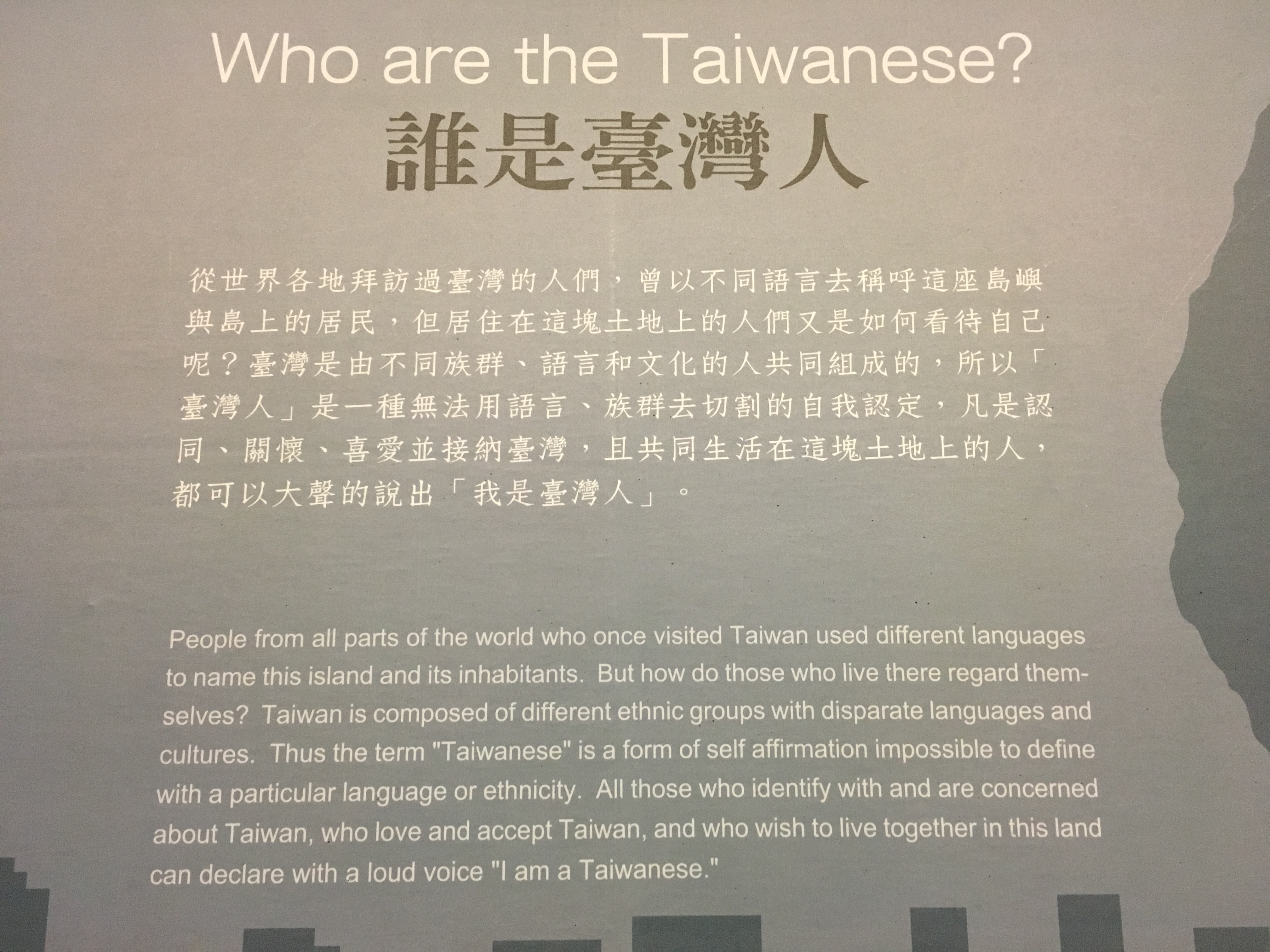 |
| Sign at the National Museum of History in Tainan. So I can't be a citizen because...? |
Since writing my last post on the not-great new regulations on dual nationality for foreigners in Taiwan, I've engaged in quite a few discussions of the matter. I've been asked quite a few questions on why I want to be a citizen, why permanent residency is not enough, how I can still support the "Hoklo nationalists" who don't want foreigners in their country (which - huh? In 2017 you think that, really?), and why I can't give up my US citizenship.
So, I thought I'd offer some answers.
I've also noticed that much of the narrative on those seeking to naturalize in Taiwan comes from those married to locals, giving them family ties here, or who have children here (whether the children have a Taiwanese parent or not), or grown children who were born here. I have sympathy for all such people and support their fight, but some may be wondering why a foreigner, married to another foreigner with no children born here, would want to naturalize. Seems odd, doesn't it? But here I am.
Below are a few of the things I've heard on this matter (some condensed or re-written for clarity) followed by an explanation of why I, and many foreigners, feel the way we do about dual nationality in Taiwan. This is in part deeply personal but also, I think, speaks to the experiences and issues of many who call Taiwan home, and I hope lays bare some central issues that might not be otherwise considered.
So, I thought I'd offer some answers.
I've also noticed that much of the narrative on those seeking to naturalize in Taiwan comes from those married to locals, giving them family ties here, or who have children here (whether the children have a Taiwanese parent or not), or grown children who were born here. I have sympathy for all such people and support their fight, but some may be wondering why a foreigner, married to another foreigner with no children born here, would want to naturalize. Seems odd, doesn't it? But here I am.
Below are a few of the things I've heard on this matter (some condensed or re-written for clarity) followed by an explanation of why I, and many foreigners, feel the way we do about dual nationality in Taiwan. This is in part deeply personal but also, I think, speaks to the experiences and issues of many who call Taiwan home, and I hope lays bare some central issues that might not be otherwise considered.
First, and quickly, Taiwanese do not have to give up their citizenship to obtain nationality elsewhere if the second country doesn't require it, and most nations that Taiwanese seek dual citizenship from don't. It's an unfair and ridiculous double standard pure and simple - some countries only allow you to have their own citizenship and no other, others allow multiple, but none that I know of has a similar double standard for born vs. naturalized citizens.
Consider as well people with foreign citizenship who are of Taiwanese heritage, who seek, and obtain, Taiwanese citizenship without giving up their original passport.
Are they not "loyal" to Taiwan? Do they have good reasons for not giving up their Taiwanese citizenship? What do you think those reasons are? For Taiwanese who live abroad permanently or were born abroad, it probably has to do with family ties and potentially needing to return to one's country of birth for related reasons.
Well, those are my reasons too, and other foreigners here share similar stories. As I wrote in this op-ed, I have family in the US and they are aging. Most notably, my father, especially after my mother's passing, may well need my care or help at some point in the future. When my mother passed, I spent nearly half a year in the US setting everything in order and taking care of my dad when he needed me most. I needed to do that; I do not know exactly how my family might have imploded if I hadn't, but it might well have done. I am not rich and wasn't sure how long I'd be away - although my husband could send me some money, I needed to work while I was there, he was in charge of maintaining our life materially and financially while I was away and while we do well enough, we aren't rolling in money. In fact, I left before my mother's death and, had she not passed soon after my arrival, I might have been in the US for a year or more. Just a few months later, I needed to return for several weeks to take care of my father after quintuple bypass surgery. The next time I'm needed, who knows how long I'll need to go and whether I'll need to work to make ends meet.
If I gave up my American citizenship, I would not be able to care for my family in the US in ways that might be necessary, perhaps on very short notice. I would not be able to stay for indefinite periods nor be able to work. In Trump's America, I'm not sure a former citizen who renounced their US nationality would be so easily allowed in, even though Taiwanese have visa-free entry, though I hope this is will cease to be a valid concern in short order. In any case, it is simply not a viable option while I have family members who may eventually need me, either for long-term issues or emergency care, to give up my American citizenship. If I were wealthy, perhaps, but I'm not. I actually need those work and residency rights, as was evidenced just a few short years ago.
A second reason, though one I like to dwell on less and place less importance on, is that even if I naturalize, I will never be considered fully Taiwanese, which I explore considering more local issues below. From an international perspective, however, there is a double standard most people don't think about: the possibility of Chinese invasion and what will happen to naturalized Taiwanese citizens if it happens. I don't necessarily think it will, but the possibility cannot be dismissed.
When China took over Hong Kong, it did not give citizenship to Hong Kongers not of Chinese descent (some later applied, but it is not clear how often such applications are accepted. In any case, considering how many non-Chinese native people there are in territories ruled by China - namely Inner Mongolia, Tibet and Xinjiang though others exist - I find it hilarious and ironic that China would insist on being of "Chinese descent" to be a Chinese citizen, because what the hell does that even mean?) In any case, non-"Chinese" Hong Kongers who had other citizenships kept them, and were given permanent residence in Hong Kong. Not all non-"Chinese" in Hong Kong, however, had a foreign citizenship. They became British National Overseas citizens (this sounds weird, but it is a class of nationality). Those who did not apply would have been rendered stateless.
If China invades Taiwan and wins, Taiwanese citizens will end up being Chinese citizens. The vast majority do not want this, of course, but it would at the very least mean not being stateless. That's a low bar to pass, but I would not even pass that. Which nation would give me nationality if I became solely a Taiwanese citizen, but Taiwan's current government ceased to exist, subsumed by a government that would never transfer my citizenship? (To be clear, they would never give it to me - one look at my political views and you can forget it. Nor do I think I should have to be secretive about my political views for some possible future occurrence.) The US would certainly not give it back - unlike some countries, they do not look kindly on former citizens who renounce but then want back in.
That's not to say I want to be Chinese - I want to be a Taiwanese citizen, not a Chinese one, but being Chinese is better than being stateless. Barely.
Regardless, as horrible as it would be to be under the oppressive rule of the Chinese government, being stateless is not a worry shared by the Taiwanese. This hard, uncomfortable truth means, as much as there shouldn't be, there is a difference. I don't think any person could reasonably expect a foreigner to take that risk - not even "ethnically Chinese" foreigners who get dual nationality here have that worry.
Rest assured, however, that my reluctance to give up my American passport has nothing to do with this. I love Taiwan, and want (well, need to) keep my American citizenship for practical purposes. I care about the US insofar as I don't want to see the country of my birth locked in the death spiral that seems to have been exacerbated by Donald Trump. But Taiwan is my home - it's where I've chosen to live.
Renouncing is simply not possible. The Taiwanese government is surely aware that the pound of flesh they are asking for is too much, and yet they ask it anyway.
Allowing some foreigners to have dual nationality is a small step but it's a step in the right direction.
There are other ways to achieve your goals in Taiwan
There's no point. You will never be Taiwanese and you will never be fully accepted.
Yeah, I know, and I've accepted this.
It's not even necessarily a bad thing - Taiwanese history is not my history, and I would not seek to appropriate it. It belongs to the people whose ancestors lived it and I respect that.
But pushing for social and 'everyday' acceptance is a different battle from pushing for legal/governmental acceptance. I don't see how we can truly ask for the former if the latter is denied us. So there is a point, and it doesn't require every person in the country suddenly welcoming people who don't look like them as exactly the same as them (to be honest, culturally we are not exactly the same and it is okay to acknowledge that).
This is true, and this is the point, even before we get into questions of what it means to be Taiwanese (which I will not get into here).
Why should Taiwan give you citizenship? They're doing this based on what they have decided is beneficial to them, and clearly what you provide isn't valuable enough.
You don't deserve citizenship because you would never fight for Taiwan. If, say, China actually invaded, you'd just run back to where you came from. That's probably why you don't want to give up your original nationality.
Ah, you've got that backwards. I wouldn't stay and fight for Taiwan now because I am not a citizen. Why would I fight for a country that won't fight for me? I've already invested in a country that won't invest in me, that's already saying a lot. If I were granted citizenship, I would not turn and flee so quickly. I love Taiwan, and I would, in fact, fight for her. I won't even say that about the country I was born in!
This is not at all why I don't want to give up my original nationality. I would view returning to the US as a step backward, not forward.
You just want Taiwan to give, give, give. You have a privileged existence in Taiwan already, be happy with that!
In fact, I don't just want Taiwan to "give". I've spent ten years of my life doing what I can to be a net benefit or contributor to Taiwan (although I cannot work for free because, unlike a missionary, I don't have an institution funding me, I do try to contribute). Only recently, after all that, have I come to want equal opportunity to naturalize and hold dual nationality under the law rather than be subject to an unfair double standard. I would not, however, be asking for this if I didn't feel I had in fact given more than I'd taken.
It is true that white Western foreigners enjoy a lot of privileges in Taiwan. I don't like this, and don't want the privilege, but the nature of privilege is of course that you don't get to choose it and it doesn't matter if you identify with it: you have it or you don't all the same.
However, by making things equal for all foreigners and equal under the law for naturalized and born citizens regarding dual nationality, I'm arguing in fact to be treated more like a Taiwanese, not less. I want political representation, just as any immigrant would.
I don't think this is a crazy, privileged, selfish or irrational request.
Are they not "loyal" to Taiwan? Do they have good reasons for not giving up their Taiwanese citizenship? What do you think those reasons are? For Taiwanese who live abroad permanently or were born abroad, it probably has to do with family ties and potentially needing to return to one's country of birth for related reasons.
Well, those are my reasons too, and other foreigners here share similar stories. As I wrote in this op-ed, I have family in the US and they are aging. Most notably, my father, especially after my mother's passing, may well need my care or help at some point in the future. When my mother passed, I spent nearly half a year in the US setting everything in order and taking care of my dad when he needed me most. I needed to do that; I do not know exactly how my family might have imploded if I hadn't, but it might well have done. I am not rich and wasn't sure how long I'd be away - although my husband could send me some money, I needed to work while I was there, he was in charge of maintaining our life materially and financially while I was away and while we do well enough, we aren't rolling in money. In fact, I left before my mother's death and, had she not passed soon after my arrival, I might have been in the US for a year or more. Just a few months later, I needed to return for several weeks to take care of my father after quintuple bypass surgery. The next time I'm needed, who knows how long I'll need to go and whether I'll need to work to make ends meet.
If I gave up my American citizenship, I would not be able to care for my family in the US in ways that might be necessary, perhaps on very short notice. I would not be able to stay for indefinite periods nor be able to work. In Trump's America, I'm not sure a former citizen who renounced their US nationality would be so easily allowed in, even though Taiwanese have visa-free entry, though I hope this is will cease to be a valid concern in short order. In any case, it is simply not a viable option while I have family members who may eventually need me, either for long-term issues or emergency care, to give up my American citizenship. If I were wealthy, perhaps, but I'm not. I actually need those work and residency rights, as was evidenced just a few short years ago.
A second reason, though one I like to dwell on less and place less importance on, is that even if I naturalize, I will never be considered fully Taiwanese, which I explore considering more local issues below. From an international perspective, however, there is a double standard most people don't think about: the possibility of Chinese invasion and what will happen to naturalized Taiwanese citizens if it happens. I don't necessarily think it will, but the possibility cannot be dismissed.
When China took over Hong Kong, it did not give citizenship to Hong Kongers not of Chinese descent (some later applied, but it is not clear how often such applications are accepted. In any case, considering how many non-Chinese native people there are in territories ruled by China - namely Inner Mongolia, Tibet and Xinjiang though others exist - I find it hilarious and ironic that China would insist on being of "Chinese descent" to be a Chinese citizen, because what the hell does that even mean?) In any case, non-"Chinese" Hong Kongers who had other citizenships kept them, and were given permanent residence in Hong Kong. Not all non-"Chinese" in Hong Kong, however, had a foreign citizenship. They became British National Overseas citizens (this sounds weird, but it is a class of nationality). Those who did not apply would have been rendered stateless.
If China invades Taiwan and wins, Taiwanese citizens will end up being Chinese citizens. The vast majority do not want this, of course, but it would at the very least mean not being stateless. That's a low bar to pass, but I would not even pass that. Which nation would give me nationality if I became solely a Taiwanese citizen, but Taiwan's current government ceased to exist, subsumed by a government that would never transfer my citizenship? (To be clear, they would never give it to me - one look at my political views and you can forget it. Nor do I think I should have to be secretive about my political views for some possible future occurrence.) The US would certainly not give it back - unlike some countries, they do not look kindly on former citizens who renounce but then want back in.
That's not to say I want to be Chinese - I want to be a Taiwanese citizen, not a Chinese one, but being Chinese is better than being stateless. Barely.
Regardless, as horrible as it would be to be under the oppressive rule of the Chinese government, being stateless is not a worry shared by the Taiwanese. This hard, uncomfortable truth means, as much as there shouldn't be, there is a difference. I don't think any person could reasonably expect a foreigner to take that risk - not even "ethnically Chinese" foreigners who get dual nationality here have that worry.
Rest assured, however, that my reluctance to give up my American passport has nothing to do with this. I love Taiwan, and want (well, need to) keep my American citizenship for practical purposes. I care about the US insofar as I don't want to see the country of my birth locked in the death spiral that seems to have been exacerbated by Donald Trump. But Taiwan is my home - it's where I've chosen to live.
Renouncing is simply not possible. The Taiwanese government is surely aware that the pound of flesh they are asking for is too much, and yet they ask it anyway.
Allowing some foreigners to have dual nationality is a small step but it's a step in the right direction.
Yeah, maaaaaaybe. These "small steps" do seem to be how the government here often works. A friend pointed out that they revised the permanent residency system in a similar way.
If this were a question of breaking down societal resistance one baby step at a time, with a fairly quick succession of changes, I'd agree. However, I'm not sure at all that this is the case and it has not been put to me convincingly.
Mainly, I don't know what societal resistance there is, or rather, how strong it is. Surely there are some folks who do not want Taiwan to be a multicultural society - they like Taiwan as a place of "Taiwanese culture" (though I would argue Taiwanese culture has always been diverse and, in fact, 'multicultural') and don't really want lots of foreigners also claiming it. Multicultural harmony within a nation is, in fact, a difficult undertaking.
However, I have not met many people who feel this way. I just assume they exist because it's a very common attitude around the world. Literally every single person I have talked to about this issue either fully supports amending the citizenship law, or was unaware that a double standard exists. Some believe that foreign spouses can have dual nationality, but this is not the case. Some believe children born here can have it - also not the case. When their awareness on this issue is raised, they always - always, no exceptions - are sincerely supportive.
Other than some stodgy old legislators, perhaps, where is the societal resistance?
The other issue is one of time. I'm not in my twenties. My reasons for wanting dual nationality are practical: I can't even get a mortgage, for example, in the country I call home. I'm not even a second-class citizen: I'm not a citizen at all. I have no political representation in my home, and diminished rights. I can wait on the rights as generally we enjoy a good, even privileged, existence here. But having no access to certain financial tools as well as being unable to do certain things citizens can do with ease means that foreigner life in Taiwan is one of, in some ways, extended adolescence. I would like to function as a full adult here, and we can actually afford a mortgage if someone would just give us one.
If it's going to take five years, that's fine. It will be three before I finish my Master's, and I may well do a PhD (oh hell, if the only way I can get citizenship here is to get my PhD and become an "assistant professor", damn it I will, just watch me.) I don't see us buying an apartment before then.
However, I fear it won't be "a few years", I fear it'll be decades. Now that the government has done something, they're likely to sit back and congratulate themselves, and pretend nothing more needs to be done for awhile. I could be nearing retirement before this gets fully fixed in a way that includes people like me! That's truly not acceptable, but entirely possible. It is not convincing to say it might not take that long - it very well may.
In fact, I think it's likely. The KMT has shown no interest in changing the nationality law which they themselves wrote - well, the ROC did, same difference really - in the 1920s. The NPP has introduced a bill allowing dual nationality, but with only 5 representatives, one must be realistic. The DPP is going to be the one to do this - and I explore why in more detail below. They've done something, but it's not enough, and I don't think they are likely to act again this term or even during Tsai's tenure as president. Given that Taiwan seems to switch fairly regularly between parties every 8 years, it could be 7 years of Tsai, 8 years of President Whoever, and then the next DPP president might do something about it.
Frankly, that is too long to wait.
Finally, it's not a step in the right direction because rather than creating a policy based on greater equality, it legitimizes creating further divisions in the expat community where none need to exist. Ethically speaking I am, in principle, against creating more divisions. Therefore it is a step, but in the wrong direction. Even if I qualified under the new regulations, I would still find it unfair and wrong.
Isn't permanent residency enough?
No.
It's fine for long-term life here, but it actually doesn't work for permanent life here, which is something I've begun to consider now that any immediate question of leaving is off the table.
Practically speaking, permanent residents still can't do anything that requires entering a national ID number, which includes a surprising number of online services (including some car rentals), and even some mortgage applications. Non-citizens here are still routinely denied credit cards, although that is slowly changing - I hear that E Sun Bank will offer them, and you can get them through Costco. Mortgages are just not a thing that happens unless you have a powerful backer (international schools and other institutions, if you are employed through them, may be of assistance) or are married to a local who can sign the mortgage papers. I had to fight with a bank teller to allow me a debit card option that works online for a debit card I already had, simply because I was not a citizen!
If I do go into the formal education system and work at a university, there are also issues with the pension system to contend with, but that is not my main concern right now - though it may be eventually.
If this were a question of breaking down societal resistance one baby step at a time, with a fairly quick succession of changes, I'd agree. However, I'm not sure at all that this is the case and it has not been put to me convincingly.
Mainly, I don't know what societal resistance there is, or rather, how strong it is. Surely there are some folks who do not want Taiwan to be a multicultural society - they like Taiwan as a place of "Taiwanese culture" (though I would argue Taiwanese culture has always been diverse and, in fact, 'multicultural') and don't really want lots of foreigners also claiming it. Multicultural harmony within a nation is, in fact, a difficult undertaking.
However, I have not met many people who feel this way. I just assume they exist because it's a very common attitude around the world. Literally every single person I have talked to about this issue either fully supports amending the citizenship law, or was unaware that a double standard exists. Some believe that foreign spouses can have dual nationality, but this is not the case. Some believe children born here can have it - also not the case. When their awareness on this issue is raised, they always - always, no exceptions - are sincerely supportive.
Other than some stodgy old legislators, perhaps, where is the societal resistance?
The other issue is one of time. I'm not in my twenties. My reasons for wanting dual nationality are practical: I can't even get a mortgage, for example, in the country I call home. I'm not even a second-class citizen: I'm not a citizen at all. I have no political representation in my home, and diminished rights. I can wait on the rights as generally we enjoy a good, even privileged, existence here. But having no access to certain financial tools as well as being unable to do certain things citizens can do with ease means that foreigner life in Taiwan is one of, in some ways, extended adolescence. I would like to function as a full adult here, and we can actually afford a mortgage if someone would just give us one.
If it's going to take five years, that's fine. It will be three before I finish my Master's, and I may well do a PhD (oh hell, if the only way I can get citizenship here is to get my PhD and become an "assistant professor", damn it I will, just watch me.) I don't see us buying an apartment before then.
However, I fear it won't be "a few years", I fear it'll be decades. Now that the government has done something, they're likely to sit back and congratulate themselves, and pretend nothing more needs to be done for awhile. I could be nearing retirement before this gets fully fixed in a way that includes people like me! That's truly not acceptable, but entirely possible. It is not convincing to say it might not take that long - it very well may.
In fact, I think it's likely. The KMT has shown no interest in changing the nationality law which they themselves wrote - well, the ROC did, same difference really - in the 1920s. The NPP has introduced a bill allowing dual nationality, but with only 5 representatives, one must be realistic. The DPP is going to be the one to do this - and I explore why in more detail below. They've done something, but it's not enough, and I don't think they are likely to act again this term or even during Tsai's tenure as president. Given that Taiwan seems to switch fairly regularly between parties every 8 years, it could be 7 years of Tsai, 8 years of President Whoever, and then the next DPP president might do something about it.
Frankly, that is too long to wait.
Finally, it's not a step in the right direction because rather than creating a policy based on greater equality, it legitimizes creating further divisions in the expat community where none need to exist. Ethically speaking I am, in principle, against creating more divisions. Therefore it is a step, but in the wrong direction. Even if I qualified under the new regulations, I would still find it unfair and wrong.
Isn't permanent residency enough?
No.
It's fine for long-term life here, but it actually doesn't work for permanent life here, which is something I've begun to consider now that any immediate question of leaving is off the table.
Practically speaking, permanent residents still can't do anything that requires entering a national ID number, which includes a surprising number of online services (including some car rentals), and even some mortgage applications. Non-citizens here are still routinely denied credit cards, although that is slowly changing - I hear that E Sun Bank will offer them, and you can get them through Costco. Mortgages are just not a thing that happens unless you have a powerful backer (international schools and other institutions, if you are employed through them, may be of assistance) or are married to a local who can sign the mortgage papers. I had to fight with a bank teller to allow me a debit card option that works online for a debit card I already had, simply because I was not a citizen!
If I do go into the formal education system and work at a university, there are also issues with the pension system to contend with, but that is not my main concern right now - though it may be eventually.
Idealistically speaking, I live in Taiwan in part because I do not think I could live happily, long-term, in anything other than a vibrant democracy. Many places expats enjoy in Asia, including Vietnam, Singapore, Hong Kong, China for some reason and more, are not (or not truly) democracies, and therefore I don't want to live in those places long-term. Yet if I believe so strongly in democratic ideals, doesn't it make sense that it would be important to me to be allowed to participate democratically in the affairs of the country that is my home? I have the freedom of assembly and speech - though as a foreigner, if someone wanted me out they could find a way to accomplish that regardless - but not the right to vote. It may seem a small thing, but this is important.
It seems straight-up odd to me that I can vote in a country I haven't lived in for a decade, have no real loyalty to, don't intend to live in again and whose election outcomes affect me only indirectly - but I cannot participate in the civil society of the country I do live in, call home and intend to stay in, whose policies and governance do affect me.
I live here, yet I have no political representation. My ability to participate politically is limited. Immigrants from around the world seek citizenship to gain political representation. I am no different.
And, of course, I just want to be a full and recognized member of the society I actually live in. That's not a crazy wish.
It seems straight-up odd to me that I can vote in a country I haven't lived in for a decade, have no real loyalty to, don't intend to live in again and whose election outcomes affect me only indirectly - but I cannot participate in the civil society of the country I do live in, call home and intend to stay in, whose policies and governance do affect me.
I live here, yet I have no political representation. My ability to participate politically is limited. Immigrants from around the world seek citizenship to gain political representation. I am no different.
And, of course, I just want to be a full and recognized member of the society I actually live in. That's not a crazy wish.
There are other ways to achieve your goals in Taiwan
Not really, no. Let's take credit tools for example. International mortgages are a thing, yes, but since realizing that I had no credit history in the US (that doesn't mean I had bad history, it means I've been in Taiwan so long that my previous history no longer exists, so I had none other than my student loans) and working to fix that, I've come to realize I'm not a good bet for anyone offering such a tool. In Taiwan, I would be, because I have a history here.
I do want a mortgage - I don't want to always wonder if we're going to be asked to move from our current perfect space, and I would like to be able to remodel and renovate as I like. Some have suggested that I buy a cheaper space for cash out in Xinbei somewhere and rent it out so I can at least say I own property, but the point is to live in the space we own, so that's not really a solution.
There is no solution to the pension issue other than to be a citizen, as well, nor to the problem of participation and political representation.
And, yet again, it doesn't solve any of the concerns of feeling like I'm living a half-life in a country that is home, without full rights or representation. There is no solution to that other than naturalization.
I do want a mortgage - I don't want to always wonder if we're going to be asked to move from our current perfect space, and I would like to be able to remodel and renovate as I like. Some have suggested that I buy a cheaper space for cash out in Xinbei somewhere and rent it out so I can at least say I own property, but the point is to live in the space we own, so that's not really a solution.
There is no solution to the pension issue other than to be a citizen, as well, nor to the problem of participation and political representation.
And, yet again, it doesn't solve any of the concerns of feeling like I'm living a half-life in a country that is home, without full rights or representation. There is no solution to that other than naturalization.
Ugh, privileged foreigners thinking everyone should kowtow to you. You're not special!
Oh trust me, I know I'm not special. If I didn't know, there are maybe a billion people on the Internet waiting to tell me so. I'm quite aware, thank you.
It's just that being allowed to naturalize in the place you call home shouldn't be based on how special you are - the point, again, is to make the process more egalitarian, not less.
I don't want to be kowtowed to. I just don't want to be told that my contributions are not worthy, and I'm about as useful to Taiwan as a plastic bag that washed up on the beach in Yilan, simply because my contributions and background are not just like some other guy who is apparently a better person for some reason. I just want the laws that apply to Taiwanese who gain a second nationality to cover me similarly. I want to end the double standard. That's not asking to be kowtowed to - what I want is entirely reasonable.
Oh trust me, I know I'm not special. If I didn't know, there are maybe a billion people on the Internet waiting to tell me so. I'm quite aware, thank you.
It's just that being allowed to naturalize in the place you call home shouldn't be based on how special you are - the point, again, is to make the process more egalitarian, not less.
I don't want to be kowtowed to. I just don't want to be told that my contributions are not worthy, and I'm about as useful to Taiwan as a plastic bag that washed up on the beach in Yilan, simply because my contributions and background are not just like some other guy who is apparently a better person for some reason. I just want the laws that apply to Taiwanese who gain a second nationality to cover me similarly. I want to end the double standard. That's not asking to be kowtowed to - what I want is entirely reasonable.
Taking me out of the equation, the new regulations are also unfair to children born here to non-citizens. This doesn't seem to fix their major issues at all. If anything, they deserve priority - not missionaries or tech workers.
Why do you care so much about being a citizen?
There are the practical reasons above, but here I'd like to speak from the heart. Simply put, I love this country. I'm not even sure I can fully explain why, and I am not a naturally patriotic person. I would not call this feeling 'patriotism', really, or 'nationalism'. Patriotism is jingoistic in a way that has never appealed to me - I love places, not governments. Nationalism? Well, I wouldn't say I am nationalistic about the Republic of China. I'd be happy to see it cease to exist in favor of the Republic of Taiwan. I keep saying 'Taiwanese citizen' because Taiwan is what I love, not the ROC. It's not unintentional.
As for why...oh, where to begin. Perhaps I'd feel differently if I were born here, but I was born into a country that uses its hegemonic position in the world to assert continued dominance and prop up its own prosperity. I don't know what to say about how to change that, only that I don't find it appealing in terms of national character. But Taiwan is different - yes, its history has had its own agonies and internal power struggles, but from an international perspective, especially in the modern era, what I see is a nation that quietly insists on its continued existence, even as few recognize its right to same. A nation of people who wake up every morning and go about their day, trying to build a better country and land for themselves, knowing in the back of their minds that 1300 or so missiles are pointed right at them at all times. A land prone to rebellion and protest, which is anything but submissive or supplicant, that has had a unique, non-monolithic culture that persists despite what the various colonial regimes that have controlled the land have forced upon it - from the Dutch to the Chinese to the Japanese to the Chinese again. It's a nation of people who don't give up and whose predilection for civic engagement has deep historical roots. Even when they can't fight back directly, and even as they try to preserve peace, they are always fighting. Through every agony, they persist.
That's the character of the place I call home. I suppose it is also the best, or most direct, explanation, of why I care so much. Of course I want to be a fully-fledged member of a society such as this.
There are the practical reasons above, but here I'd like to speak from the heart. Simply put, I love this country. I'm not even sure I can fully explain why, and I am not a naturally patriotic person. I would not call this feeling 'patriotism', really, or 'nationalism'. Patriotism is jingoistic in a way that has never appealed to me - I love places, not governments. Nationalism? Well, I wouldn't say I am nationalistic about the Republic of China. I'd be happy to see it cease to exist in favor of the Republic of Taiwan. I keep saying 'Taiwanese citizen' because Taiwan is what I love, not the ROC. It's not unintentional.
As for why...oh, where to begin. Perhaps I'd feel differently if I were born here, but I was born into a country that uses its hegemonic position in the world to assert continued dominance and prop up its own prosperity. I don't know what to say about how to change that, only that I don't find it appealing in terms of national character. But Taiwan is different - yes, its history has had its own agonies and internal power struggles, but from an international perspective, especially in the modern era, what I see is a nation that quietly insists on its continued existence, even as few recognize its right to same. A nation of people who wake up every morning and go about their day, trying to build a better country and land for themselves, knowing in the back of their minds that 1300 or so missiles are pointed right at them at all times. A land prone to rebellion and protest, which is anything but submissive or supplicant, that has had a unique, non-monolithic culture that persists despite what the various colonial regimes that have controlled the land have forced upon it - from the Dutch to the Chinese to the Japanese to the Chinese again. It's a nation of people who don't give up and whose predilection for civic engagement has deep historical roots. Even when they can't fight back directly, and even as they try to preserve peace, they are always fighting. Through every agony, they persist.
That's the character of the place I call home. I suppose it is also the best, or most direct, explanation, of why I care so much. Of course I want to be a fully-fledged member of a society such as this.
There's no point. You will never be Taiwanese and you will never be fully accepted.
Yeah, I know, and I've accepted this.
It's not even necessarily a bad thing - Taiwanese history is not my history, and I would not seek to appropriate it. It belongs to the people whose ancestors lived it and I respect that.
But pushing for social and 'everyday' acceptance is a different battle from pushing for legal/governmental acceptance. I don't see how we can truly ask for the former if the latter is denied us. So there is a point, and it doesn't require every person in the country suddenly welcoming people who don't look like them as exactly the same as them (to be honest, culturally we are not exactly the same and it is okay to acknowledge that).
This is true, and this is the point, even before we get into questions of what it means to be Taiwanese (which I will not get into here).
Why should Taiwan give you citizenship? They're doing this based on what they have decided is beneficial to them, and clearly what you provide isn't valuable enough.
Gee, thanks, if you think this, it's nice to know you think I'm garbage too.
Anyway, think what you want. I am neither Super Foreigner bringing succor to everyone around me nor Leech Foreigner, sucking the teat of the Taiwanese economy for my own benefit. I work hard, I do good work, I pay my taxes, I donate to some local charities, I engage where I can in civic activism, I slowly build credentials and professionalism. I contribute to the local economy just like any citizen. I am trying to raise the standard of my profession across the nation, or at least be a part of that change.
Anyway, think what you want. I am neither Super Foreigner bringing succor to everyone around me nor Leech Foreigner, sucking the teat of the Taiwanese economy for my own benefit. I work hard, I do good work, I pay my taxes, I donate to some local charities, I engage where I can in civic activism, I slowly build credentials and professionalism. I contribute to the local economy just like any citizen. I am trying to raise the standard of my profession across the nation, or at least be a part of that change.
I'm not quite a typical English teacher in that I'm going for a Master's in the subject, and have already published in a notable journal. I have a Delta - you may sneeze at it, but I can only name maybe 10 other people in the country who have one, and there may not be more than 20 total (I have no way of verifying this, but this-is-my-career professional English teachers in Taiwan are a small community so I'd put money on my guess being more or less accurate). I'm not as replaceable as an average twentysomething. Point is, I do contribute. I'm not a leech.
Who's to say that this makes me more or less valuable than a tech worker (there are lots of those)? Or a missionary who might do some good work but often enjoys an institutional advantage in doing so, seeks to make a return on that good work in terms of converts, and may (note the hedging here - not all missionaries are the same) well spread ideologies I, and many if not most Taiwanese, find outdated and repulsive? Why should the argument even be about who is a 'better' foreigner? How is this a better argument than making it about blood and ancestry?
So, that's not the argument I want to make, because it creates divisions rather than promoting egalitarianism. An uncertified nobody English teacher working for Hess, if they are otherwise an economic contributor, deserves citizenship as much as I do, and as much as any PhD, tech worker or missionary. Someone born here to non-Taiwanese parents deserves it even more.
Truth be told, it is simply hurtful. To basically be told by the government - and some horrid Internet commenters - that your contributions are meaningless and you deserve to be ignored - is a slap in the face after trying for a decade to be a good, engaged, law-abiding and contributing citizen even though I am not a citizen at all. To literally be told I'm second-rate and don't "make the cut". I do not think the government set out to be hurtful, nor that they realized that by telling some foreigners that they are 'high-level' foreigners, that they were essentially telling others they are low-level, but that is the effect.
Who's to say that this makes me more or less valuable than a tech worker (there are lots of those)? Or a missionary who might do some good work but often enjoys an institutional advantage in doing so, seeks to make a return on that good work in terms of converts, and may (note the hedging here - not all missionaries are the same) well spread ideologies I, and many if not most Taiwanese, find outdated and repulsive? Why should the argument even be about who is a 'better' foreigner? How is this a better argument than making it about blood and ancestry?
So, that's not the argument I want to make, because it creates divisions rather than promoting egalitarianism. An uncertified nobody English teacher working for Hess, if they are otherwise an economic contributor, deserves citizenship as much as I do, and as much as any PhD, tech worker or missionary. Someone born here to non-Taiwanese parents deserves it even more.
Truth be told, it is simply hurtful. To basically be told by the government - and some horrid Internet commenters - that your contributions are meaningless and you deserve to be ignored - is a slap in the face after trying for a decade to be a good, engaged, law-abiding and contributing citizen even though I am not a citizen at all. To literally be told I'm second-rate and don't "make the cut". I do not think the government set out to be hurtful, nor that they realized that by telling some foreigners that they are 'high-level' foreigners, that they were essentially telling others they are low-level, but that is the effect.
It's those xenophobic Hoklo chauvinist DPP troublemakers again !!!!exclamationpoint!!!
No, it isn't. Note how the biggest breakthrough in amending citizenship laws came under the new DPP administration. The DPP of the 90s may have been somewhat Hoklo nationalist, but the DPP of today has figured out that this wasn't a good path for them to continue on (and I say that as someone who isn't a DPP supporter, though admittedly I despise the KMT far more).
The old laws, the one that prevent people of non-Chinese ancestry (again, whatever that means) from gaining citizenship - but allow at least some foreign-born Chinese to have it - were written in the 1920s by the ROC and upheld by the KMT through a tumultuous century. Although they were at times amended, the ROC/KMT showed no interest in allowing foreign naturalization with dual nationality at any of those times. It took President Tsai taking office for even a small step to be made in that direction.
In short, this isn't a "Hoklo nationalist" issue at all. It's a Republic of China issue. I love Taiwan, not the Republic of China, but for legal purposes that doesn't matter. In any case, don't blame one group for it just because you are searching for things to criticize.
In short, this isn't a "Hoklo nationalist" issue at all. It's a Republic of China issue. I love Taiwan, not the Republic of China, but for legal purposes that doesn't matter. In any case, don't blame one group for it just because you are searching for things to criticize.
You don't deserve citizenship because you would never fight for Taiwan. If, say, China actually invaded, you'd just run back to where you came from. That's probably why you don't want to give up your original nationality.
Ah, you've got that backwards. I wouldn't stay and fight for Taiwan now because I am not a citizen. Why would I fight for a country that won't fight for me? I've already invested in a country that won't invest in me, that's already saying a lot. If I were granted citizenship, I would not turn and flee so quickly. I love Taiwan, and I would, in fact, fight for her. I won't even say that about the country I was born in!
This is not at all why I don't want to give up my original nationality. I would view returning to the US as a step backward, not forward.
You just want Taiwan to give, give, give. You have a privileged existence in Taiwan already, be happy with that!
In fact, I don't just want Taiwan to "give". I've spent ten years of my life doing what I can to be a net benefit or contributor to Taiwan (although I cannot work for free because, unlike a missionary, I don't have an institution funding me, I do try to contribute). Only recently, after all that, have I come to want equal opportunity to naturalize and hold dual nationality under the law rather than be subject to an unfair double standard. I would not, however, be asking for this if I didn't feel I had in fact given more than I'd taken.
It is true that white Western foreigners enjoy a lot of privileges in Taiwan. I don't like this, and don't want the privilege, but the nature of privilege is of course that you don't get to choose it and it doesn't matter if you identify with it: you have it or you don't all the same.
However, by making things equal for all foreigners and equal under the law for naturalized and born citizens regarding dual nationality, I'm arguing in fact to be treated more like a Taiwanese, not less. I want political representation, just as any immigrant would.
I don't think this is a crazy, privileged, selfish or irrational request.
Wednesday, December 30, 2015
Chasing the Wind Lions
...such a sappy title but I couldn't help myself!
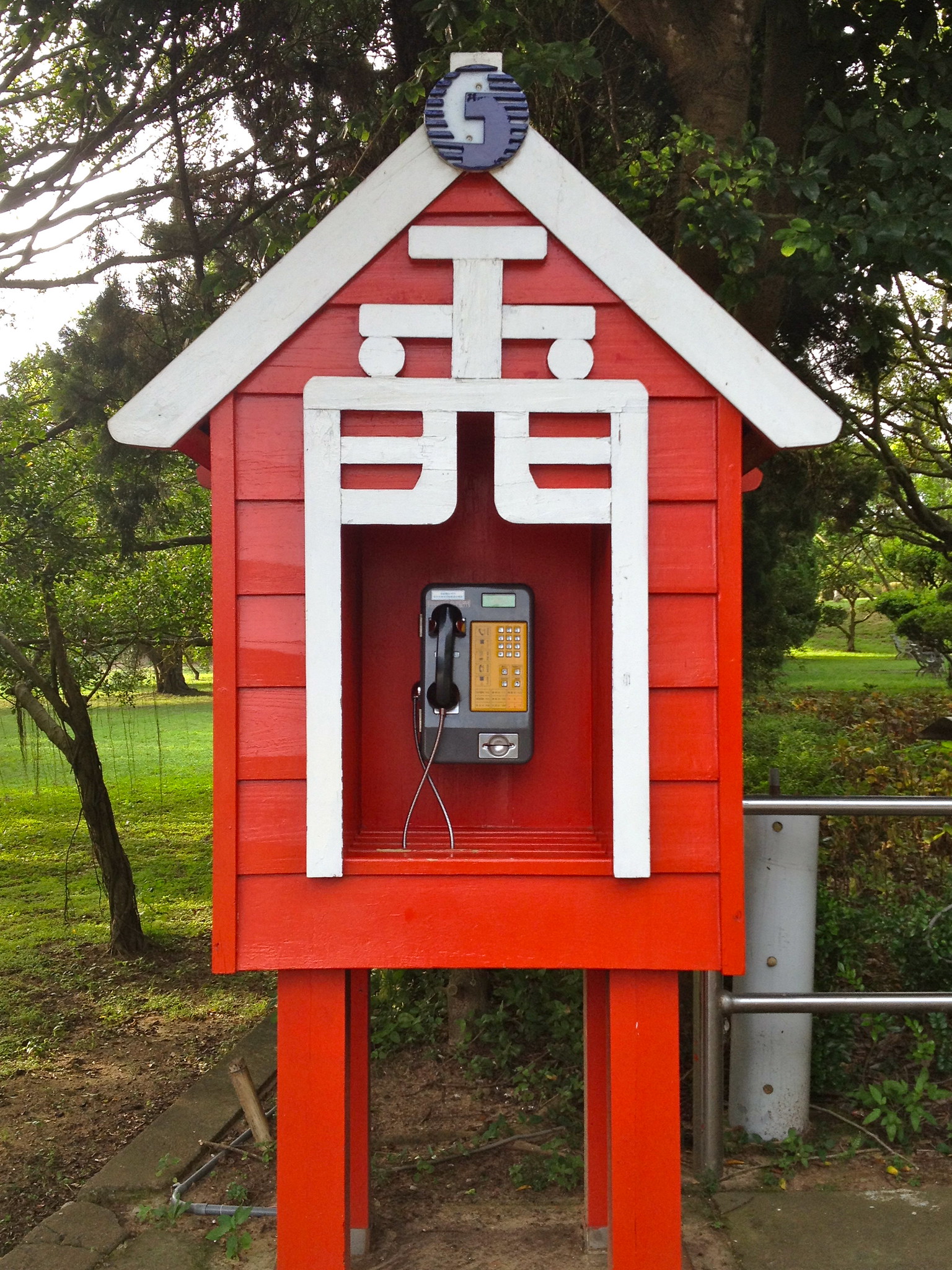
Anyway, as I've mentioned several times but haven't yet posted, over the summer Brendan and I went to Jinmen (Kinmen, Quemoy, whatever) just before I left for yet another trip to the US for yet another family issue (this one less serious). I decided I'd better post about it before I forget all of the particulars!
Two notable things about flying to Jinmen from Taipei: the first is that you pass right over Penghu, so you get a bird's eye few of Magong Island. It's quite something, and is a good reminder of how small Magong really is. Secondly, I didn't think anything of it when I took a few photos of the Central Mountain Range of Taiwan from the airplane as we flew down the coast - only to find it's actually illegal, at least according to Taiwanese law, to take photos of Taiwan from airplanes! Obviously it's a national defense thing, I just hadn't heard of such a law before.
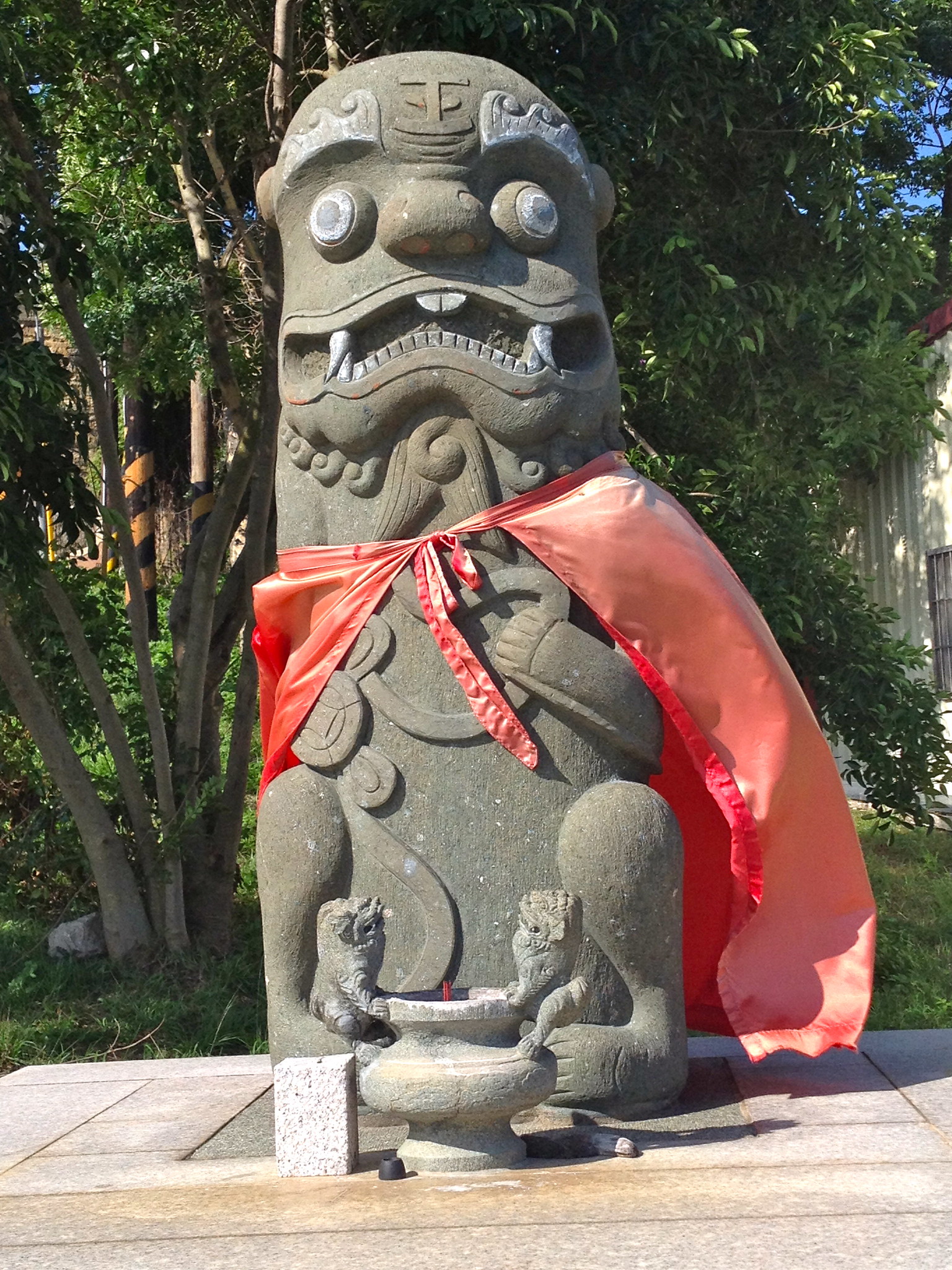
We stayed at ㄚ樂的家, a small "foreign style house" (洋樓) a short drive from Jincheng city - you definitely need to rent a car on Jinmen, though buses do exist - to stay here a car is crucial as it's down several country roads at a tiny hamlet on the waterfront. Worth it!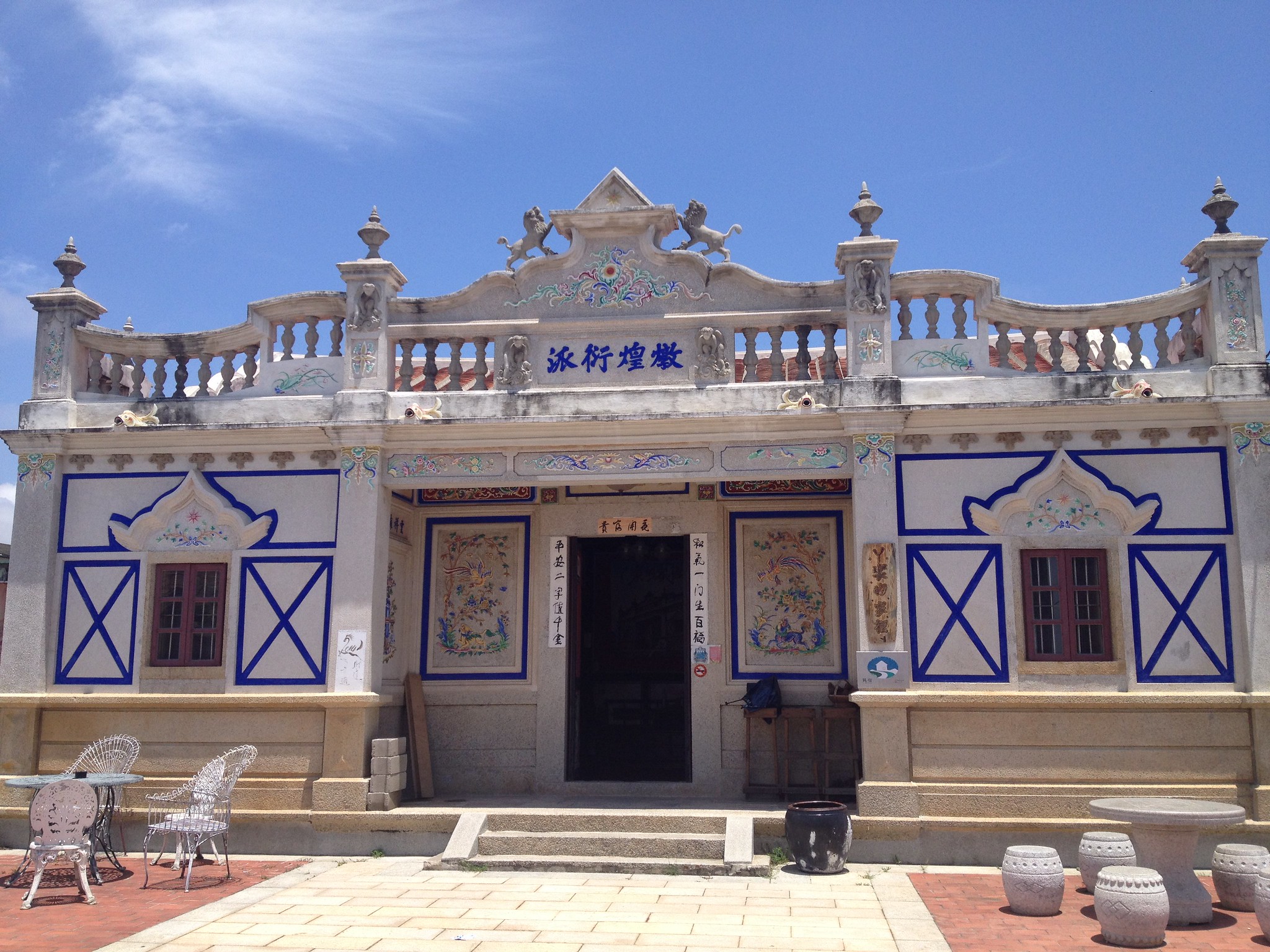
The inside is also preserved in a traditional look, and there is a kitchen and dining area for your use (breakfast is provided - generous portions and very local-style).
A couple of things struck me about Jinmen - not just the sheer number of old houses and traditional architecture, but also the number of abandoned buildings, most of them old, some of them not. Some of these were foreign-style houses, others were more traditionally Chinese buildings, still others seemed to be from the 20th century.
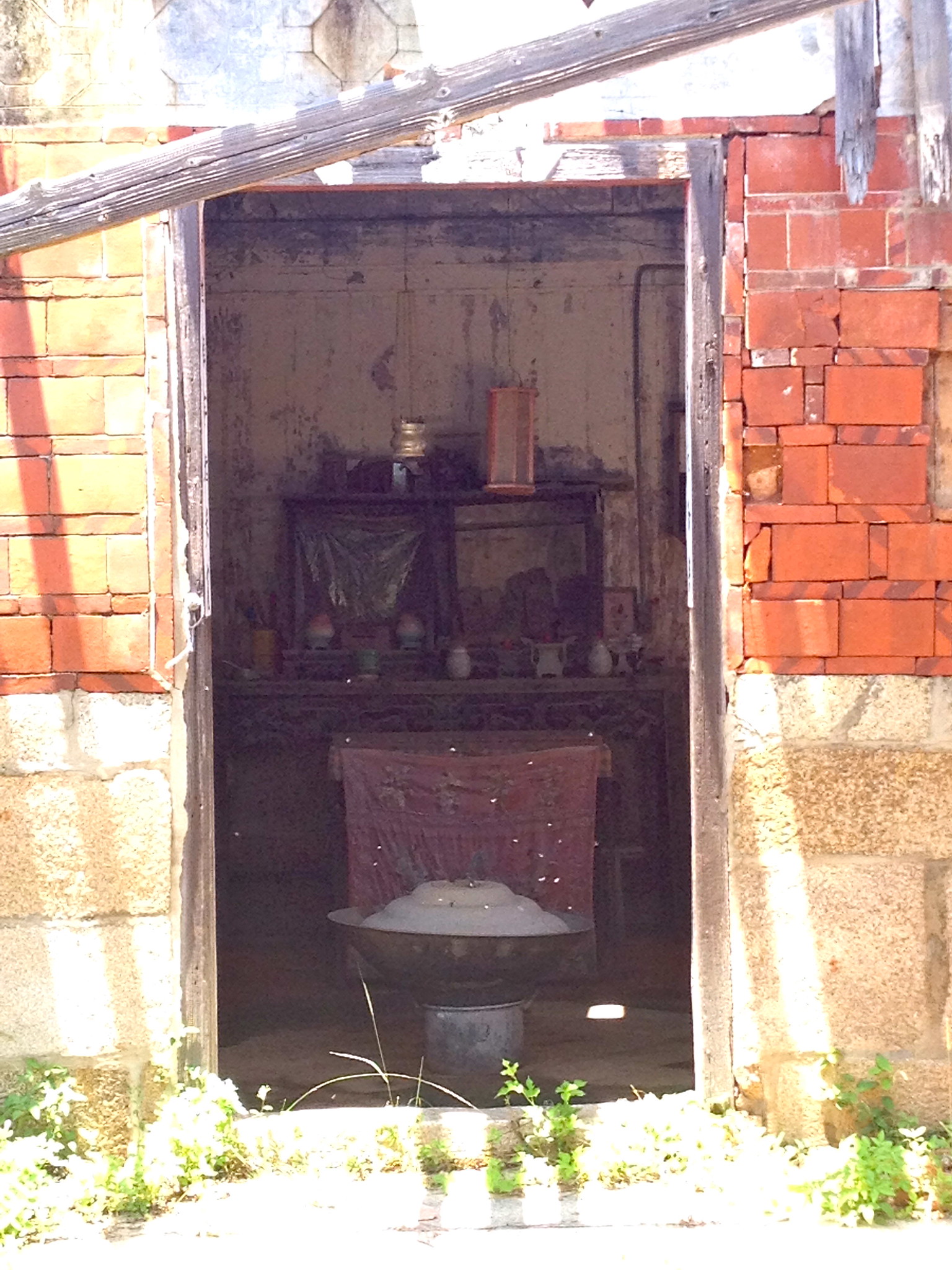
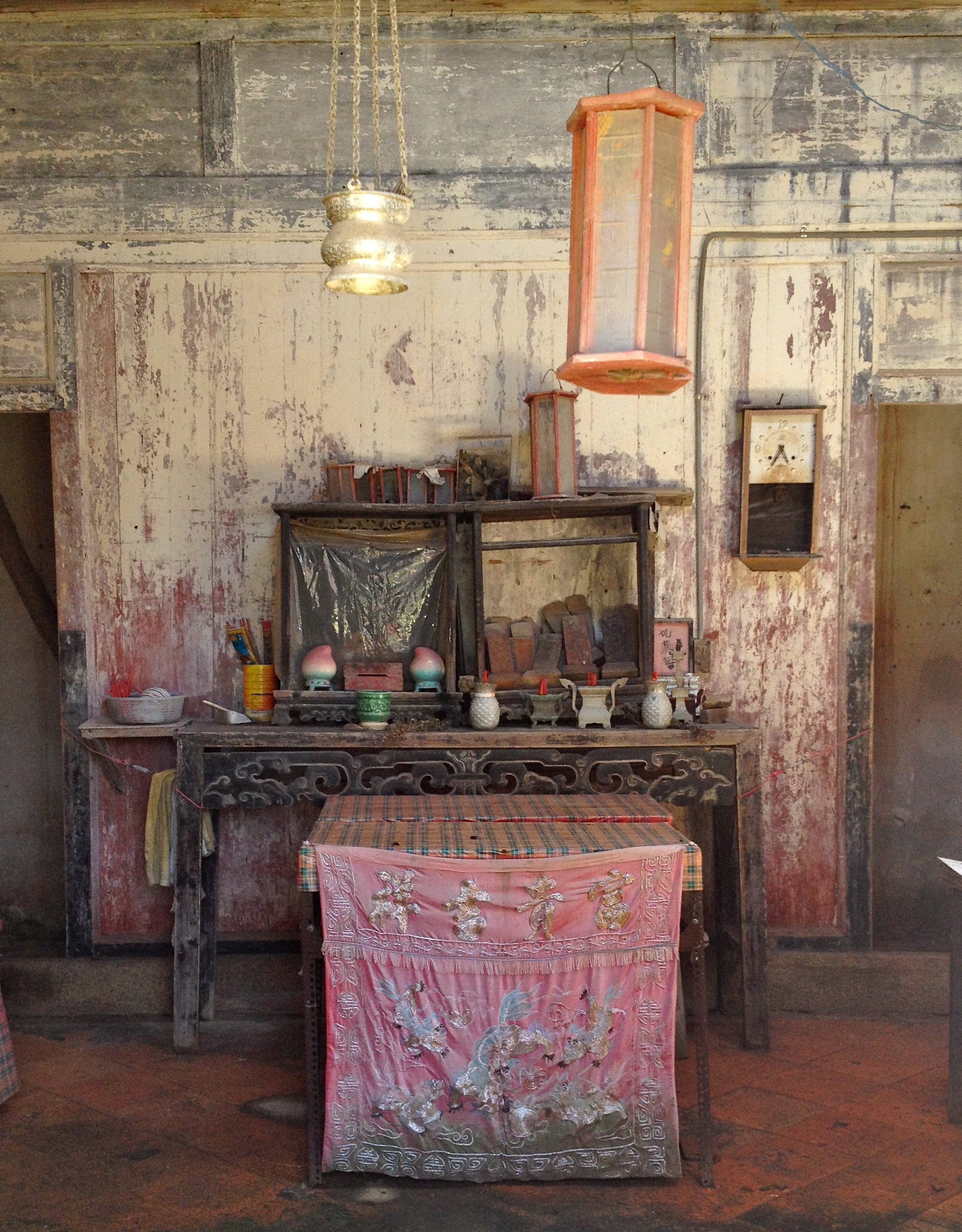
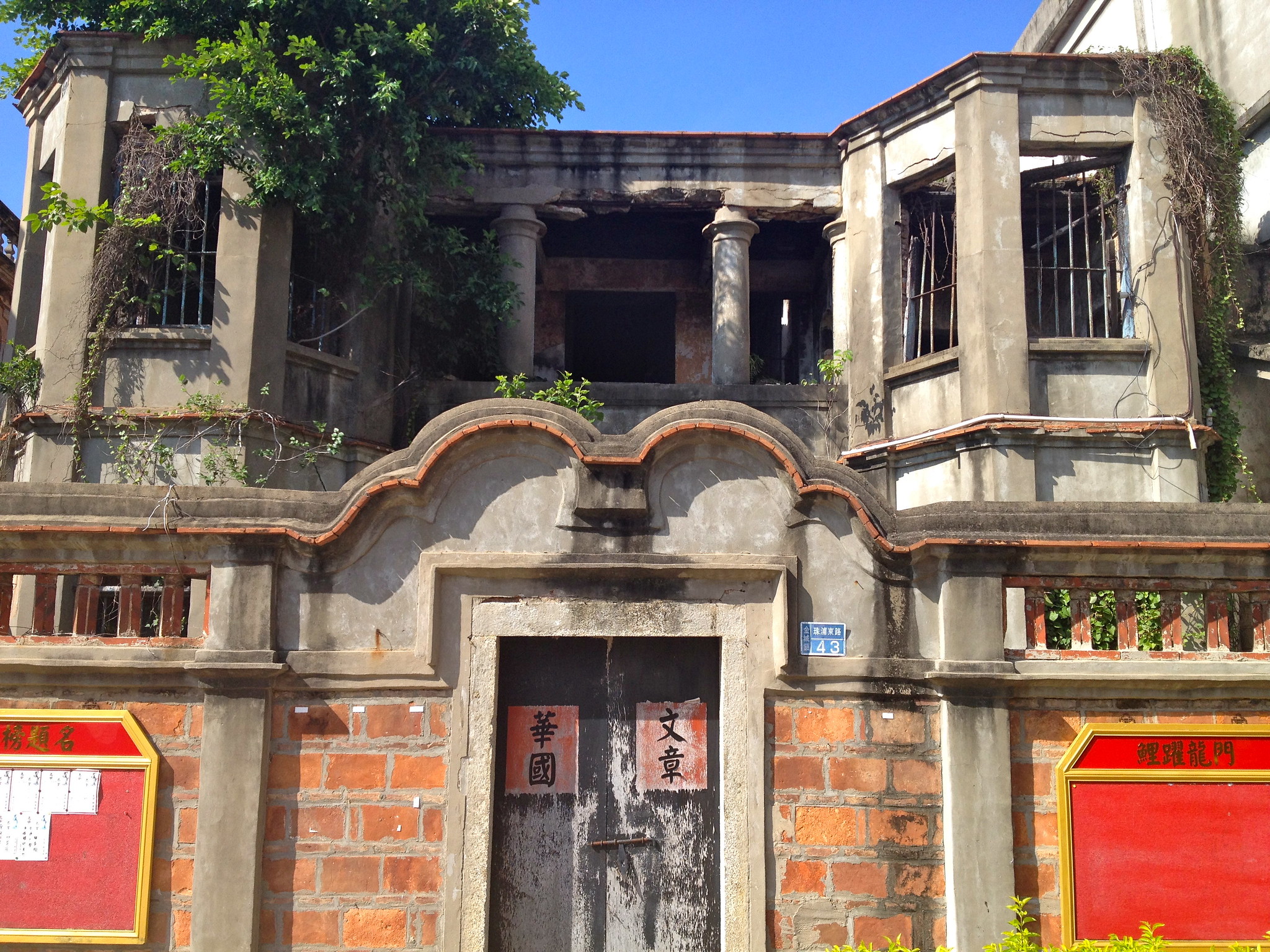
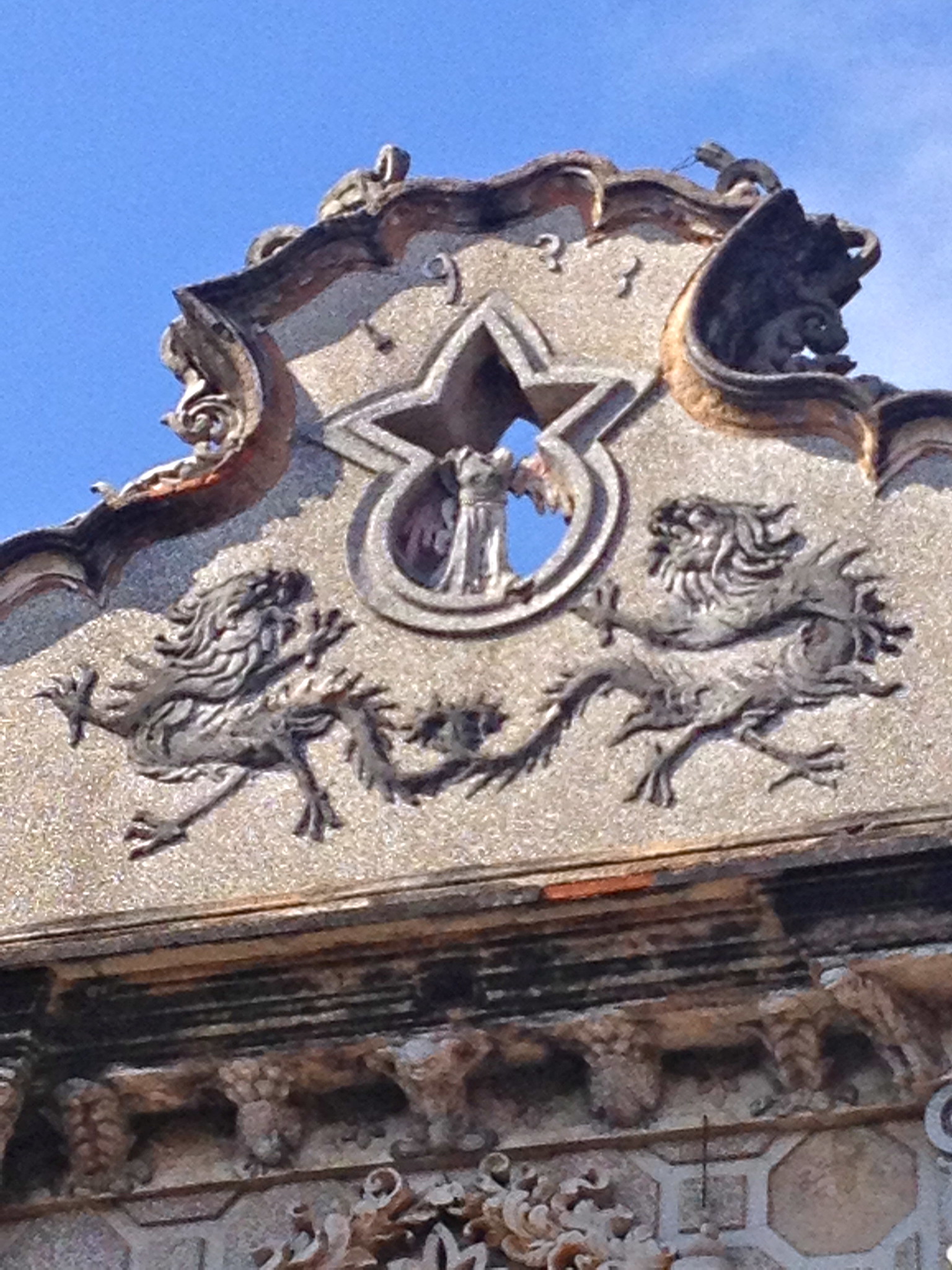
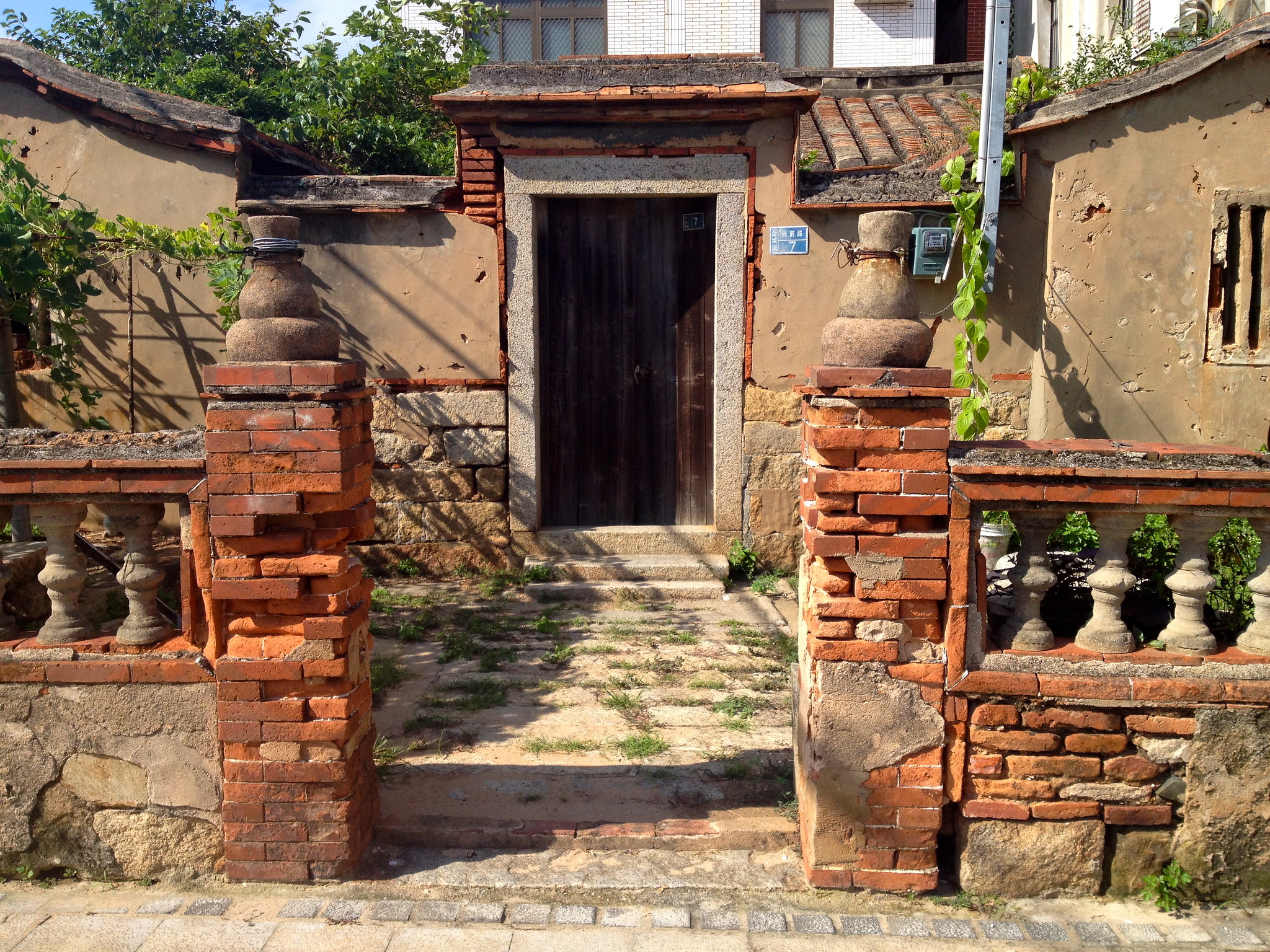
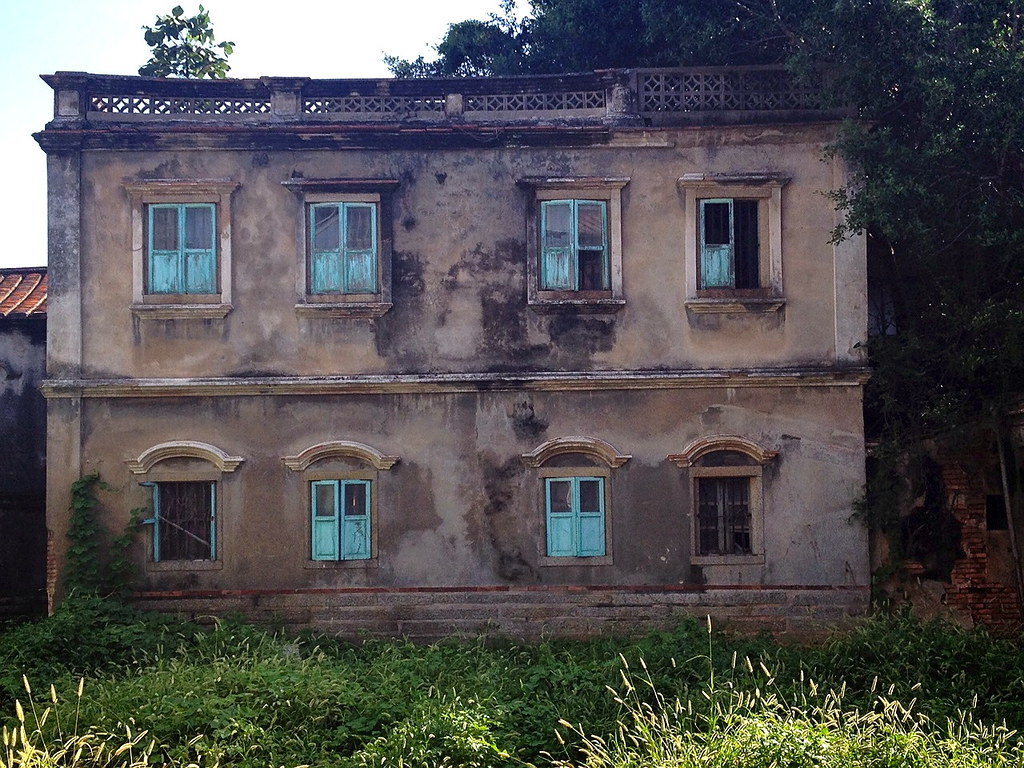
Second, how many buildings still in use retained their traditional flavor:
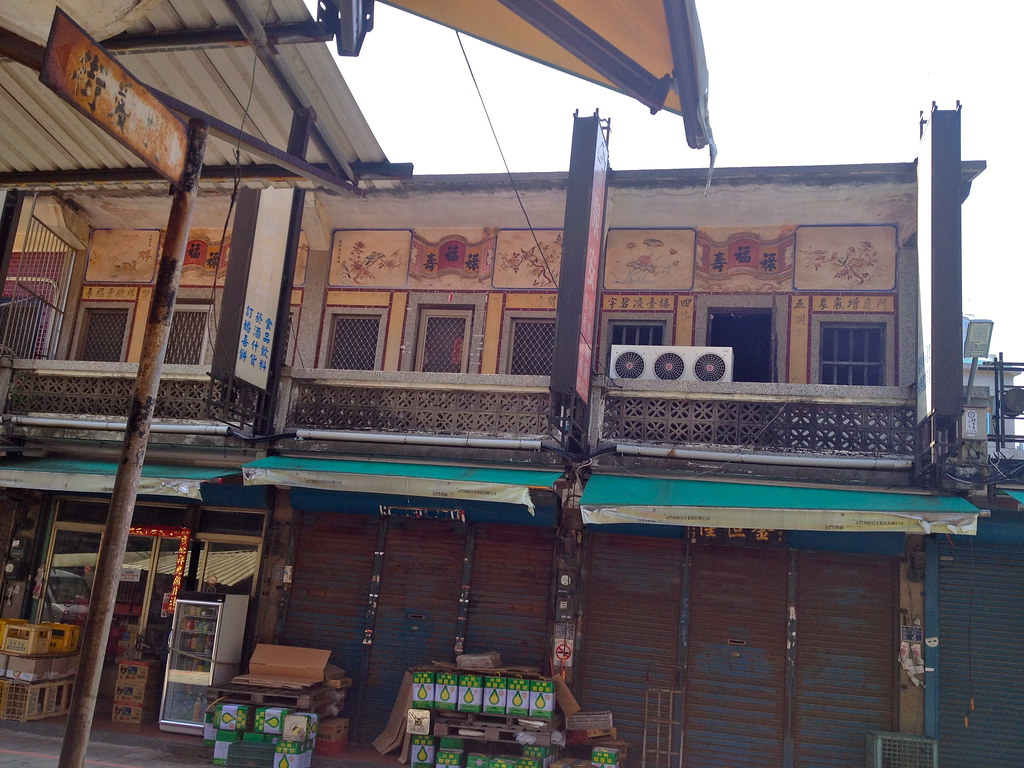
Third, the extent to which a lot of iconography - old, but also at times new - conflates the KMT with the Republic of China, in a way you just don't often see in Taiwan proper these days (I'm not sure I've ever seen it).
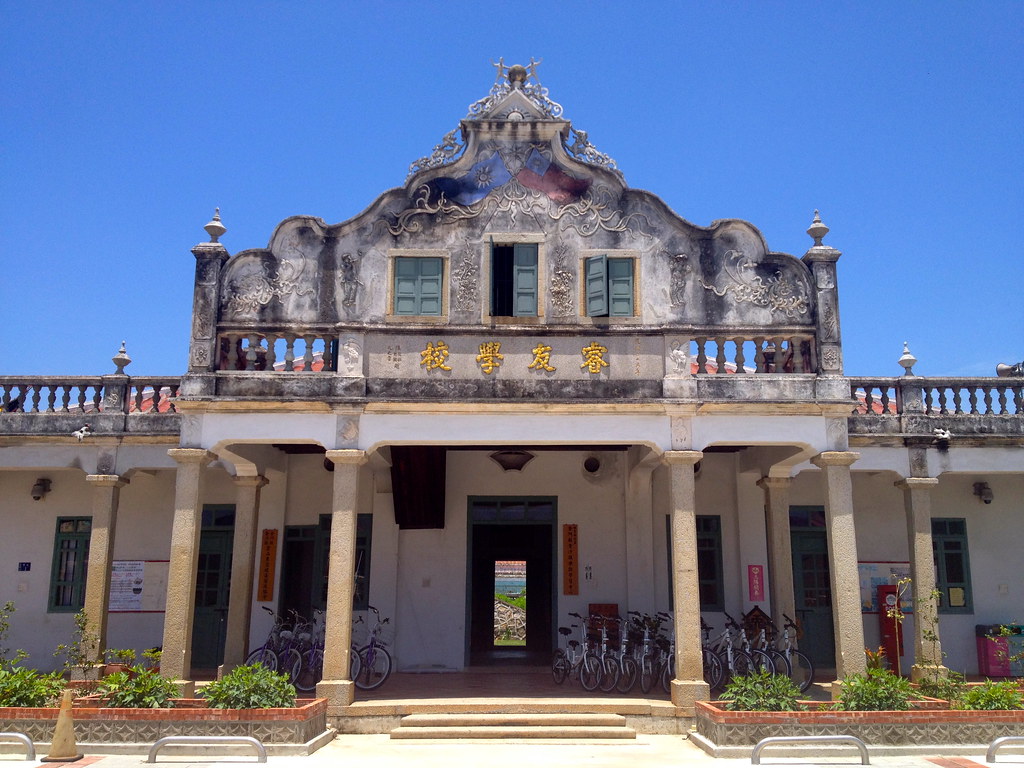
Rui You School (not functional as far as I know) on the eastern side of the island
Check out the top of that building's arch - it's hard to see in the photo, but it's a KMT flag crossed with an ROC flag. Not something I can recall seeing in on the Taiwan mainland, although I am sure it must have at one time been quite common.
On our first day in Jinmen, we took a nap (our flight left at some crazy early time) before driving first into Jincheng city and then over to Shuitou as the sun set. I won't bore you with too many details, as Jinmen is a well-documented destination, and I primarily want to show off photos! We walked down Mofan Street, passed the maternal chastity arch, and checked out the Qing dynasty military headquarters before heading a bit downwind to the Kui pavilion - interesting in its own right but we had more fun wandering the narrow alleys and warrens between mostly abandoned buildings, which were alive with lots of scurrying cats - some well-fed, others not so much.
One quick thing worth noting before we get into photos - the Qing military headquarters' side rooms are used for storage for much of the year, leading to peeks in windows that reveal scenes such as this:

AAAAAHHHHH!
I was so intrigued by this creepy room of bridal mannequins in retro dresses that I went to some effort to ask about it - not really sure how Qing dynasty military operations and mid-century Western brides were related. Turns out they're not, this room is just given over to a local business for storage.
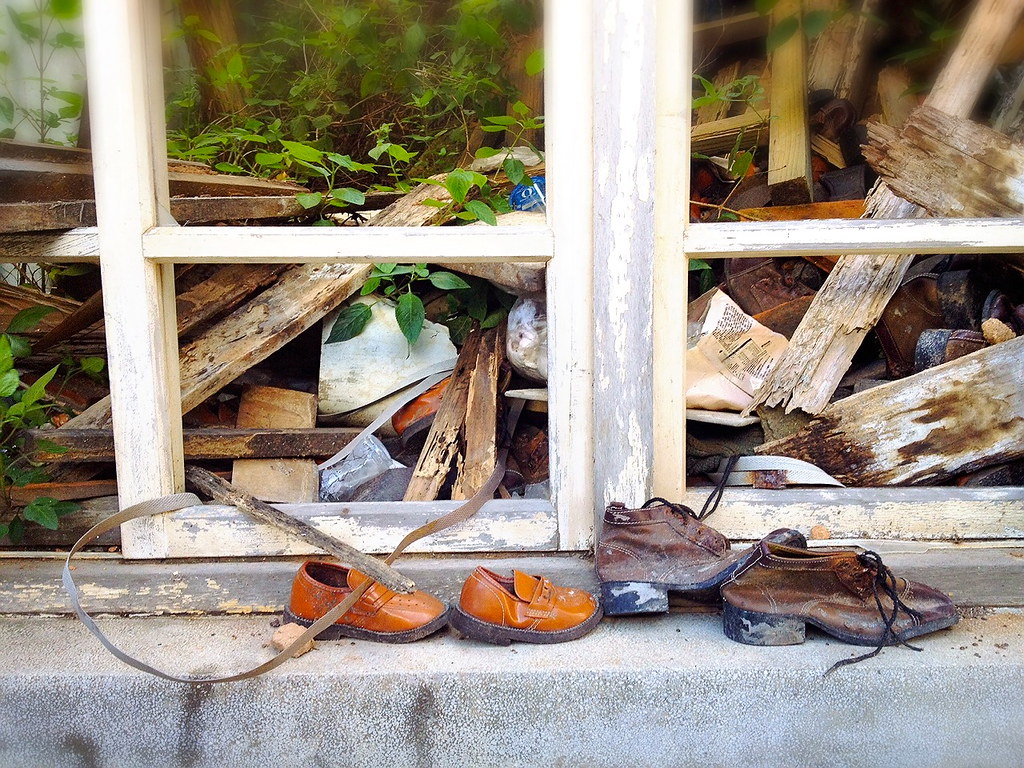
Ruined buildings around Kui pavilion
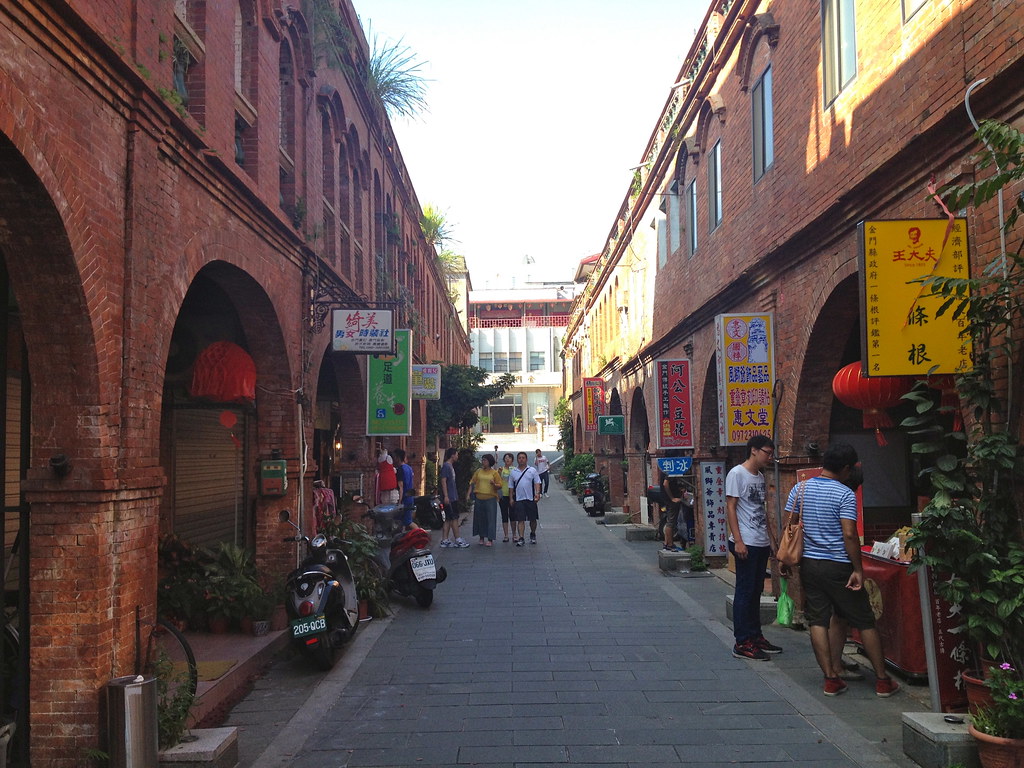
Mofan street - nice to walk down but not a lot going on
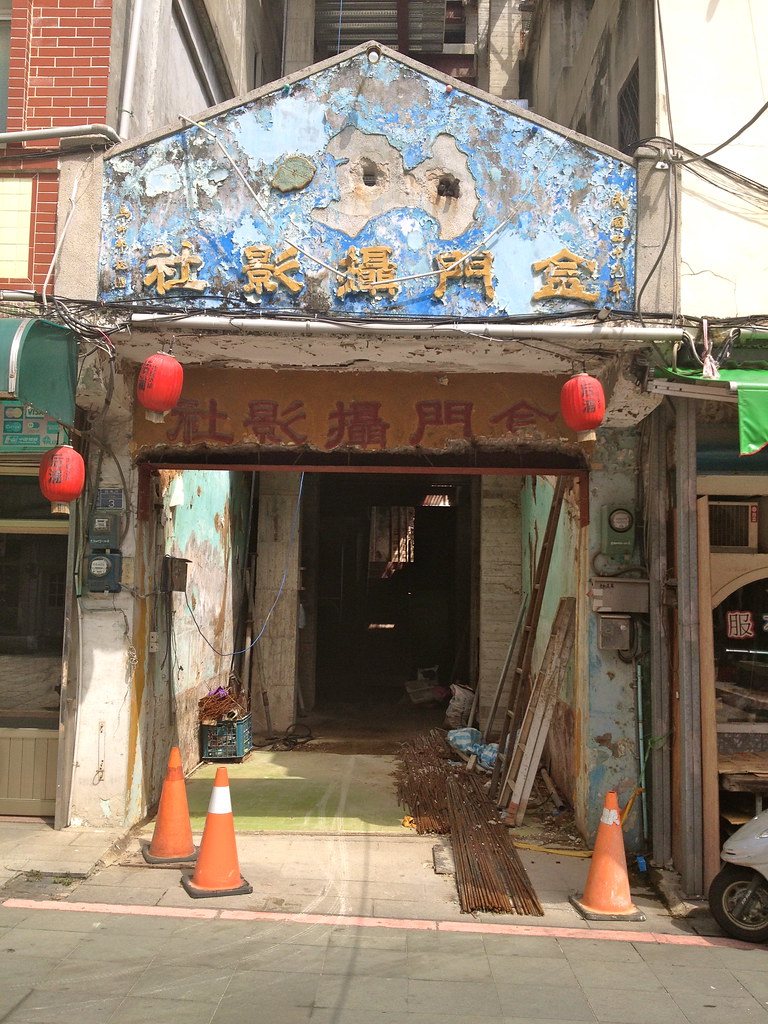
Another interesting old building near the Qing military headquarters
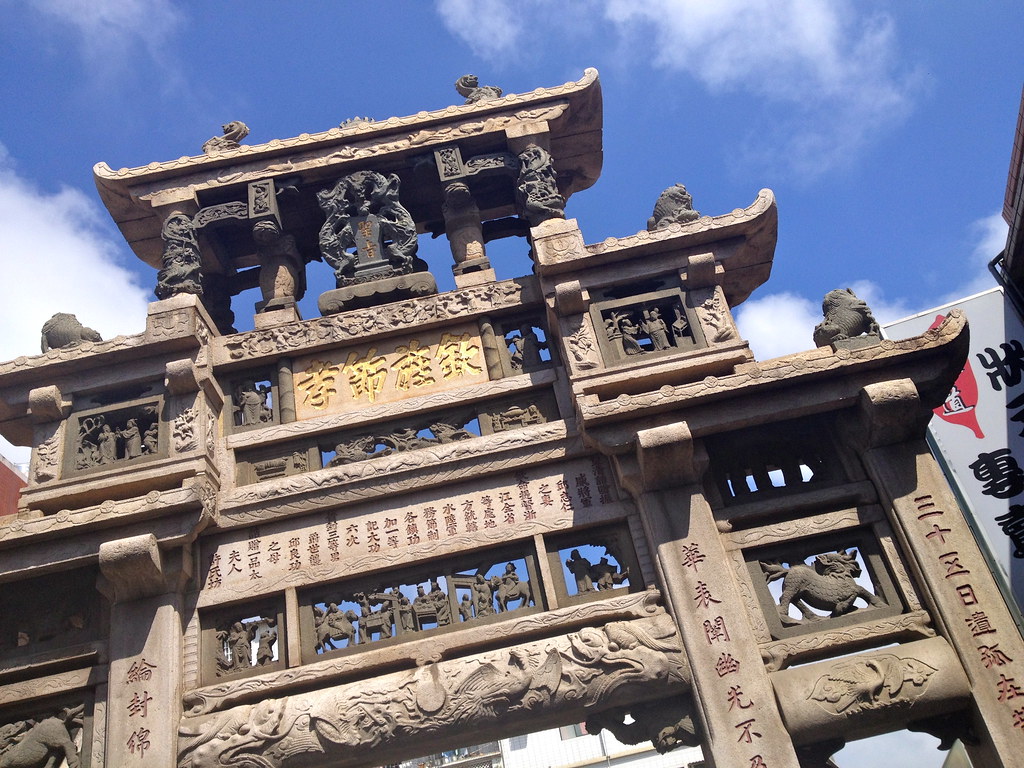
The largest surviving memorial arch in Taiwan (Qiu Liang-gong's maternal chastity arch)
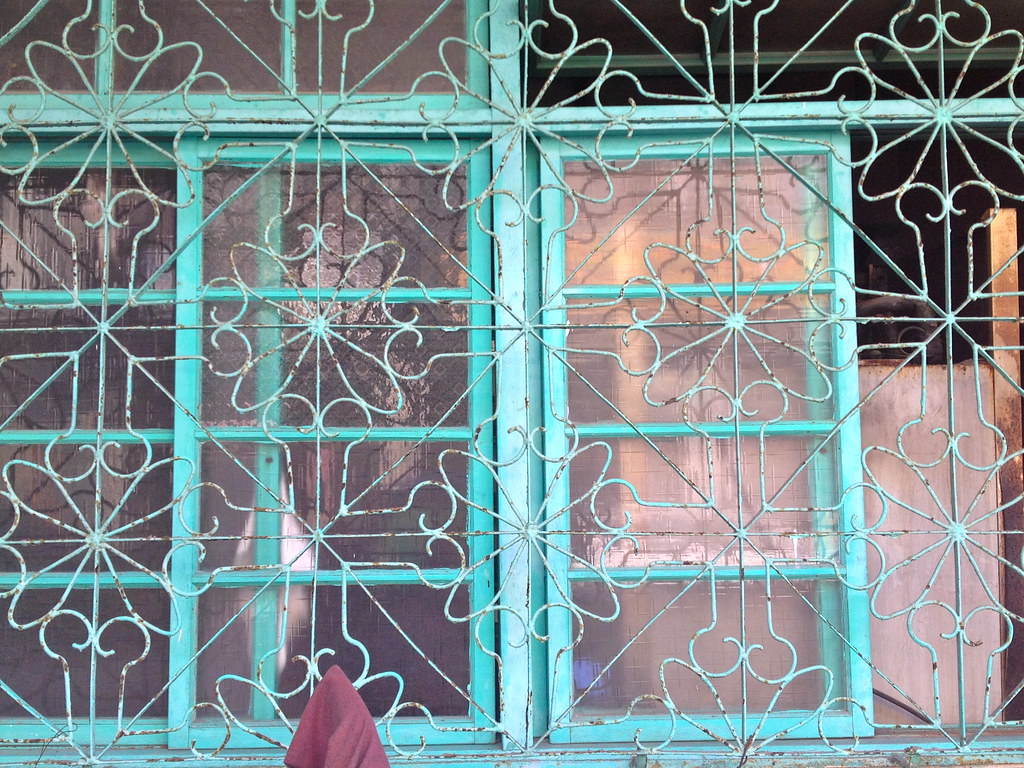
Just a pretty window casement
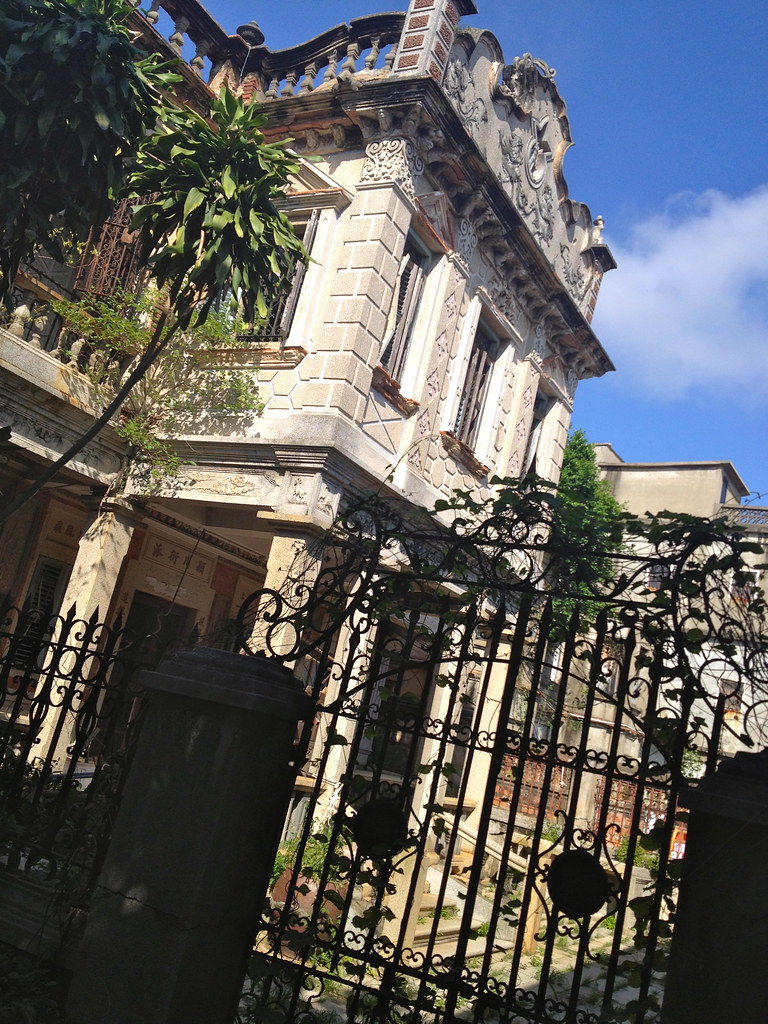
Creepy, cool Frankensteiny abandoned "Western style house" near Kui pavilion
By the way, the Rough Guide recommended oyster thin noodle place near the arch, and the scallion-oyster bun place just under it? Both excellent. Worth it, even though they're in a guidebook. On Minzu Road just near the turn-off to the memorial arch are a few shaved ice places. The one we went to was also excellent, and I have it on good authority the others are too.
For those who need a place to relax, get some air conditioned cooling-off time or just have a decent cup of coffee, near the end of Mofan Street there are two cafes, and the one we went to was pretty good.
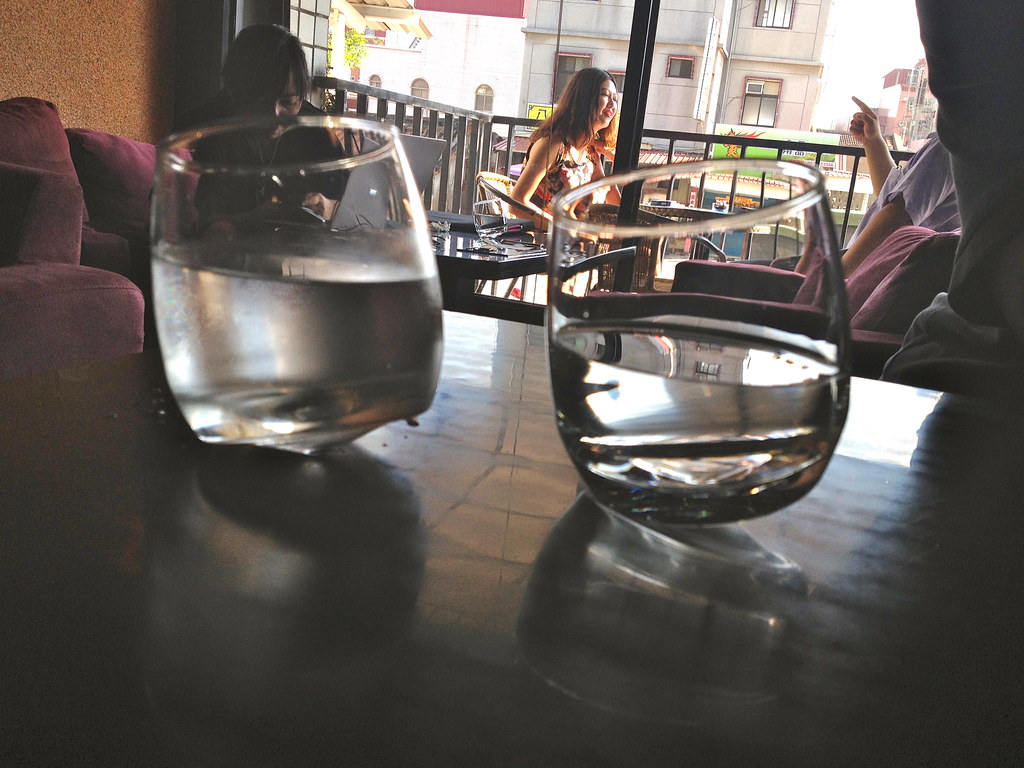
Special water glasses are designed to sit at an angle at this cafe, which also serves coffee grown in Taiwan among other things.
In Shuitou, which is very popular with tourists (and justifiably so), we wandered a bit until it got dark. There is a pretty good restaurant here that serves "Jinmen local food" at a set price per person - no menu, they just bring you a set number of dishes according to the size of your party. It's set in an old foreign-style house (just ask around). The inside looks like this:
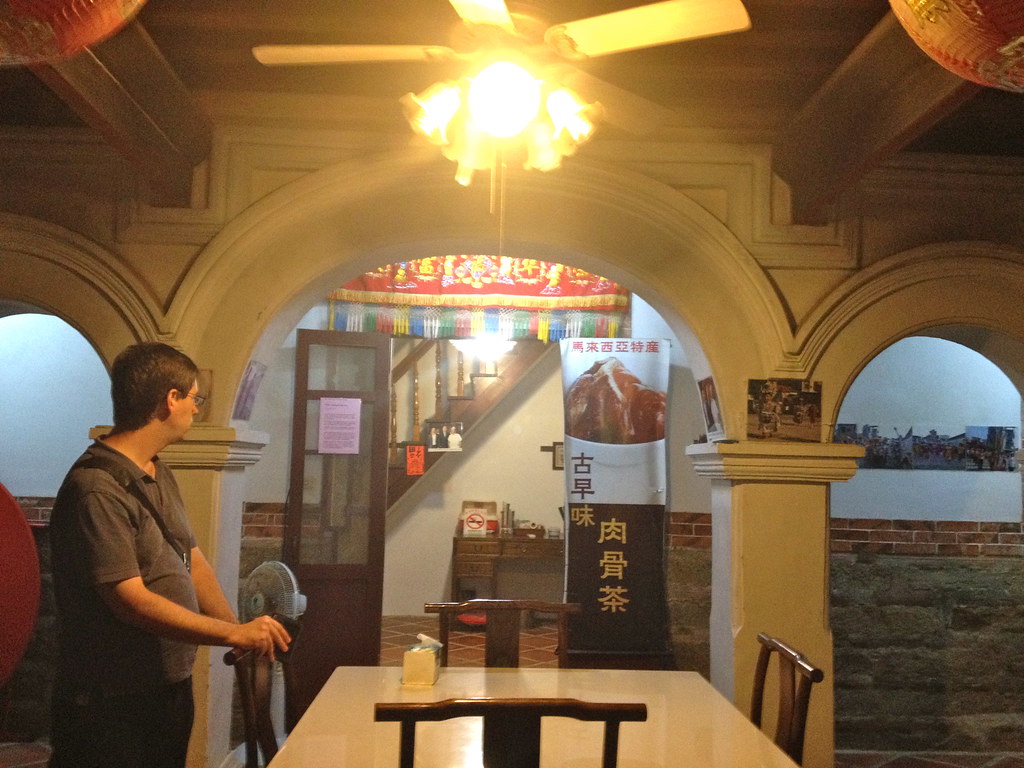
One of the more ostentatious old houses is also a cafe, which is worth a stop (just to get the chance to go in), and is open until 5pm. They don't have food per se, except cafe style snacks like waffles, which are okay but nothing to write home about. Chinese tour groups sometimes come here, which may account for the Mao signs.
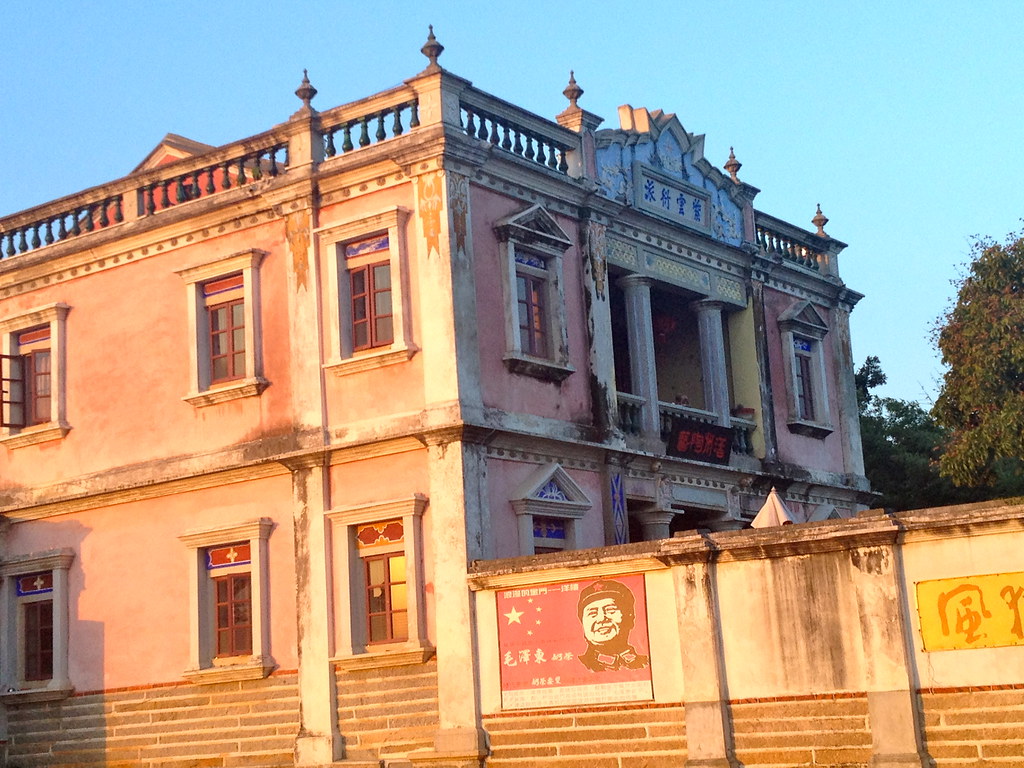
The next day, I realized that I had not seen any wind lion statues at all - and with wind lions being, well, THE famous thing from Jinmen (other than that historic battle, and Kaoliang liquor), so rather than hit sights in the guidebook, we just circled wind lions on a local map (they are all labeled) and took off driving to see how many we could find, with the idea that we'd see interesting stuff along the way. This is where the whole "chasing the wind lions" title comes from - we literally did that, basically for an entire day!
We drove out to the far east of the island, passing through Jinsha, Shamei, Shanwai and Shanhou. Here's the thing about posting in December about a trip you took over the summer, for which the map you'd used, on which you'd circled your various planned destinations, was so tattered by the end of the trip that you threw it out: we stopped in a whole bunch of interesting places not in any guidebook (well, not in our edition of Rough Guide anyhow), but I can't remember exactly where those places are.
I'll do my best - here are some of the wind lions we found, and things we saw along the way. First stop, Huishan Temple (會山寺), just off Huandao E. Road.
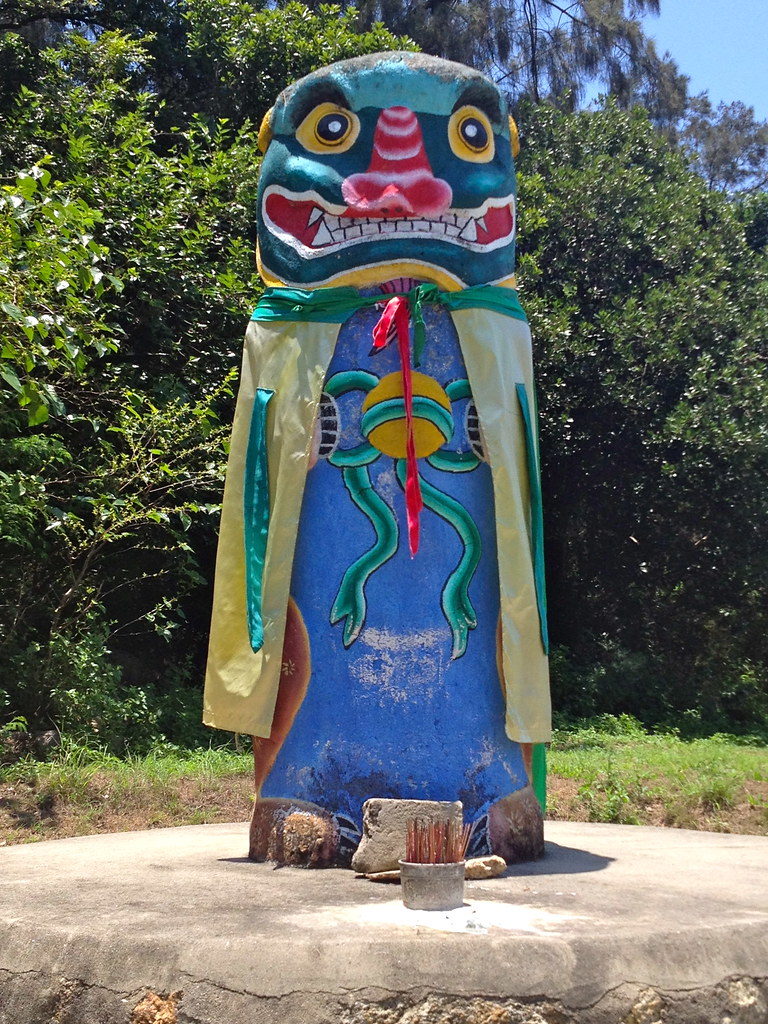
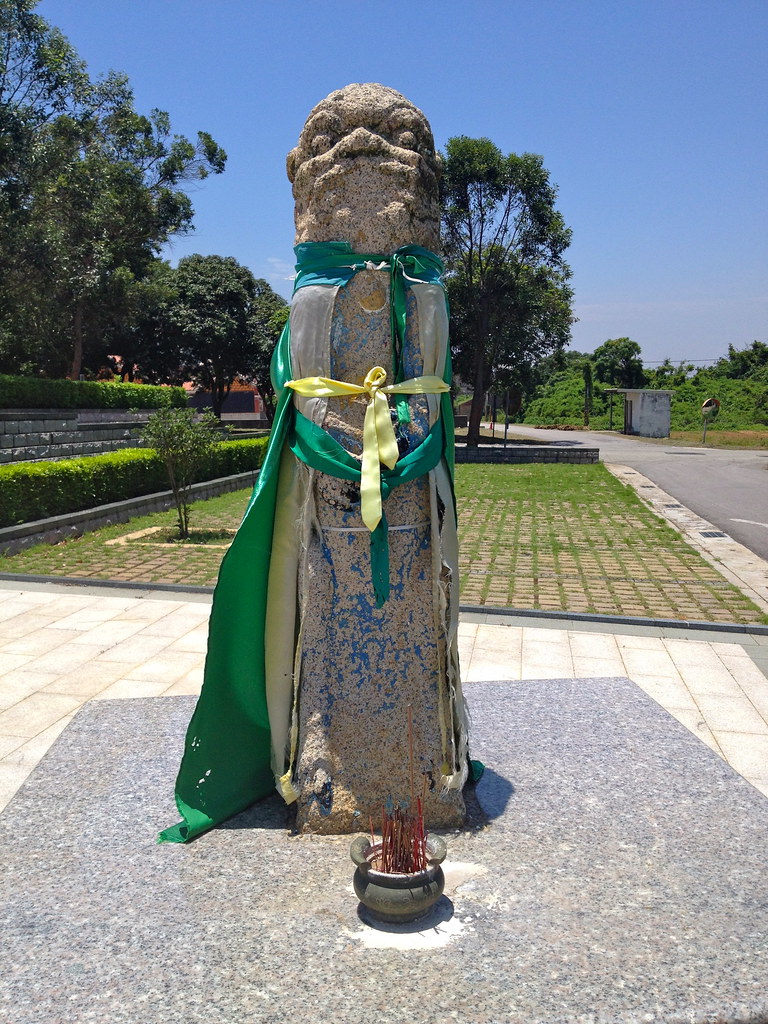
These two lions are a short walk behind (the former) and just out front (the latter) of the temple.
This is not the temple, this is an example of an old house in this area, which is well worth stopping and walking around in despite a few angry dogs, that is still very much in use and beautifully preserved.
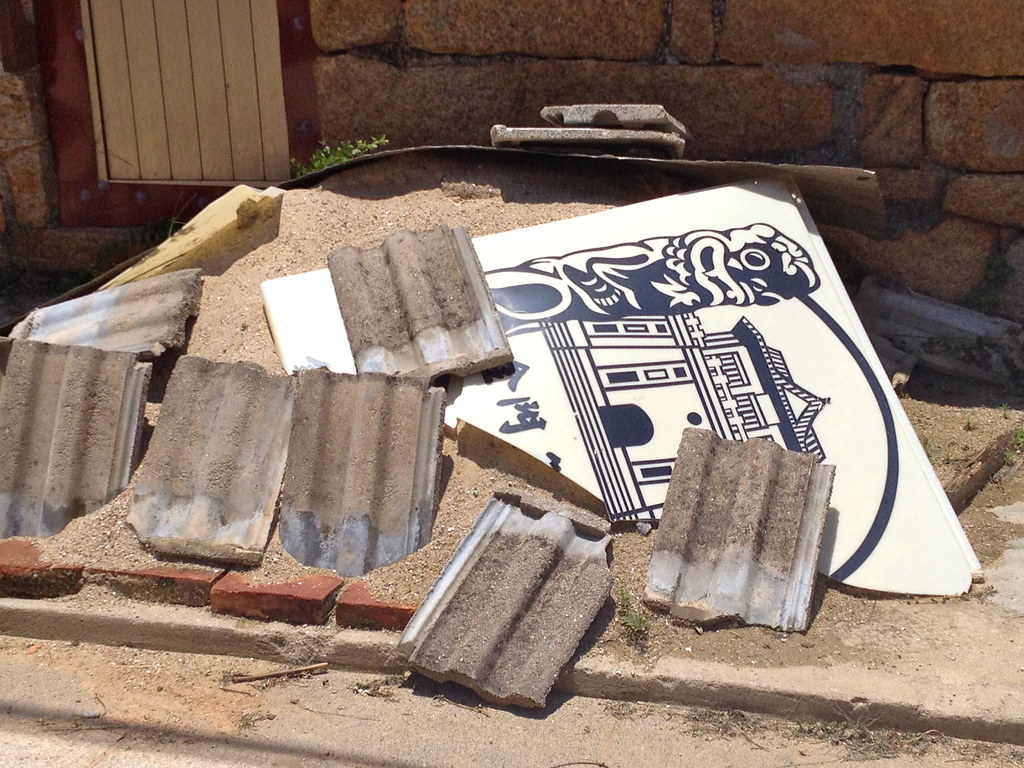
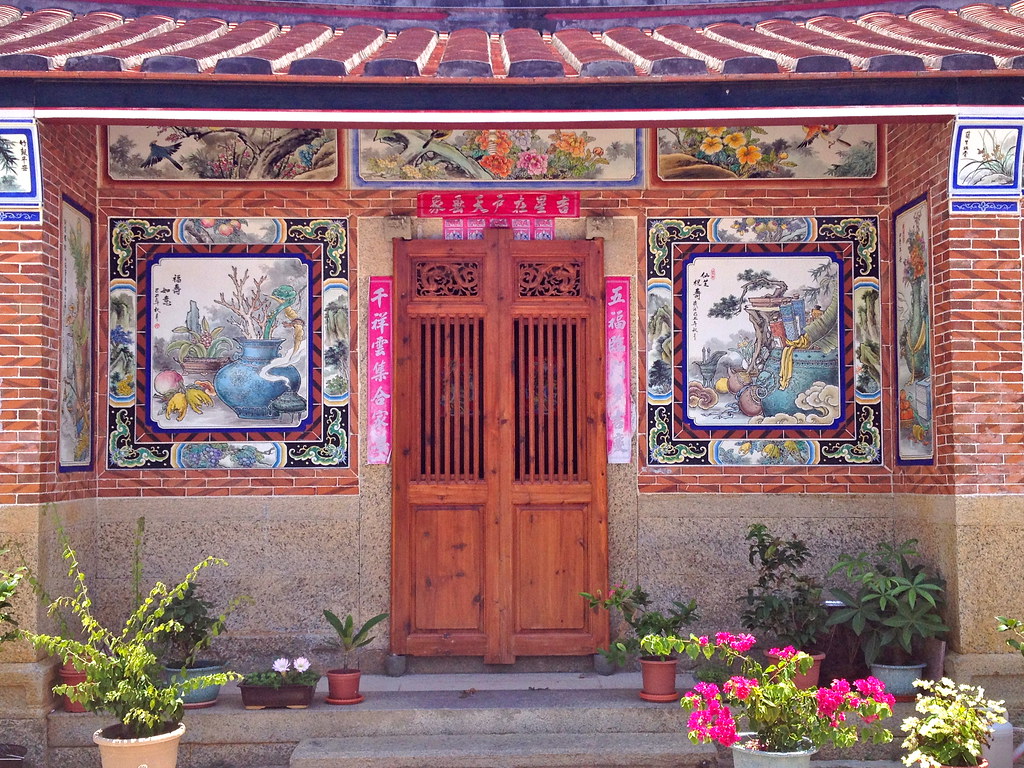
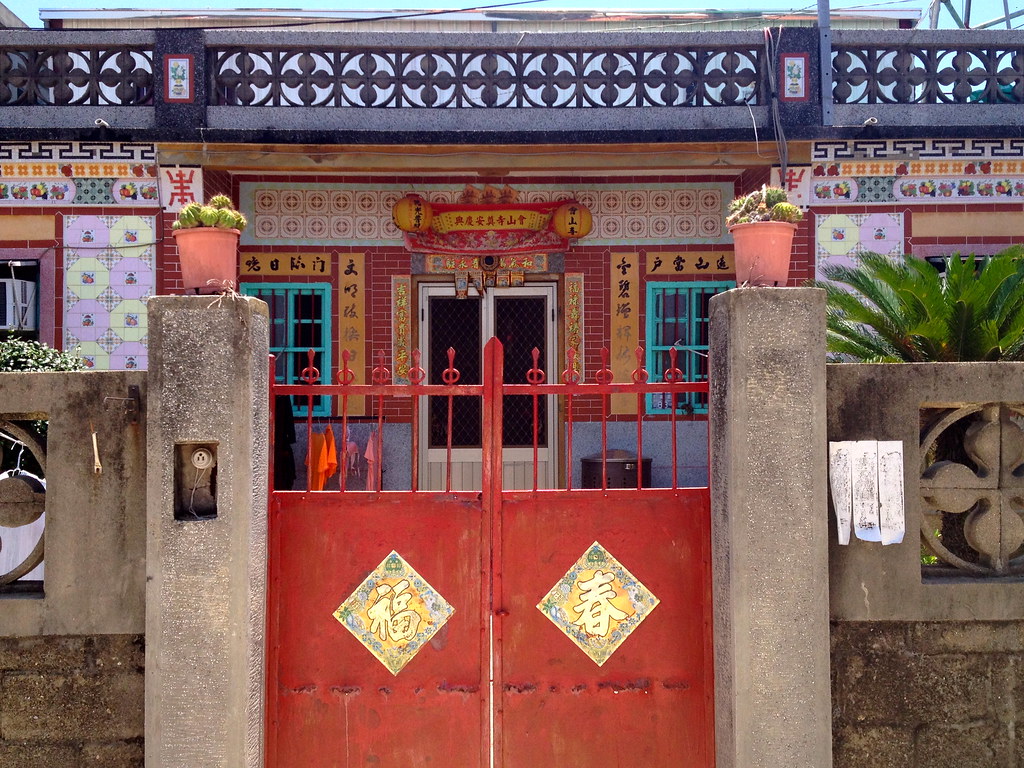
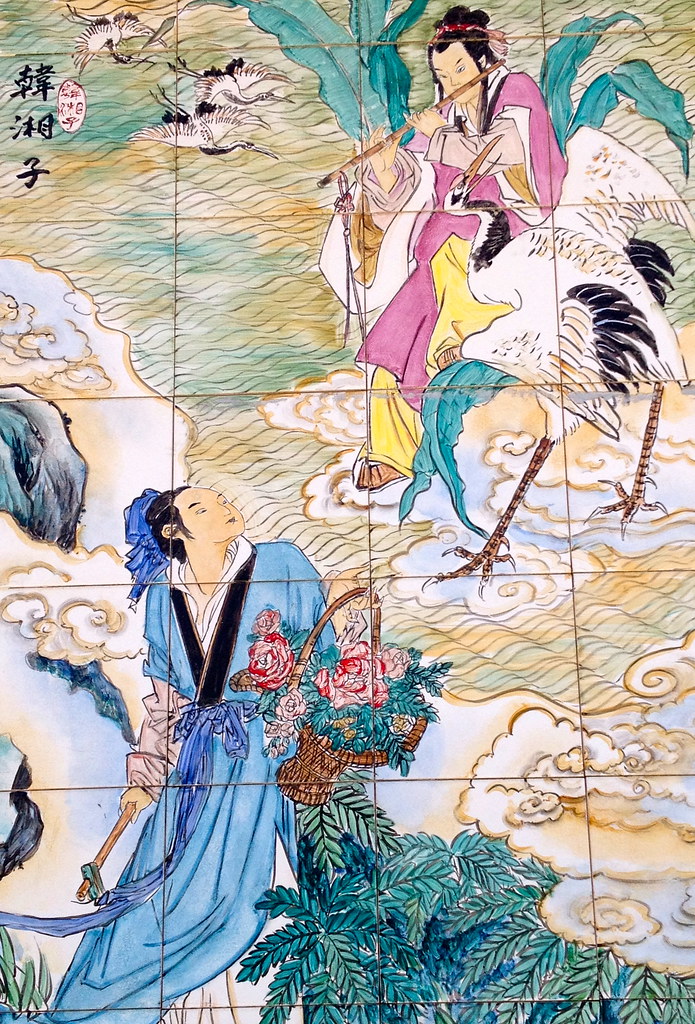
A short drive - also walking distance - from here is a small village, notable (and most easily found) for its old movie theater (closed), which was spruced up and used as the set for the movie Paradise in Service, which I have never seen (but would like to). You can wander in and out of the old shops, which are outfitted with period furniture and even products, at least insofar as they needed to be to function as a movie set. The whole thing is now maintained as a tourist attraction and is genuinely worth a stop, even if none of the old shopfronts are authentic (and I'm not sure they are).
There's a decent cafe here called 心情咖啡 that has good stuff and is a nice place to take a break.
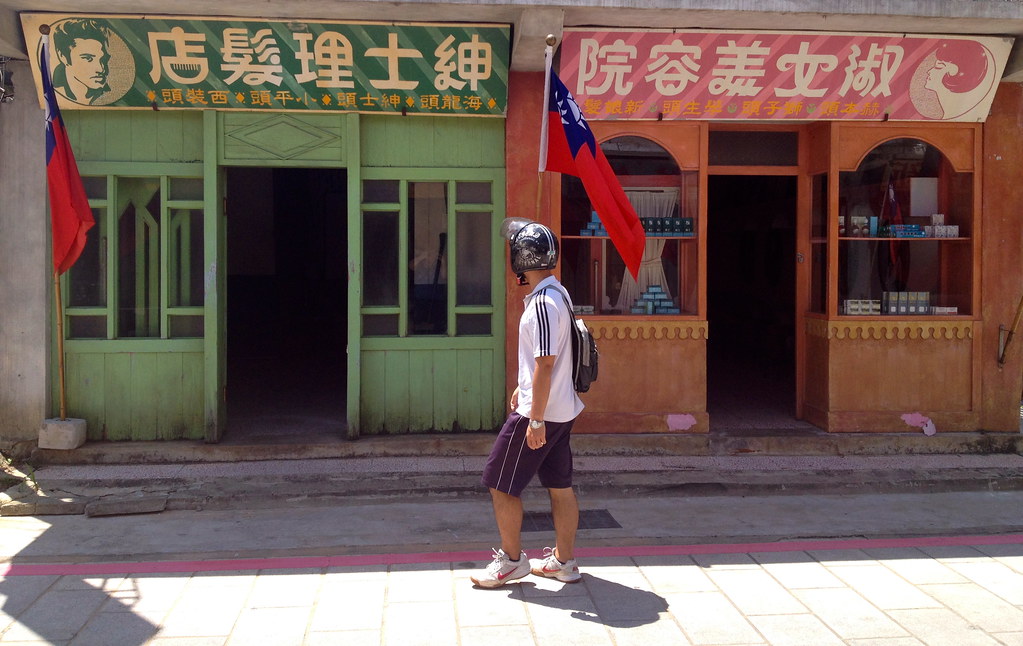
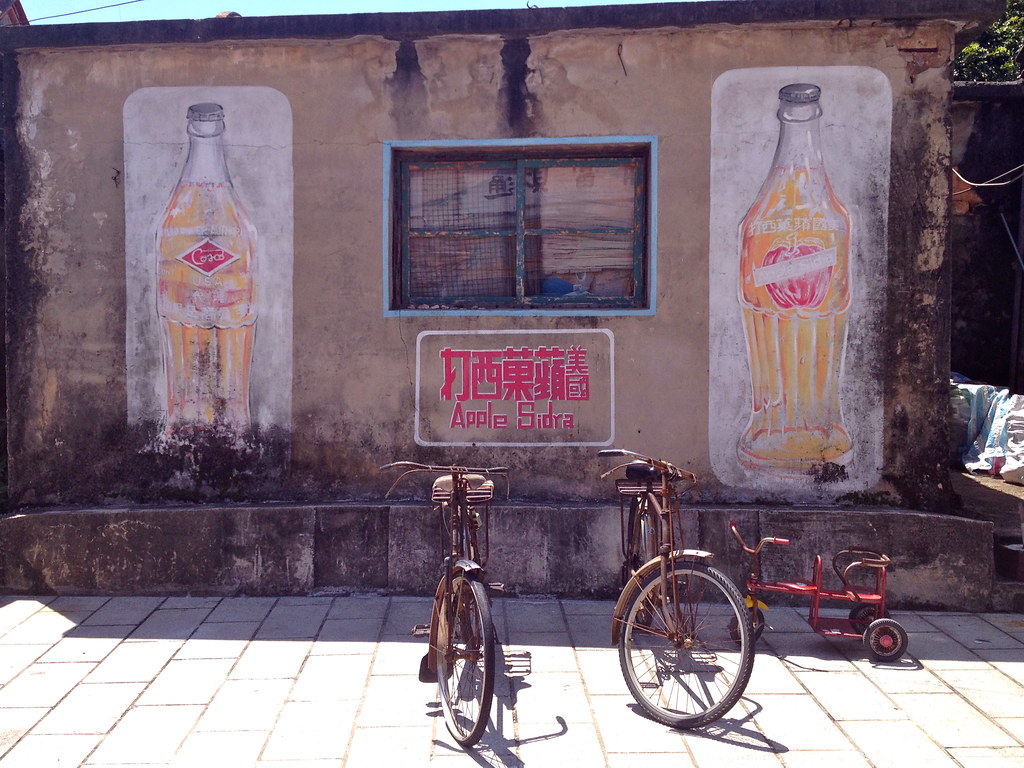
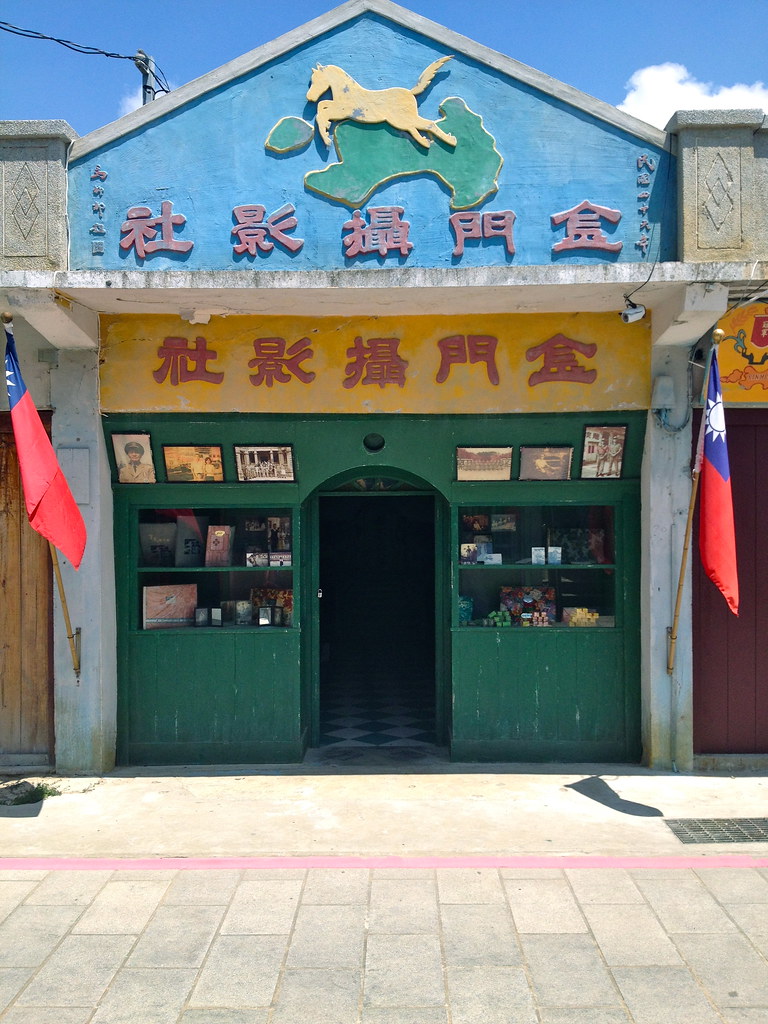
The old movie theater was almost certainly a part of the movie set, and features a few old-style hand-painted movie posters (which are probably too good quality to have just been the background for a movie shoot).
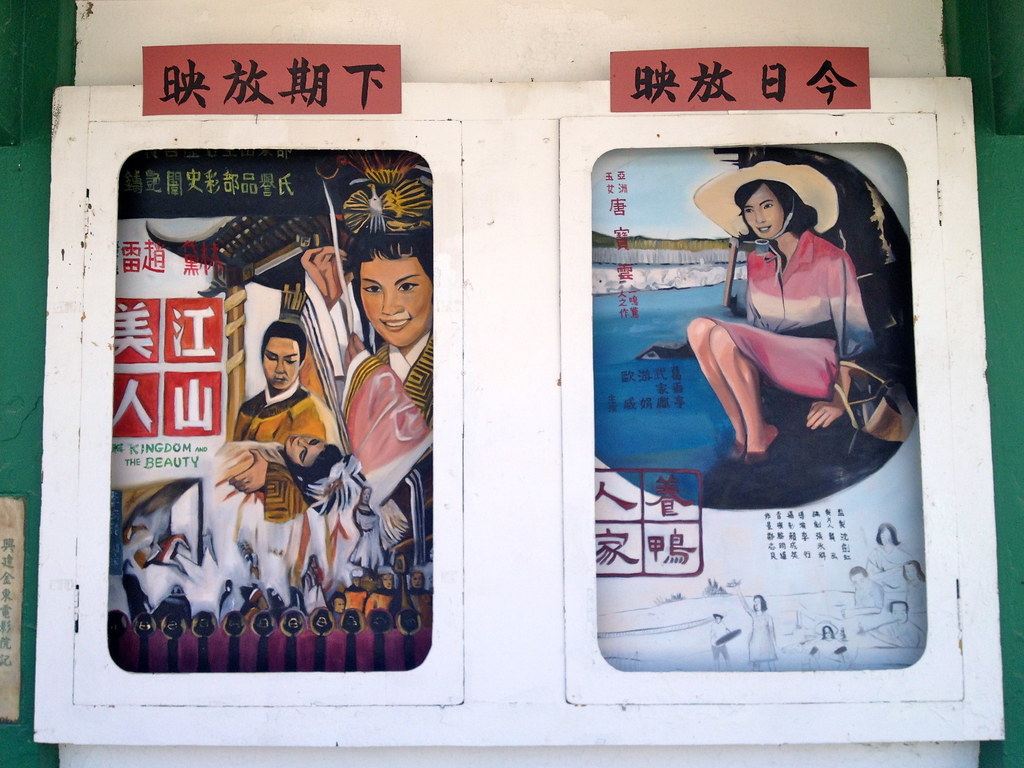
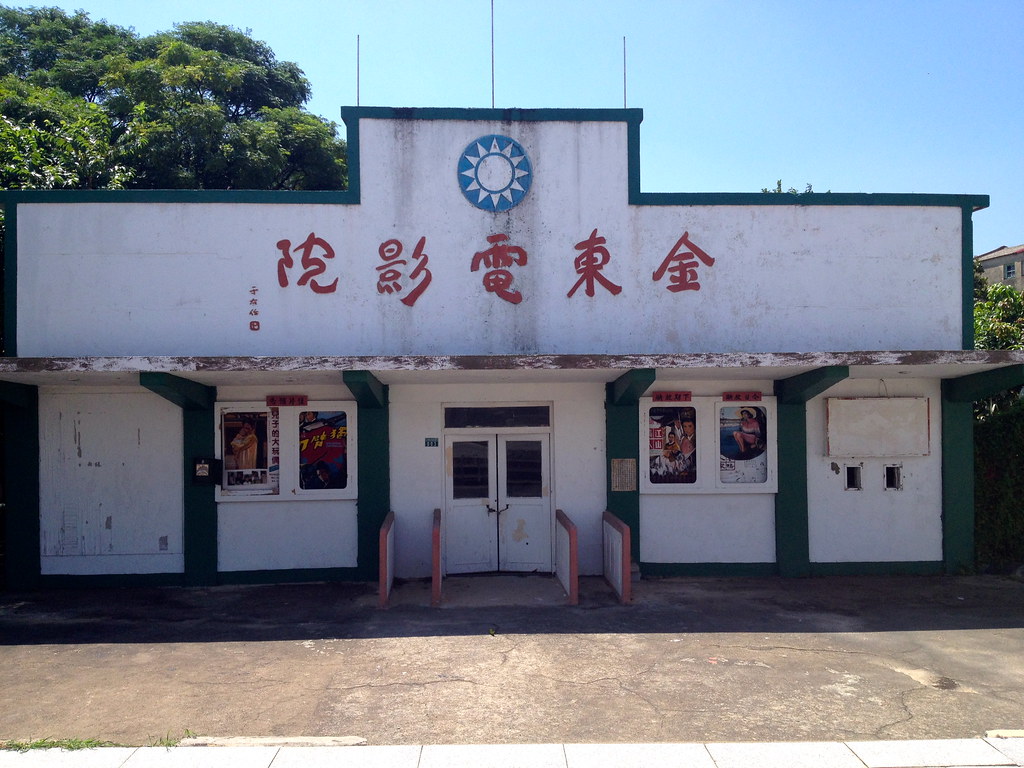
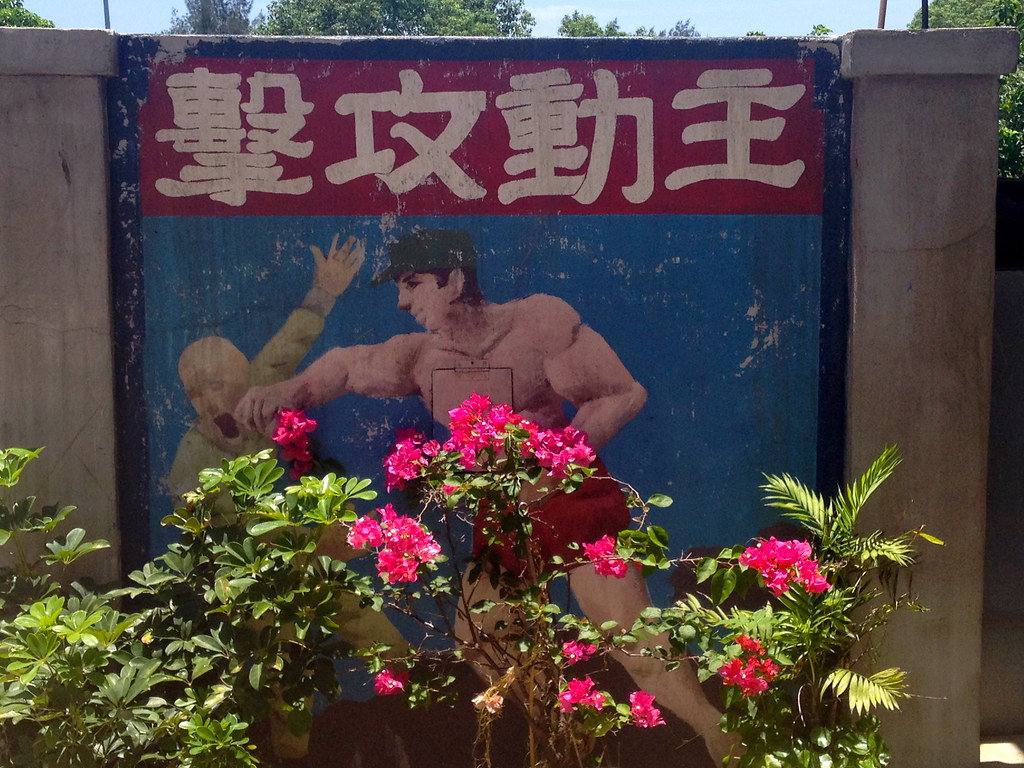
A big, muscled ROC soldier takes out a Voldemort-like Communist
A little further along Yangsha Road, where it meets Dashan Road, you'll come to another set of long-neglected foreign-style houses (at least one has a population of geese in its front yard) and the Rui You school, pictured near the top of this post. There are a few more wind lions around there (I think I've got the correct wind lions matched to their locations:
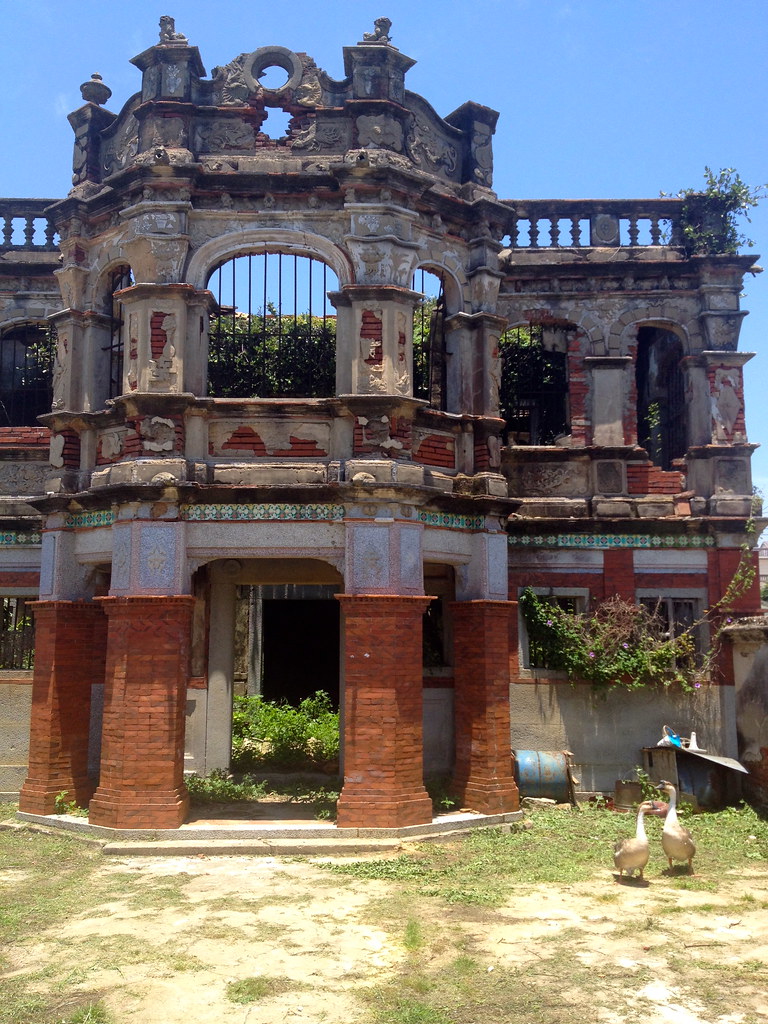
After the "Paradise in Service" movie set, I have to say, I was more intrigued by old-style buildings with old-style signs that are still in use, and not refurbished for a movie.
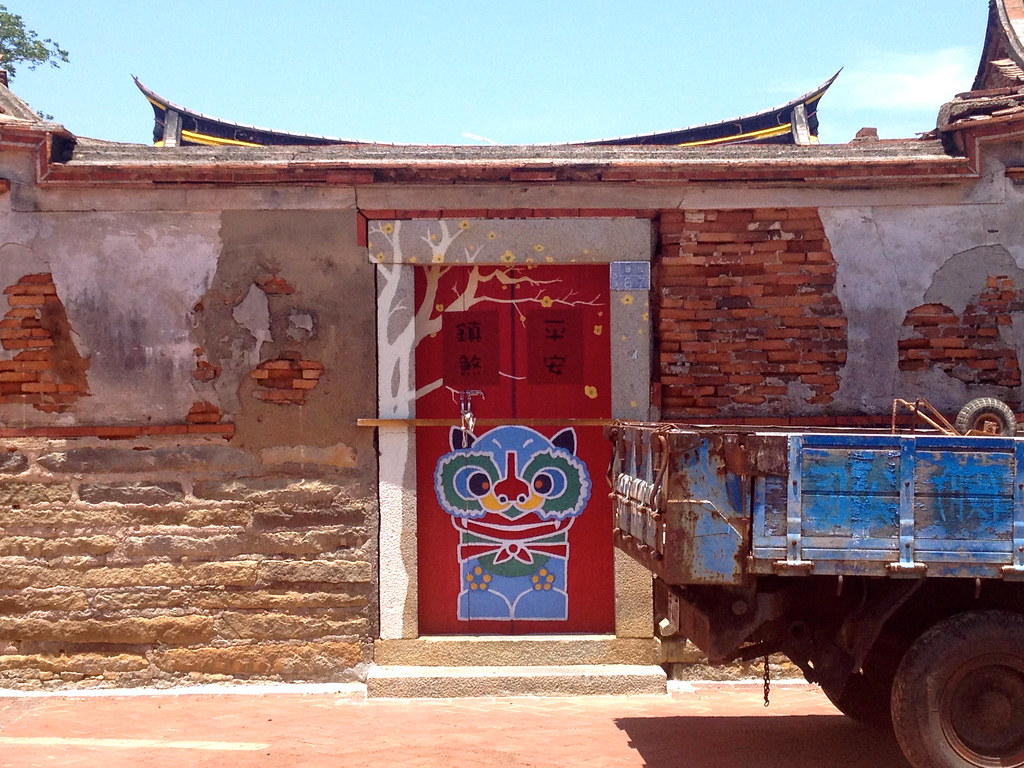
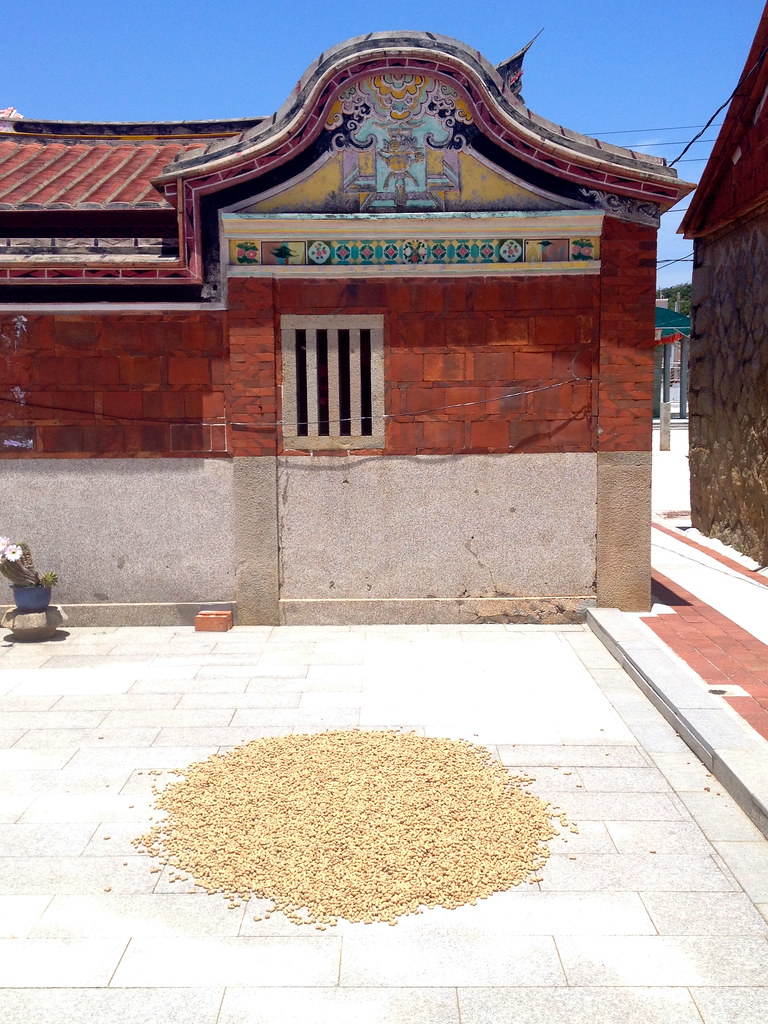
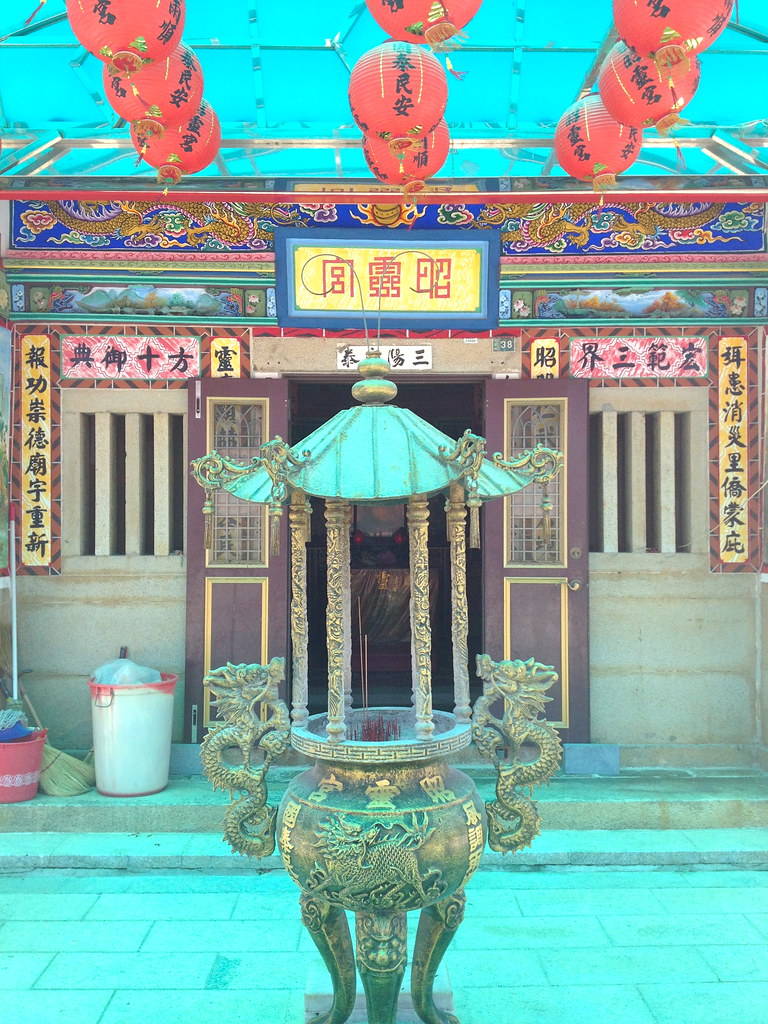
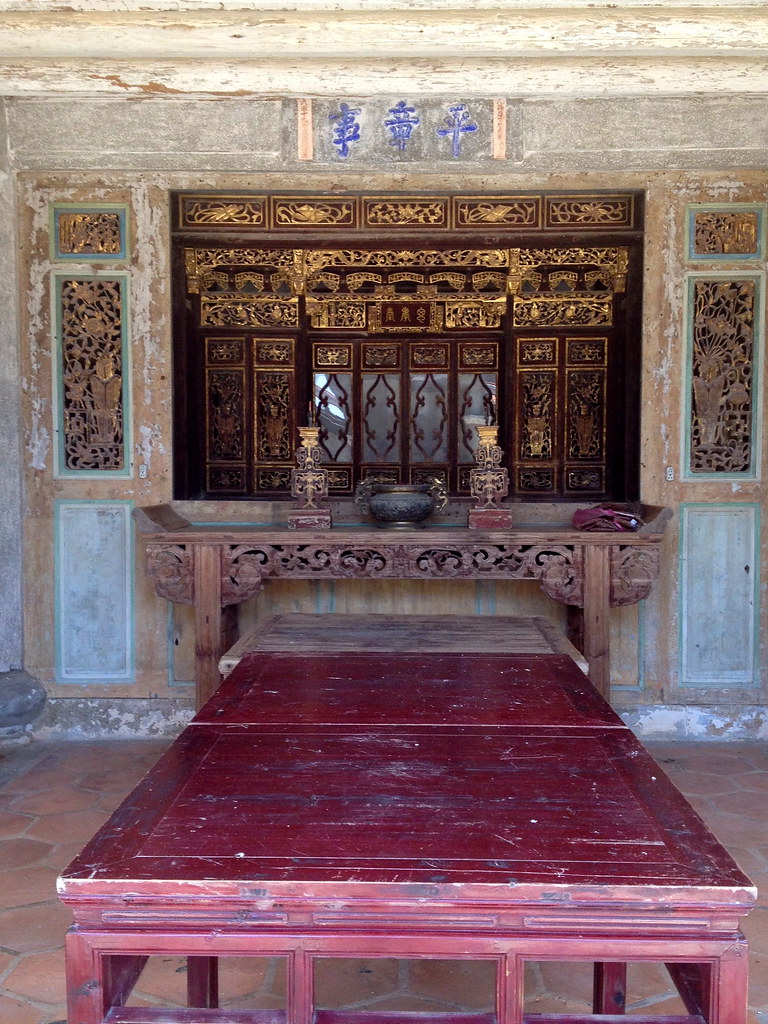
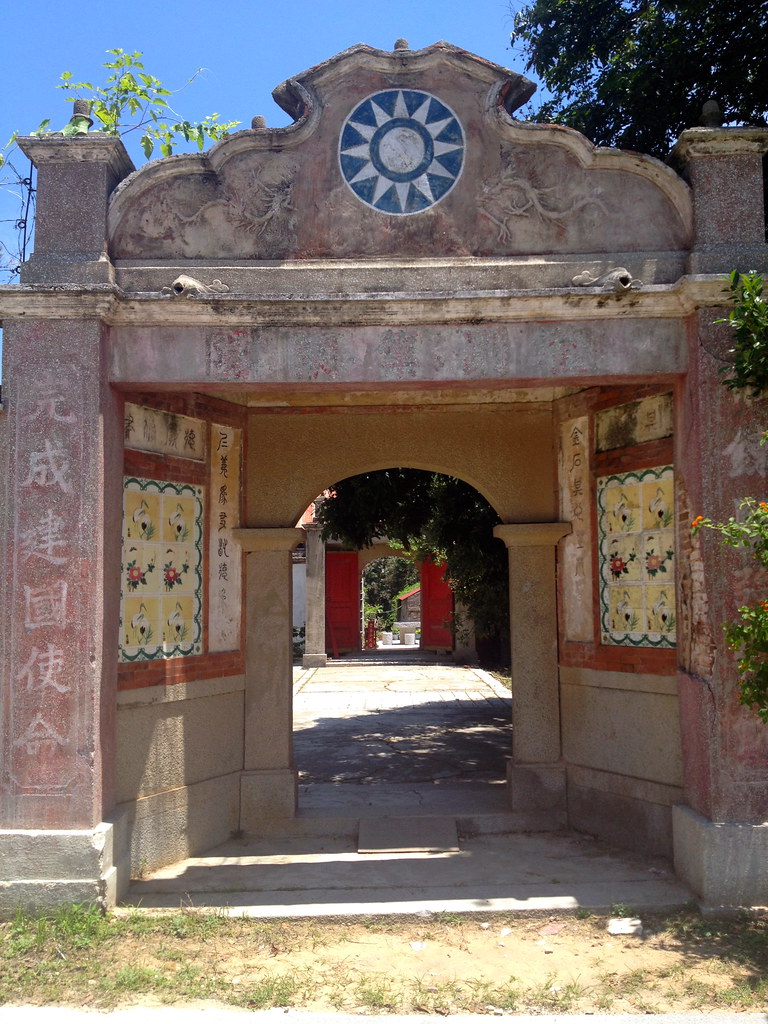
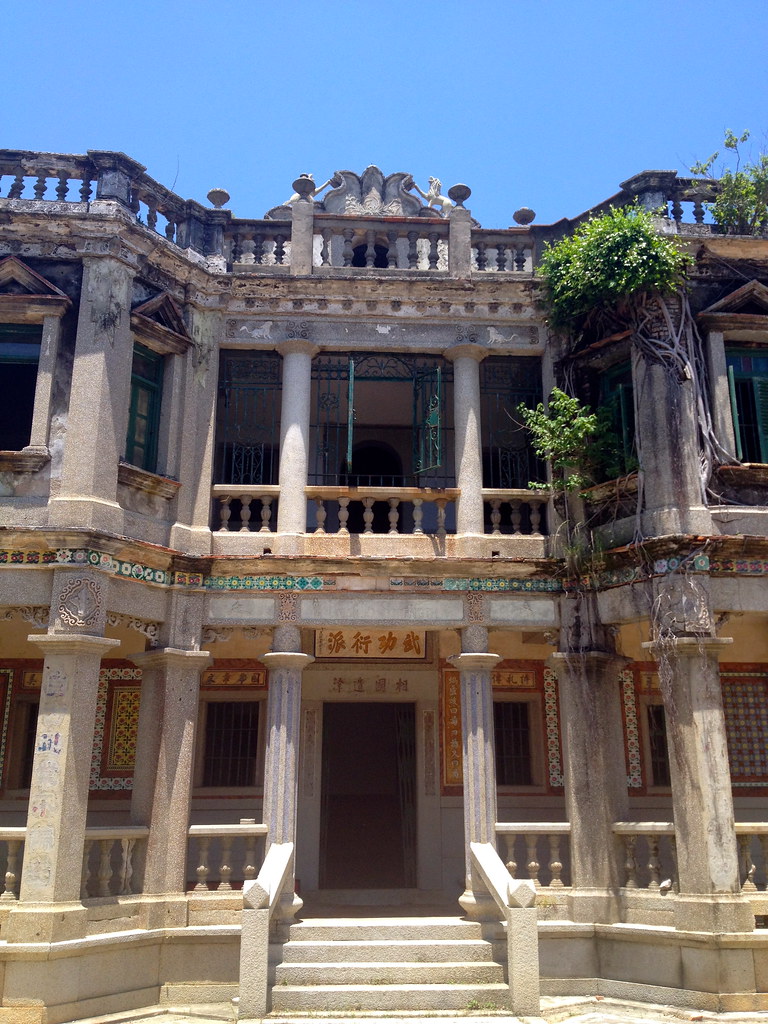
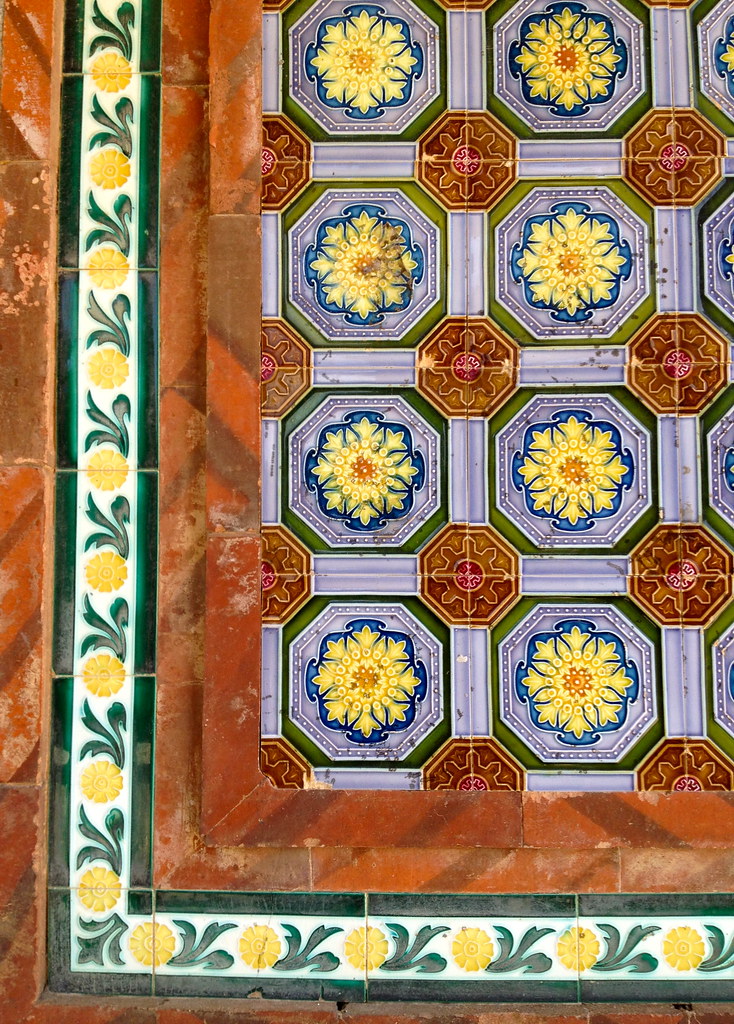
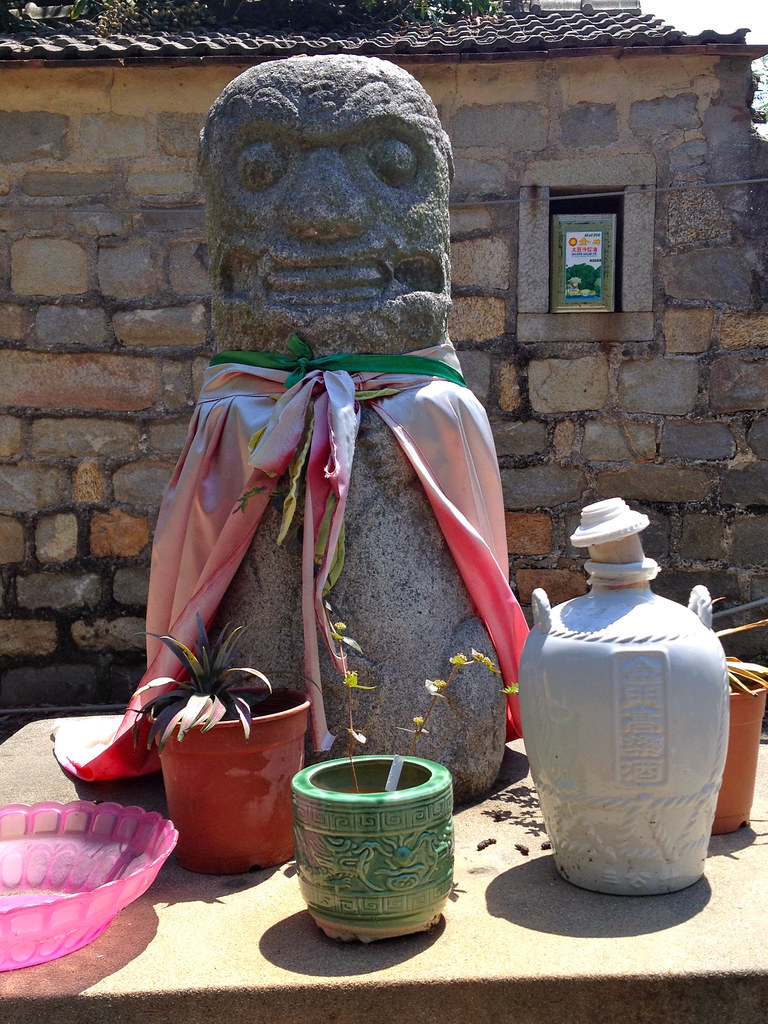
At some point we passed through Shamei and got some of the famous shaobing there (tasty - worth it - check your guidebook) though my favorite part of this section of the drive was stopping to wander some of the quiet backstreets. It is easy to get very hot and very tired in Jinmen, so we took a rest on a stoop in one of the older, more shambling back lanes and chatted with locals while local cats lazed about.
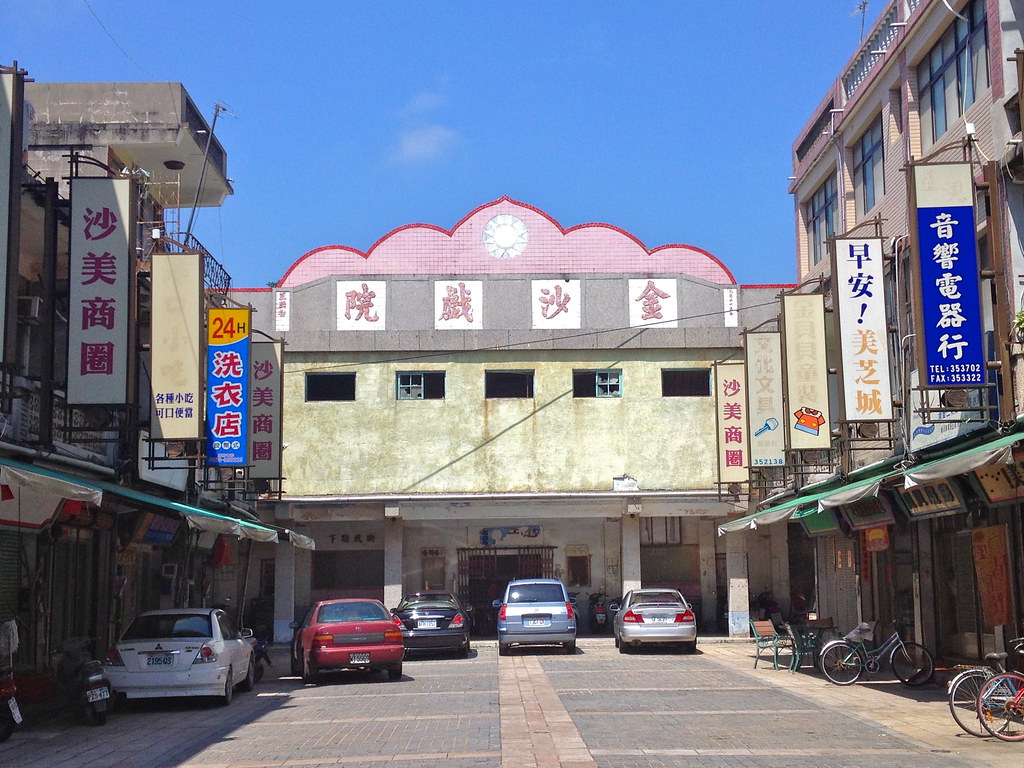
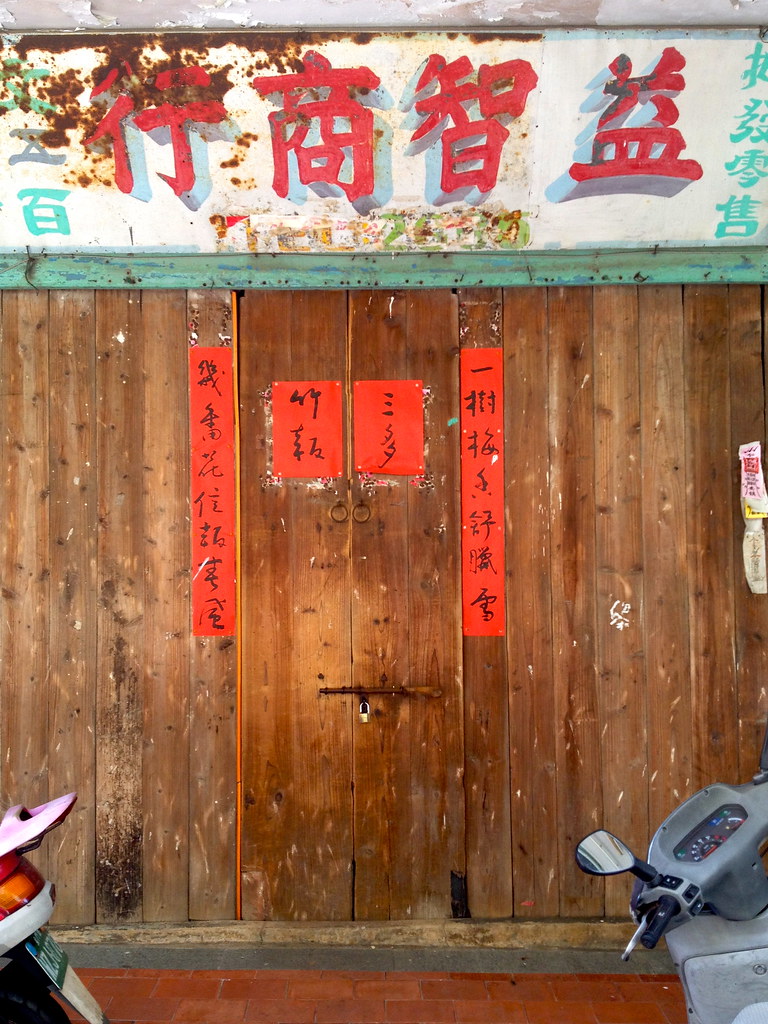
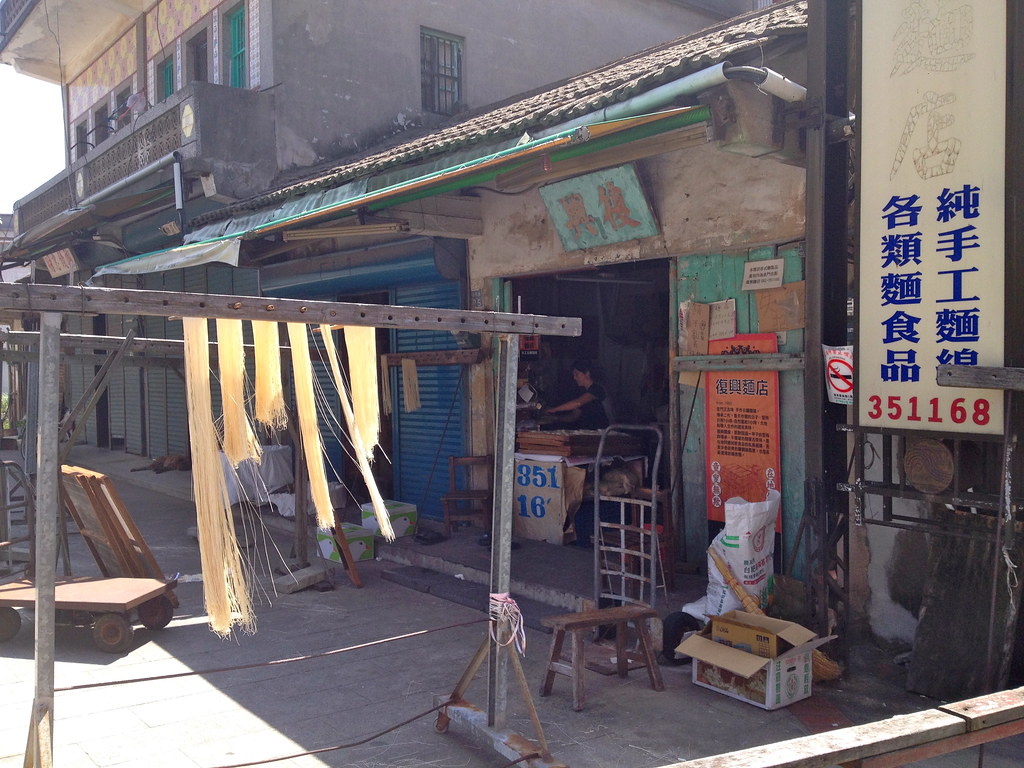
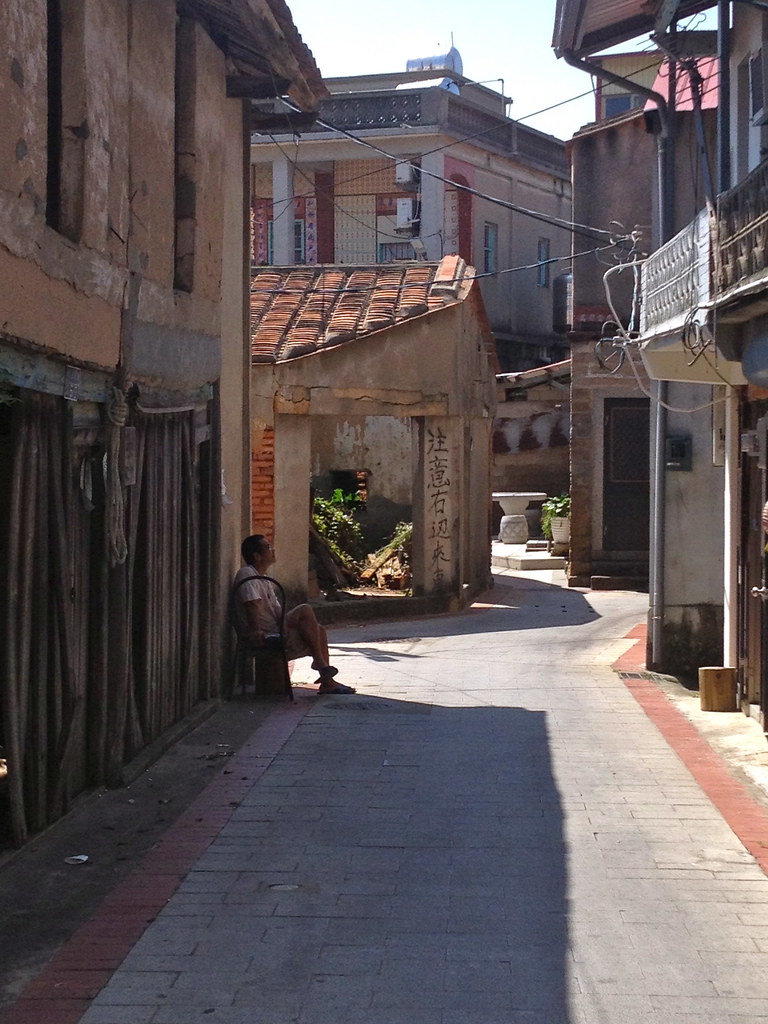
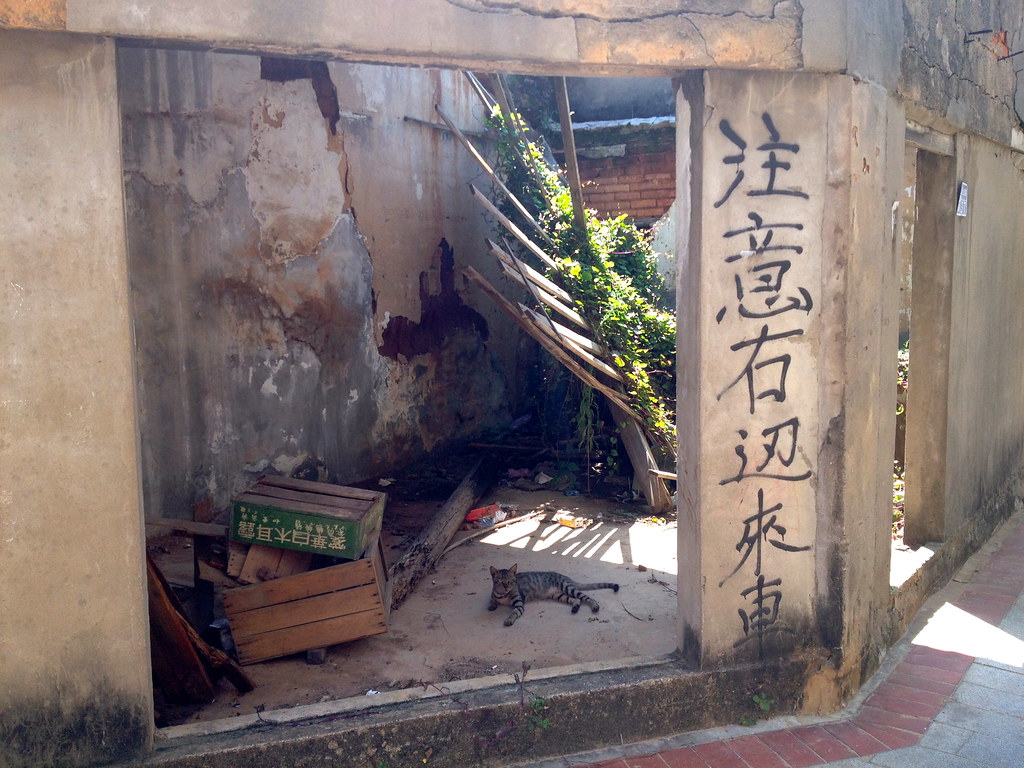
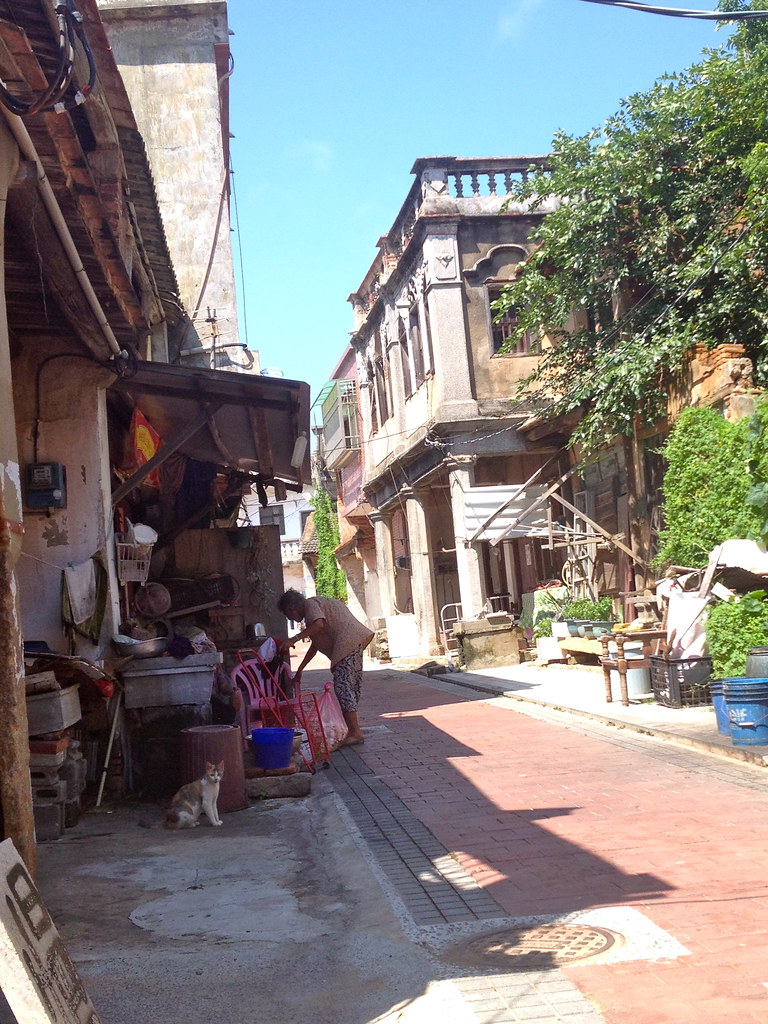
I'm not sure when this happened, though, because after we left the neighborhood with the Rui You School, we followed the road out of town right to the coast (past some interesting-ish views of windfarms), turning at a small reservoir-like lake that is either man-made or man-contained, before heading up a road that led to a turn-off (forgive my vagueness, I really don't remember well) where, completely by accident we came across a tiny little parking area with a stone staircase leading up a hill, which looked like it'd have an ocean view. Why not, right?
Turns out at the top there was some old gate - I actually don't know how old although we checked at the time, but old (like 14th century) and fairly recently restored. Checking the name online after a deft Street View search, it was 觀日門, near Tianpu (田浦) village. Of course then I upload my photo and realize the name is right there. Doof.
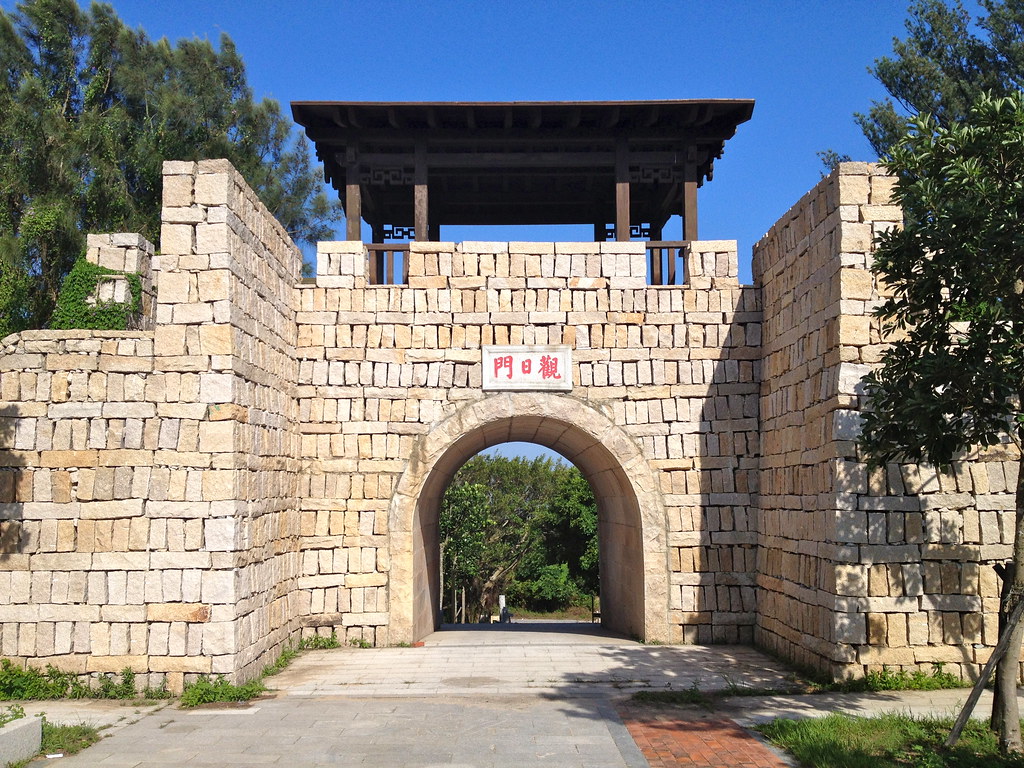
Then we drove along Buhua Road, which is not that interesting in and of itself but is dotted with a fairly high density of wind lions. Here are just a few:
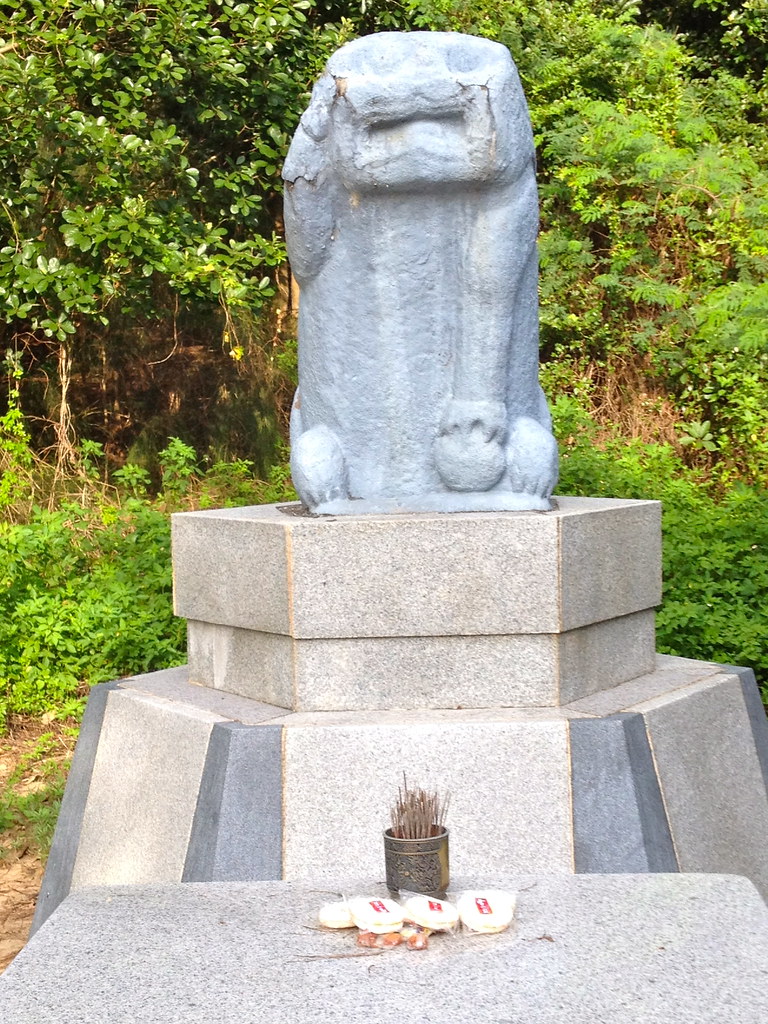
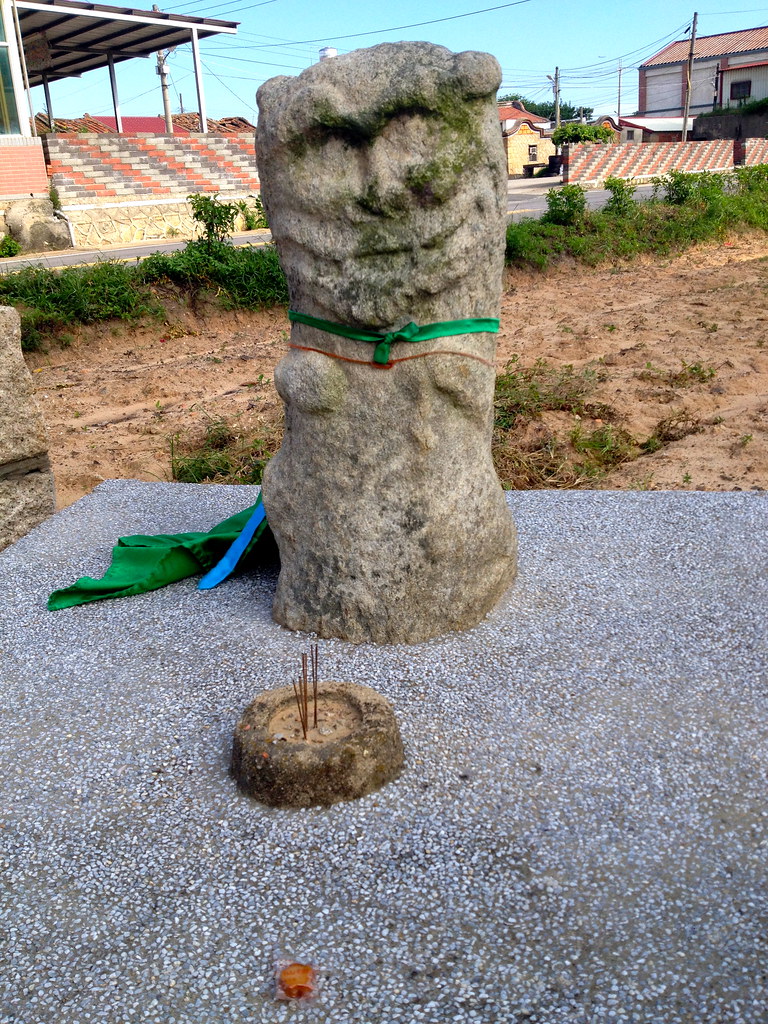
...before heading into the Lake Tai recreation area looking for more wind lions. We missed the museum as it was getting late, but managed to get this lovely picture of the sign for the "amusement zone":

AMUSEMENT IS MANDATORY IN THE AMUSEMENT ZONE.
...and we only found one fairly unimpressive wind lion, but it was cool to ride around the back roads.
We finished off with dinner in Shanwai, after finding a few lions there, too - including this sad-looking colorful one at the edge of a parking lot who is very definitely male:
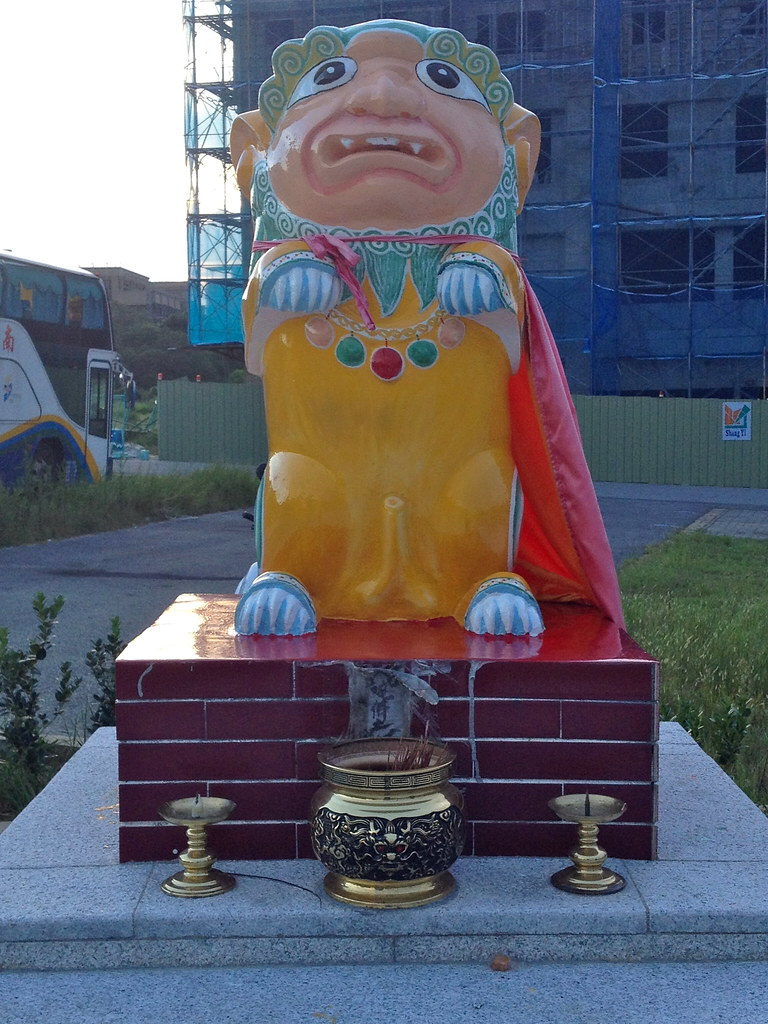
Throughout Shanwai we kept seeing these flags, and although I am fairly knowledgeable about Taiwanese folk religion and culture, I have to admit I don't know what they signify:
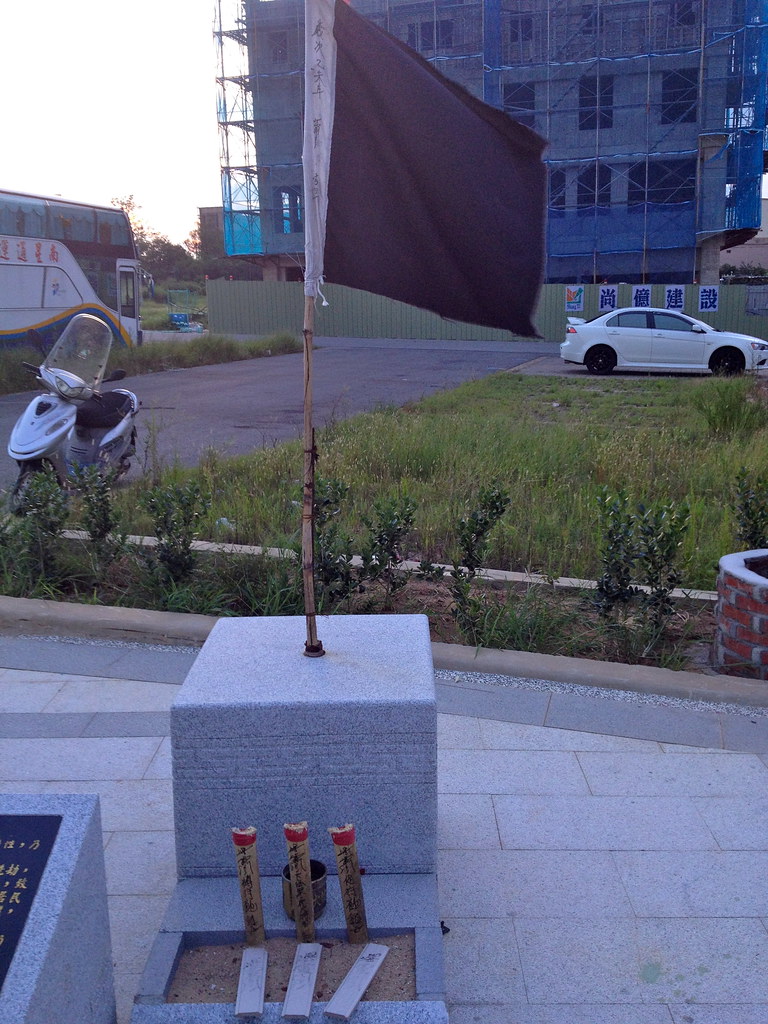
If anybody does know, I'm all ears. I rather hope I didn't take a disrespectful picture (though that's pretty rare in Taiwan, other than perhaps funerals you can photograph nearly everything).
Jinmen is a KMT stronghold, which means that a lot of old statues of Generalissimo and general Mass-Murdering Jerkwad Chiang Kai-shek (ptooey!) are still kicking around, where they might've been taken down in other parts of Taiwan. However, both Brendan and I appreciated the context of the statue in this circle, flanked as he is by a massive election poster - for the DPP! Ha haaaaaa, sucks to be you, Chiang. I hope you choke on it in the afterlife.
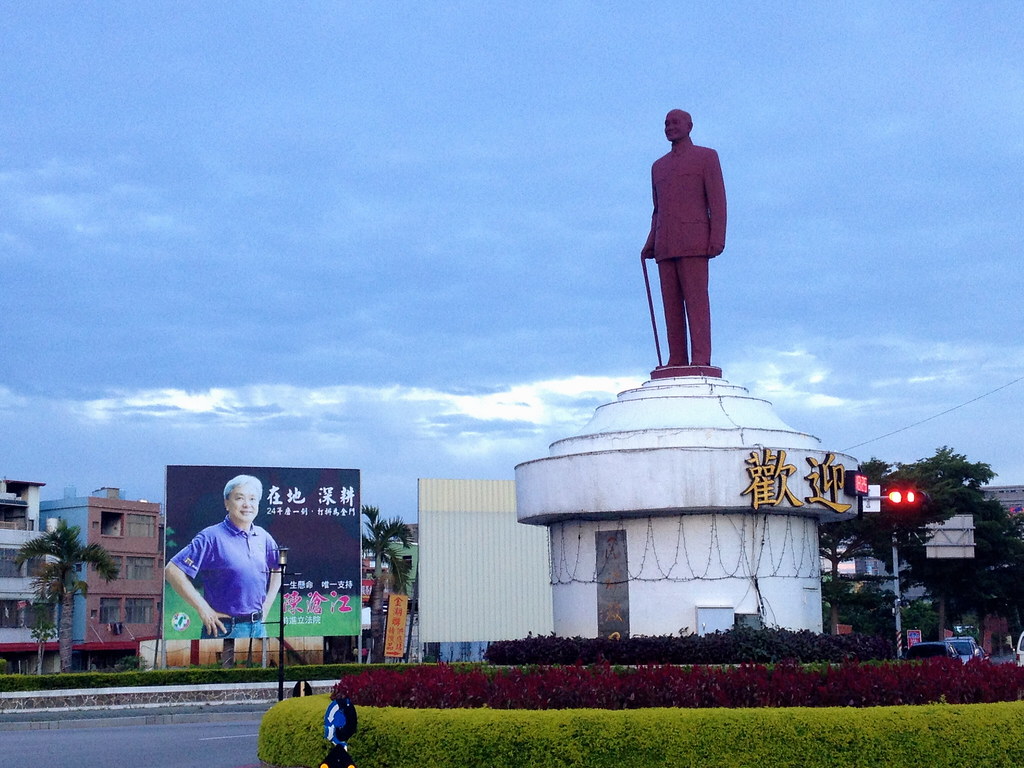
We hiked up a hill past more friendly cats - Jinmen has a lot of cats - to a few more wind lions before having dinner and driving back to our hotel. Wind lions in older sections of towns, usually far from the modern center, tend to be older:
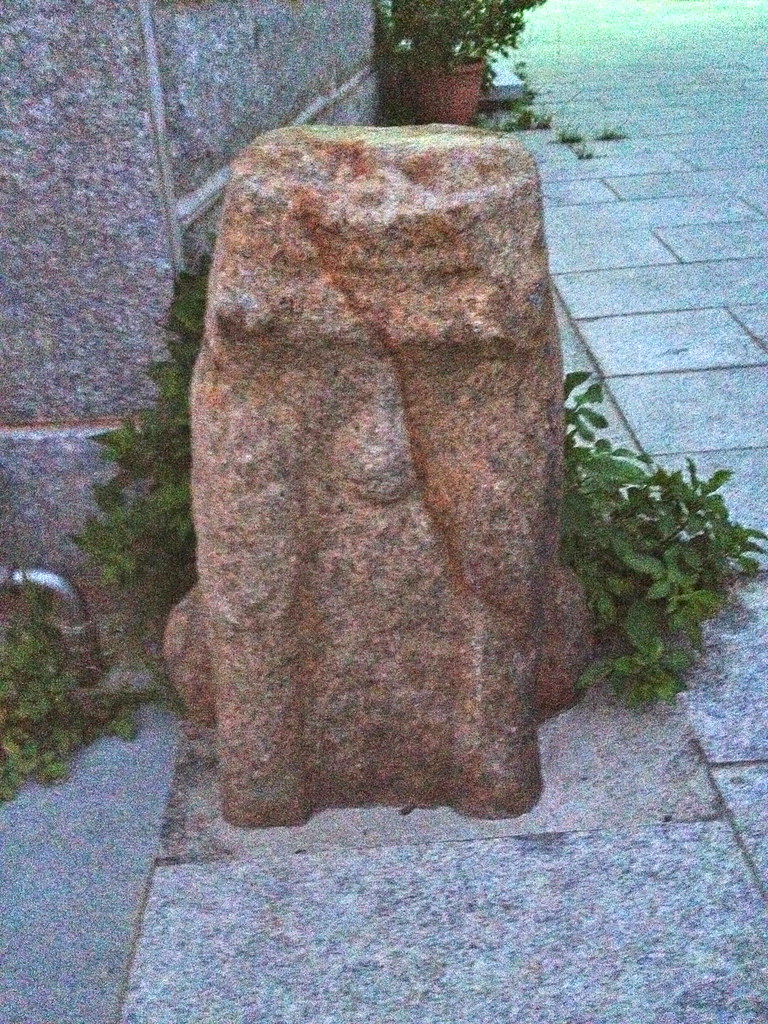
And we also passed this dalmatian-themed hotel with a pet dalmatian:
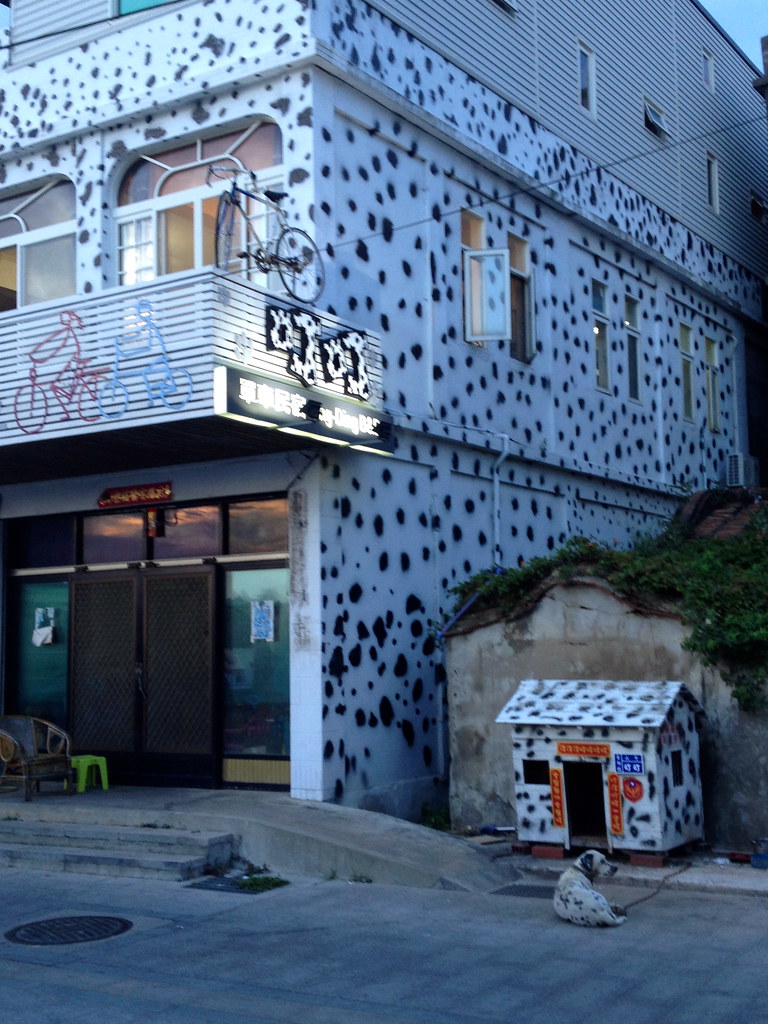
And found parts of Shanwai to be fairly attractive:
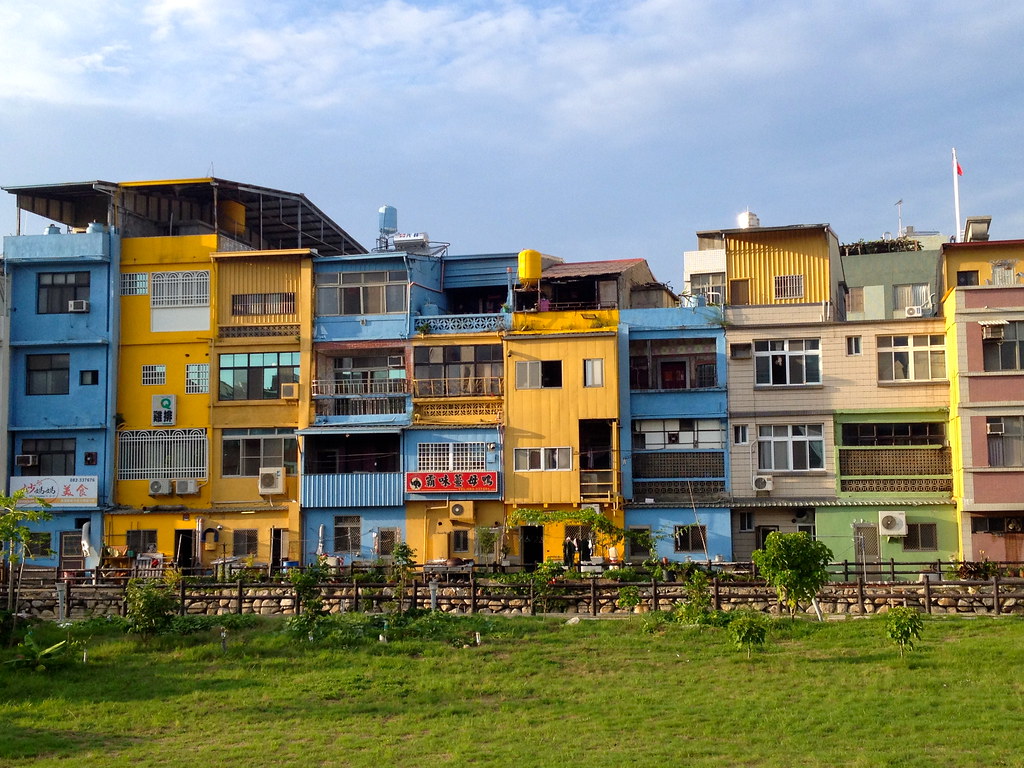
Another good thing about our hotel is you can hang out outside at night and drink Taiwan Beer (or whatever you like), and you can even have free Kaoliang, though I only had a tiny thimbleful. I'm not afraid of strong spirits - my whiskey of choice is Laphroaig after all - but I just don't care for Kaoliang.
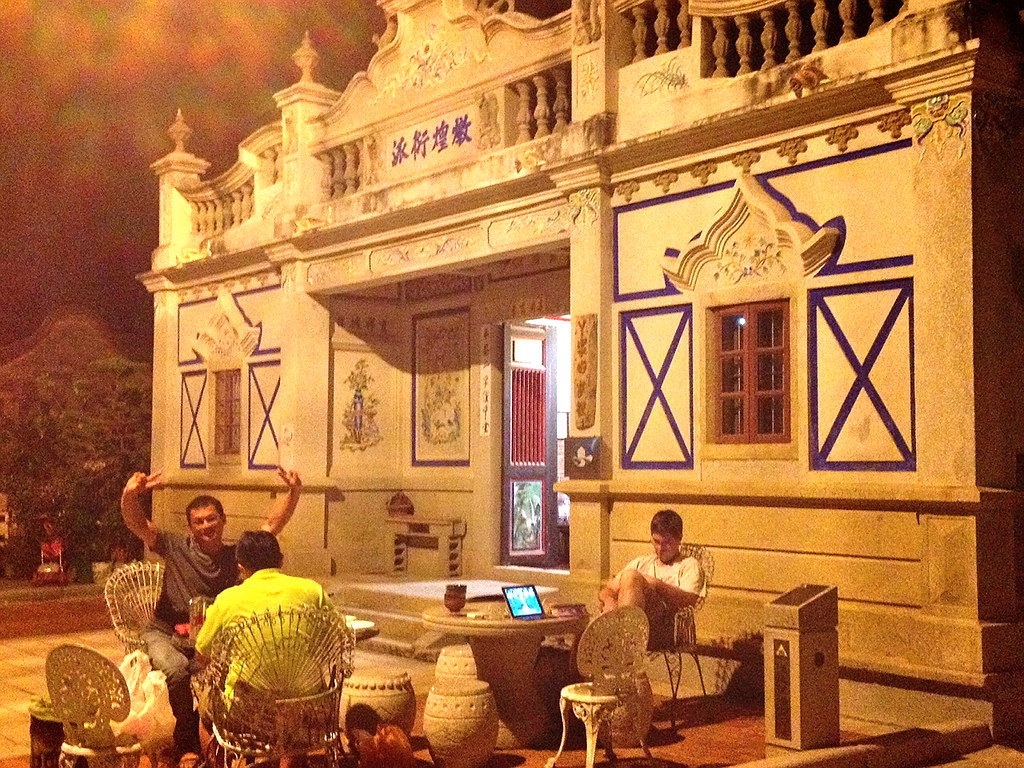
But wait, there's more!
I also can't remember when we did this, but at some point we stopped at Shanhou culture village. Historically the home of the Wang family and their many, many, many extended cousins and various relatives, now it's mainly a tourist attraction, but worth a visit. The oyster omelets are actually delicious, and there's a wind lion not far away. You can buy Kinmen Wang Da-fu balm here - a green herbal balm not unlike Tiger Balm but milder and more vegetal - the third-most popular Kinmen export after knives made out of bomb casings and Kaoliang, possibly fourth after those cookies you see everywhere. I bought some because I love balms, and we already have a bomb knife (thanks Joseph!), and I don't like Kaoliang.
Anyway, some photos from Shanhou:
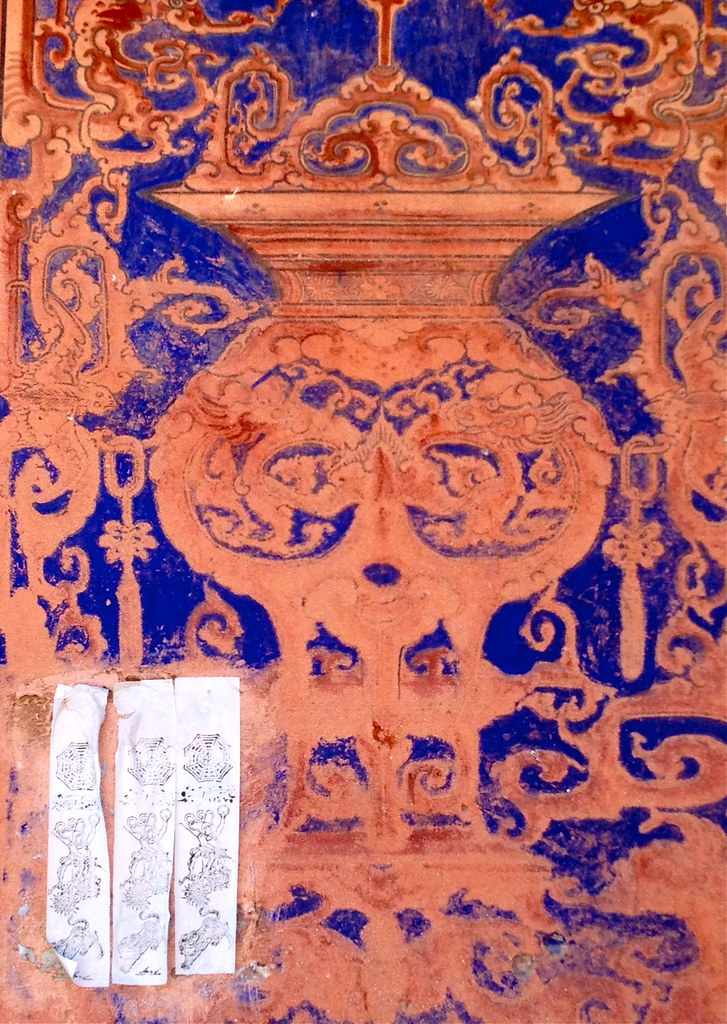
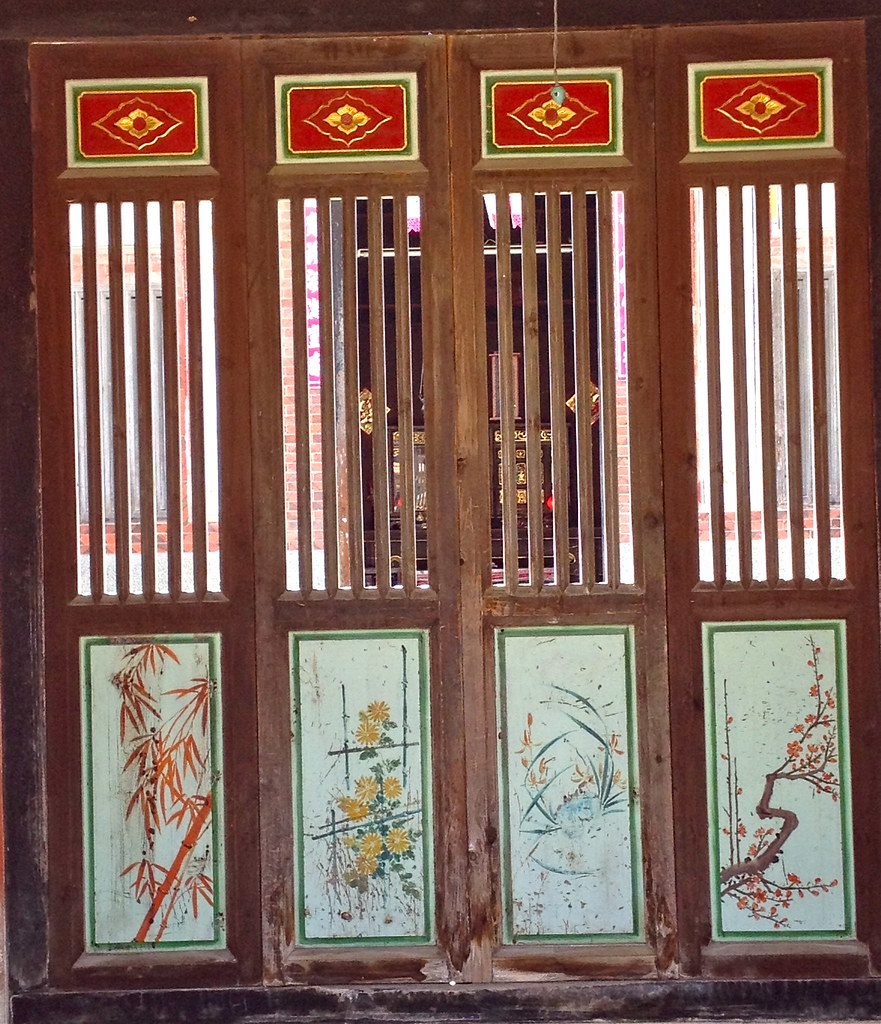

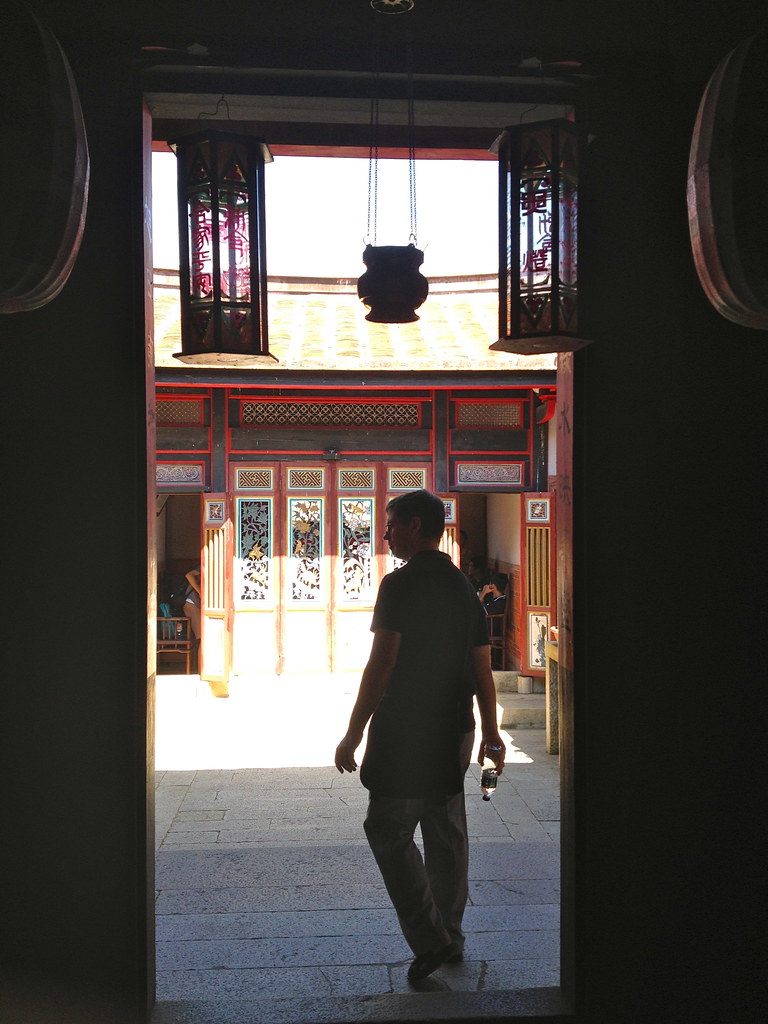
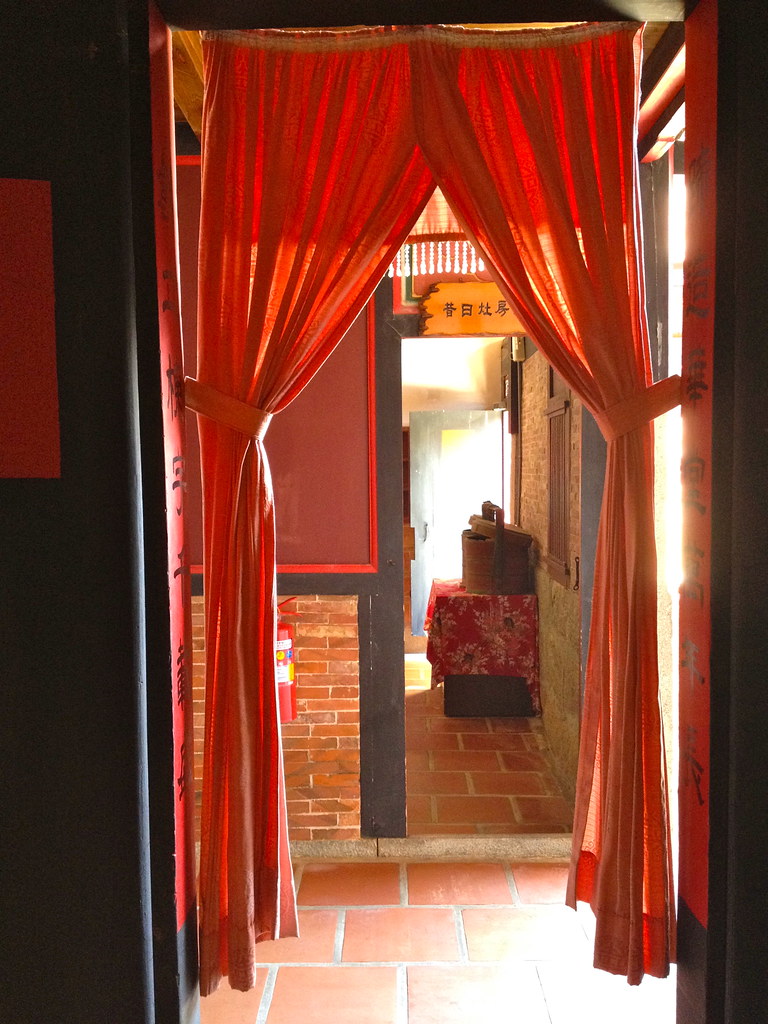
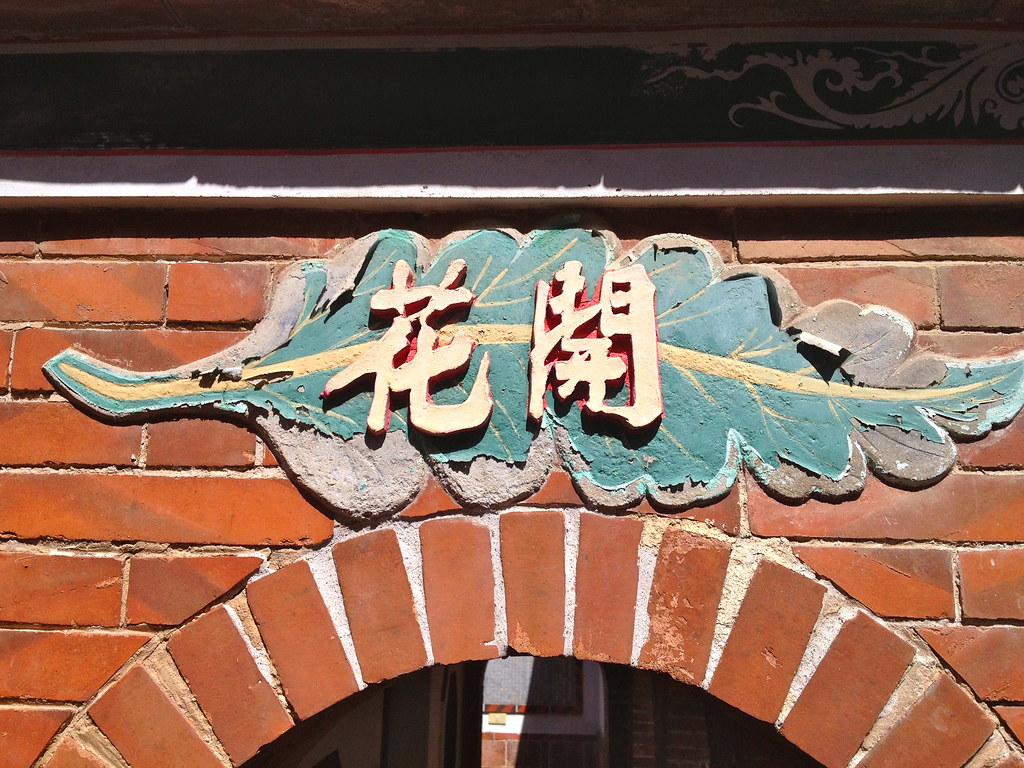
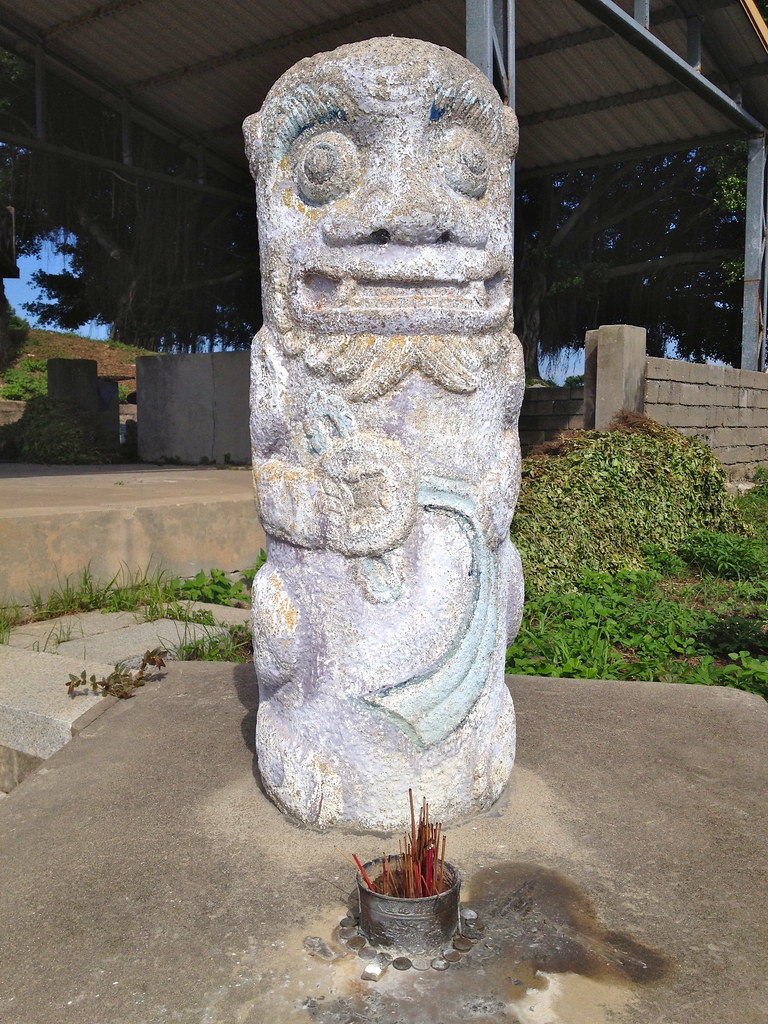
...and while we didn't make it to Maestro Wu's bomb knife shop (because we already have a bomb knife), or the Kaoliang distillery (because neither of us really likes Kaoliang), we did go to the Guningtou battle museum, with it's wonderfully/horribly propagandistic oil paintings of the ROC forces defeating the PRC on the nearby beach. Not a lot of photos from that, but here are some photos from the nearby town, with the famous bullet-ridden yanglou (foreign style house), after which we visited a temple erected for an ROC general, Li Guang-qian (李光前將軍廟), who died in the battle on Guningtou, which is a short drive south on Huandao Road:
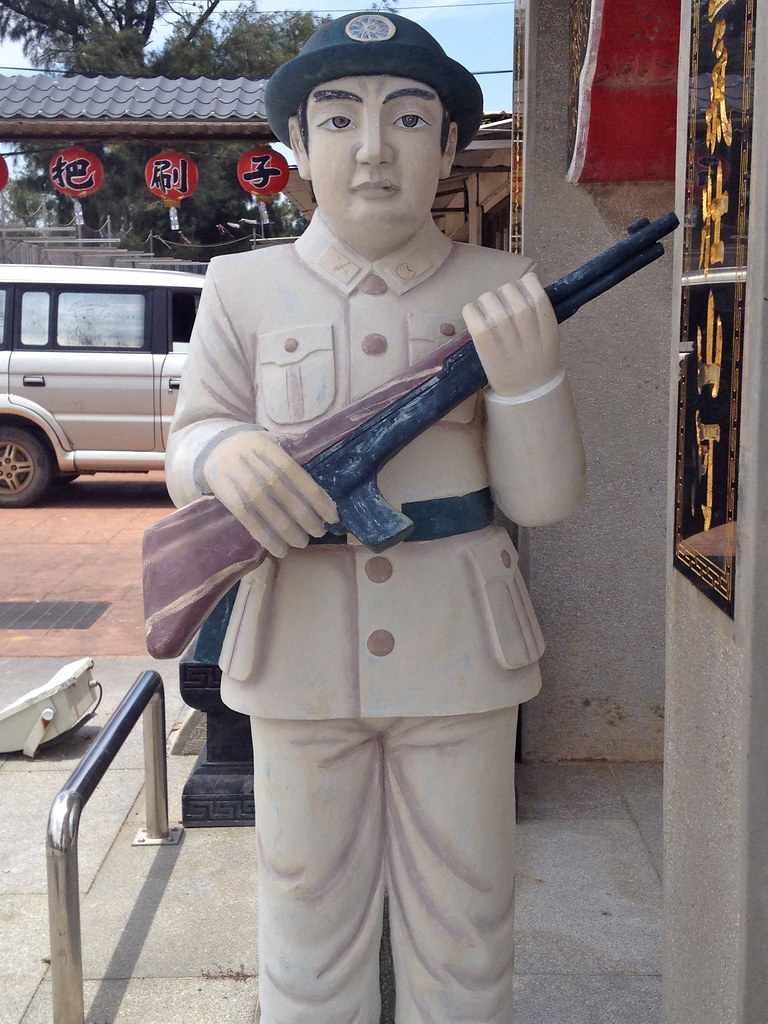
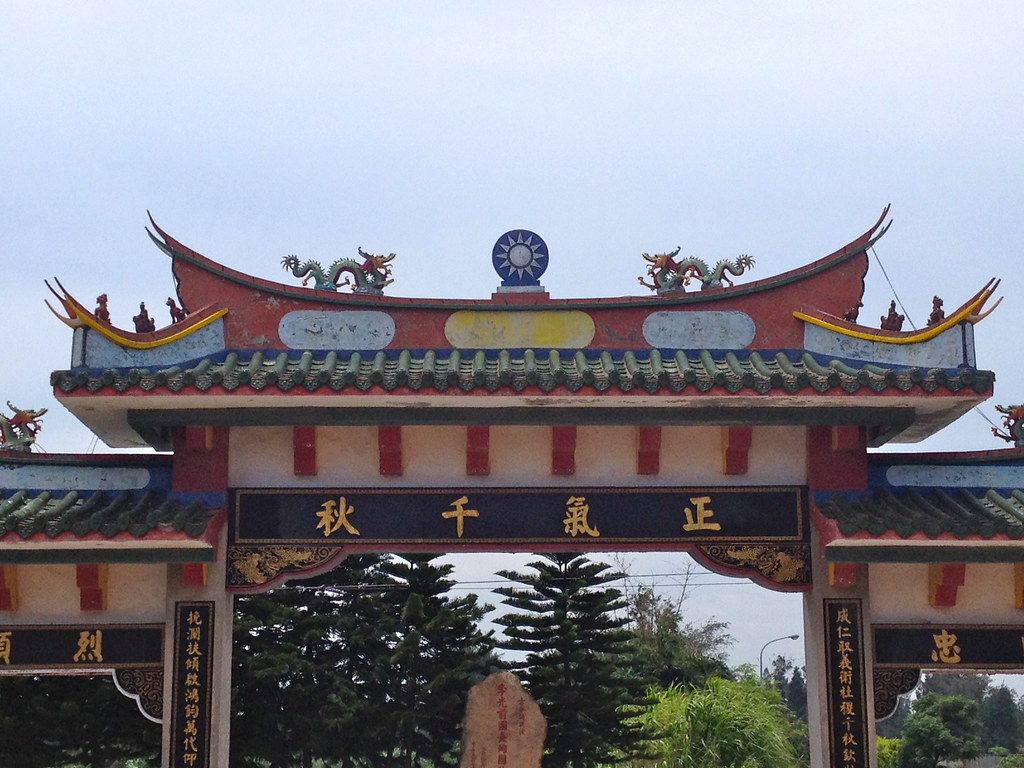
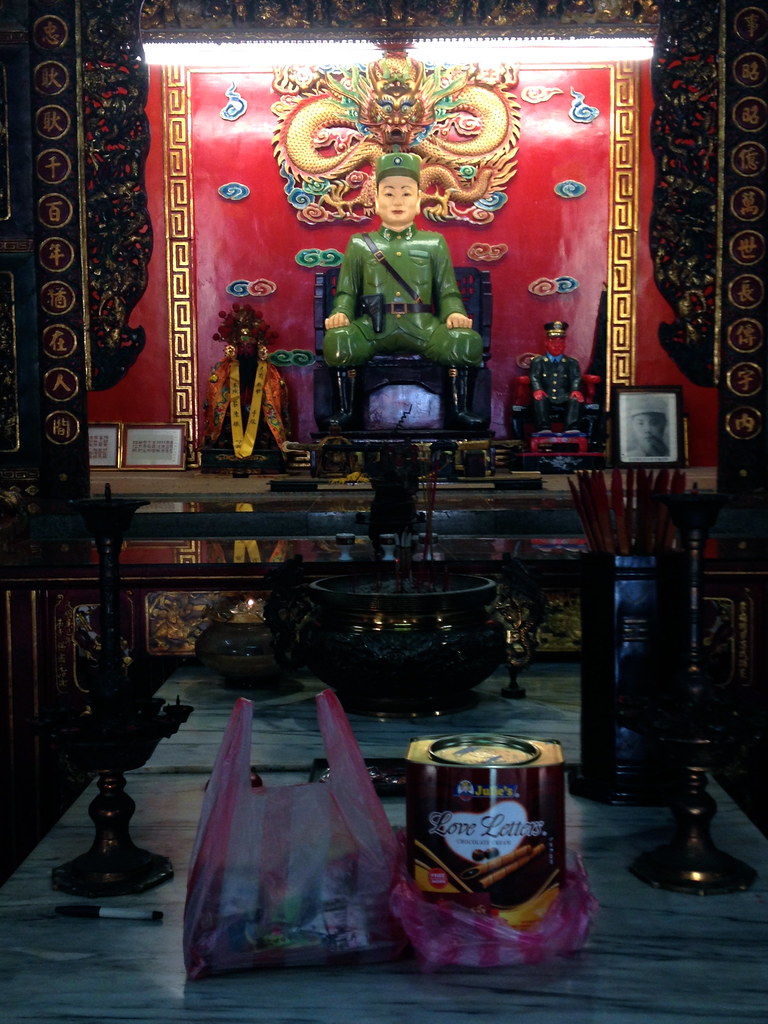
We had no particular reason to visit the temple other than that we drove by it and it looked interestingly militaristic in a way that most temples, uh, don't. That's the great thing about just tooling around and not worrying if you hit every sight in the book.
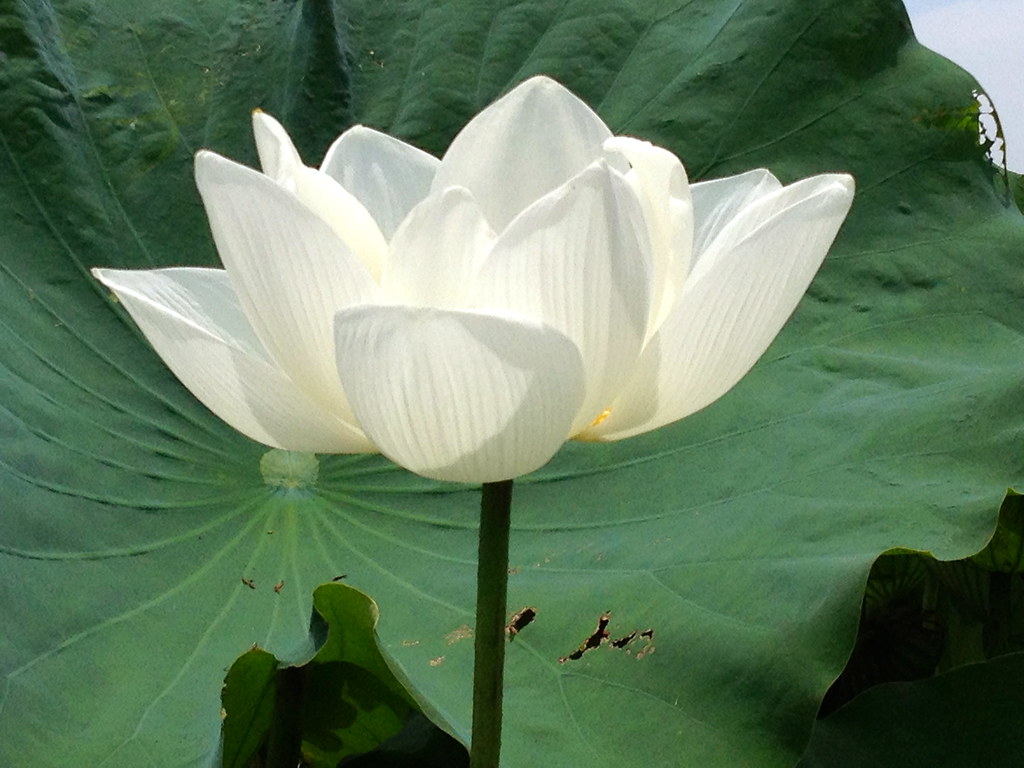
Another benefit of tooling about is that you find things you didn't even think existed. Rough Guide mentions one old granite tower (also 14th century), but if you wander enough and stop where you see interesting signs, you'll come to a few more (no idea if they are authentic vintage or were built/rebuilt some time later).
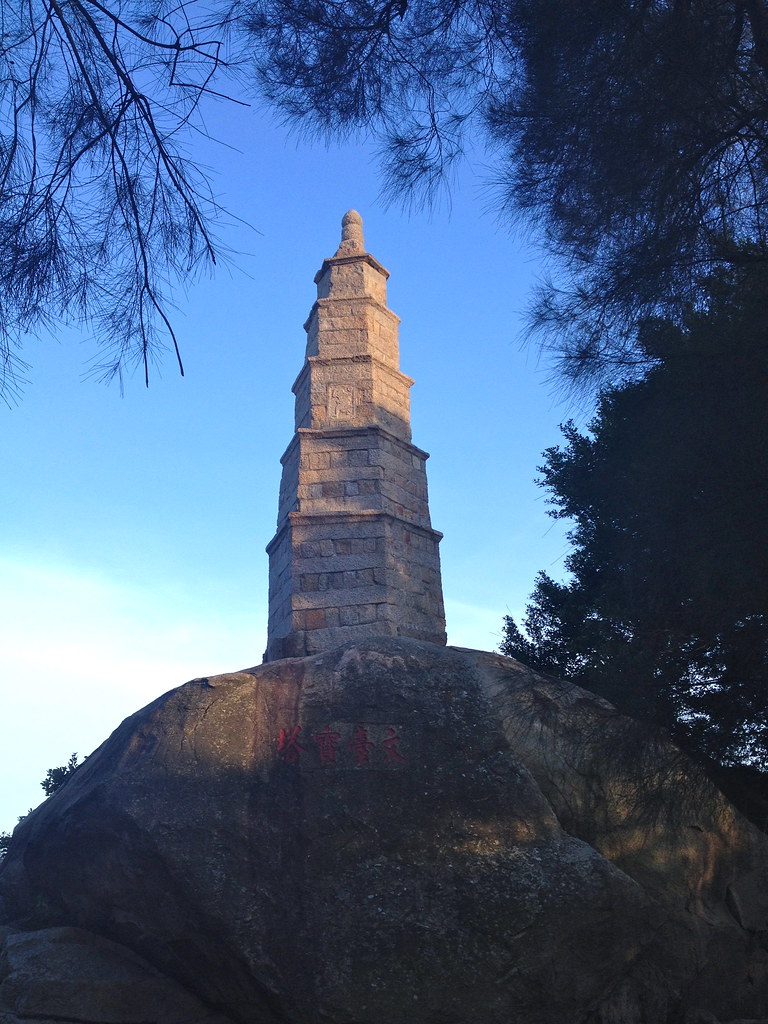
This is the one in the guidebook.
And this is one of the random ones we found:
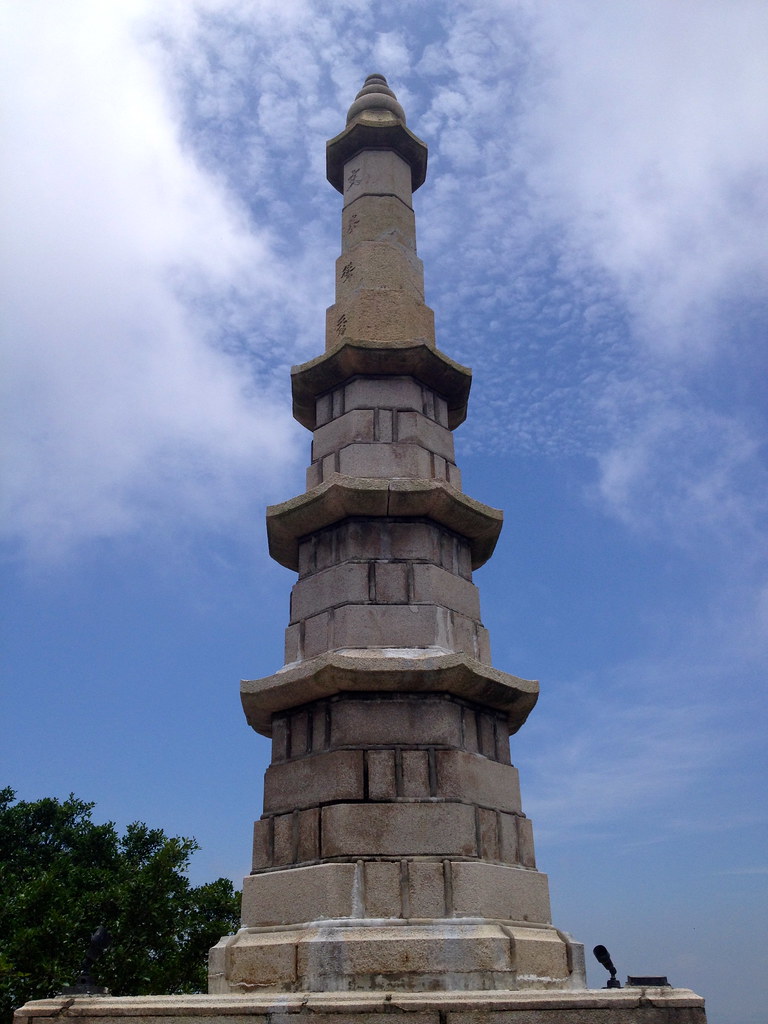
...and we found at least one more besides these two. They all look about the same though.
We also hiked up Taiwushan, which sounds impressive except it's not particularly high. Before going up we explored the old military cemetery near the car park. There are some nice views, and notably, more of Jinmen's many cats.
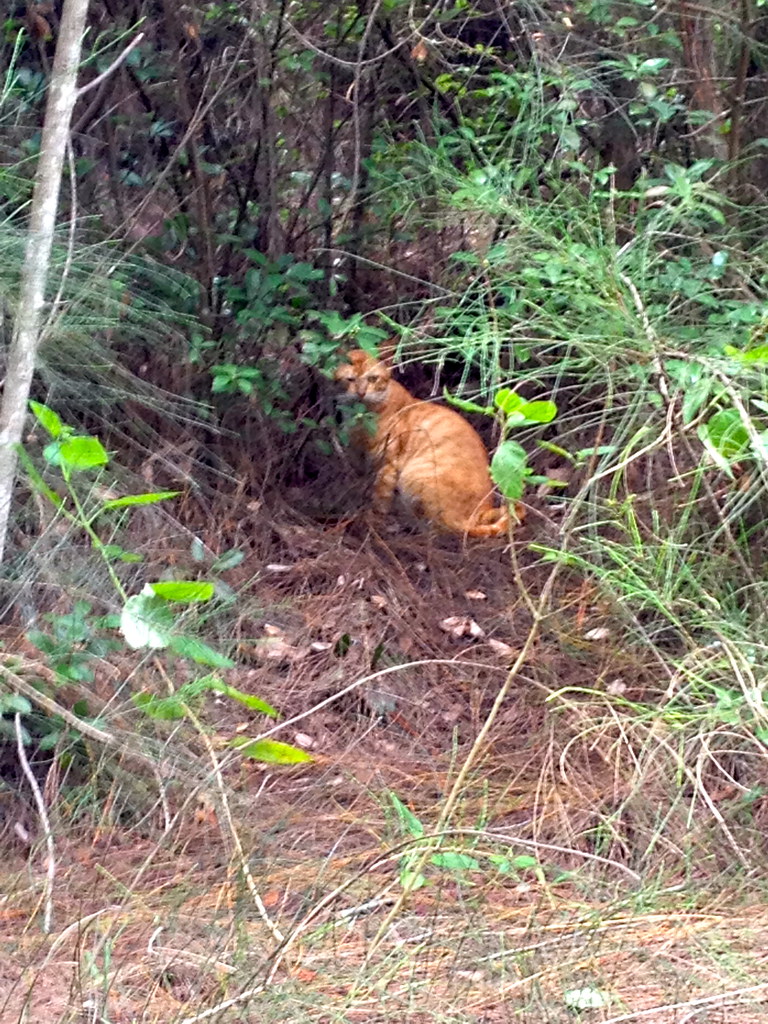
We stopped at the old inscribed stone (my photo wasn't very good) and Haiyin temple, which was a pretty good place to take a rest before heading back down (somewhere along the road up Taiwushan we found a pathway to another one of those granite towers).
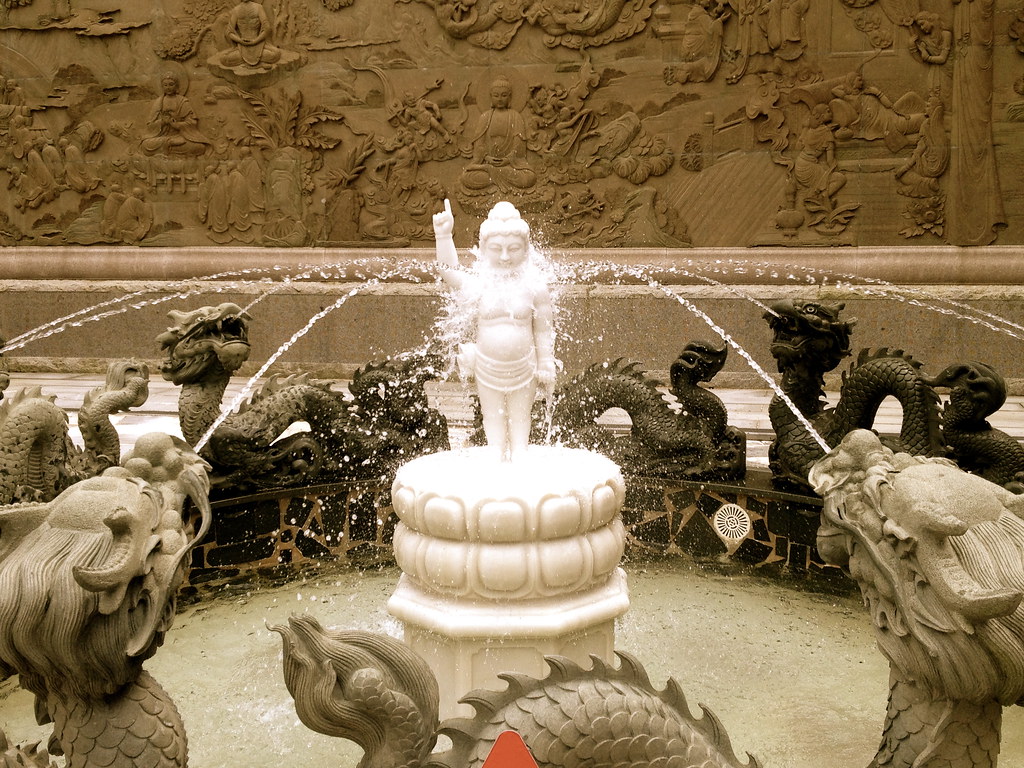
On our last day we drove around a bit more and found a few more wind lion gods, including some way out in the countryside by the airport. These lions, it seems, are undeniably gendered:
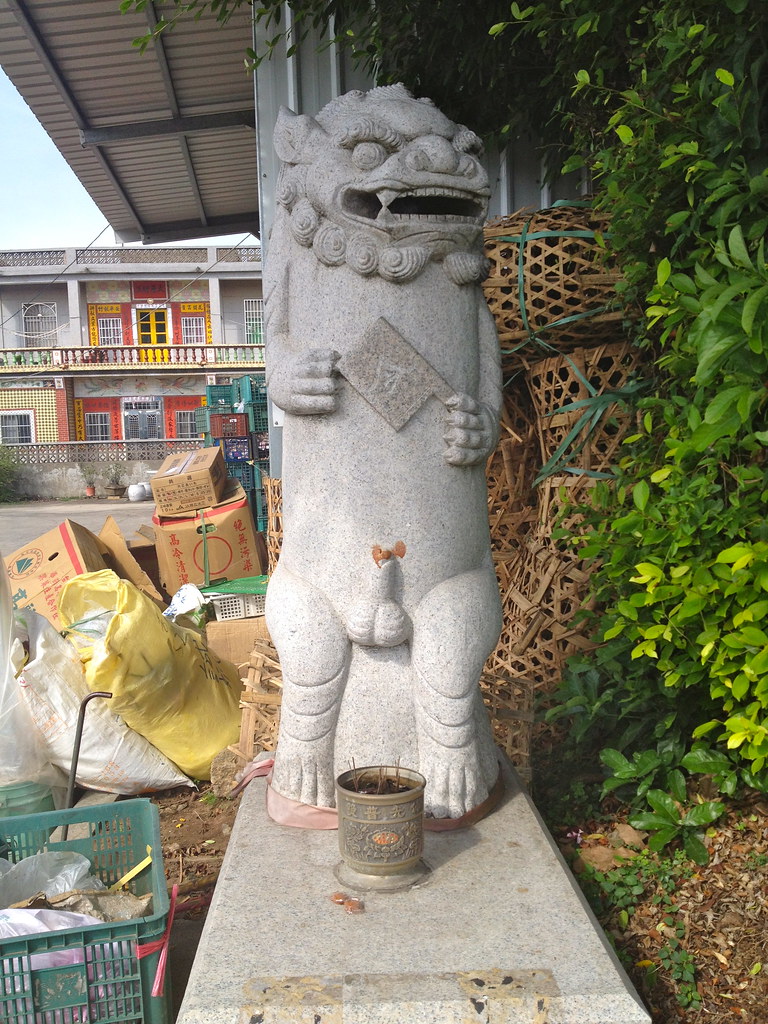
Well hello there. Aren't you just a happy little fella?
...and a few photos that didn't really fit anywhere else but I basically just liked:
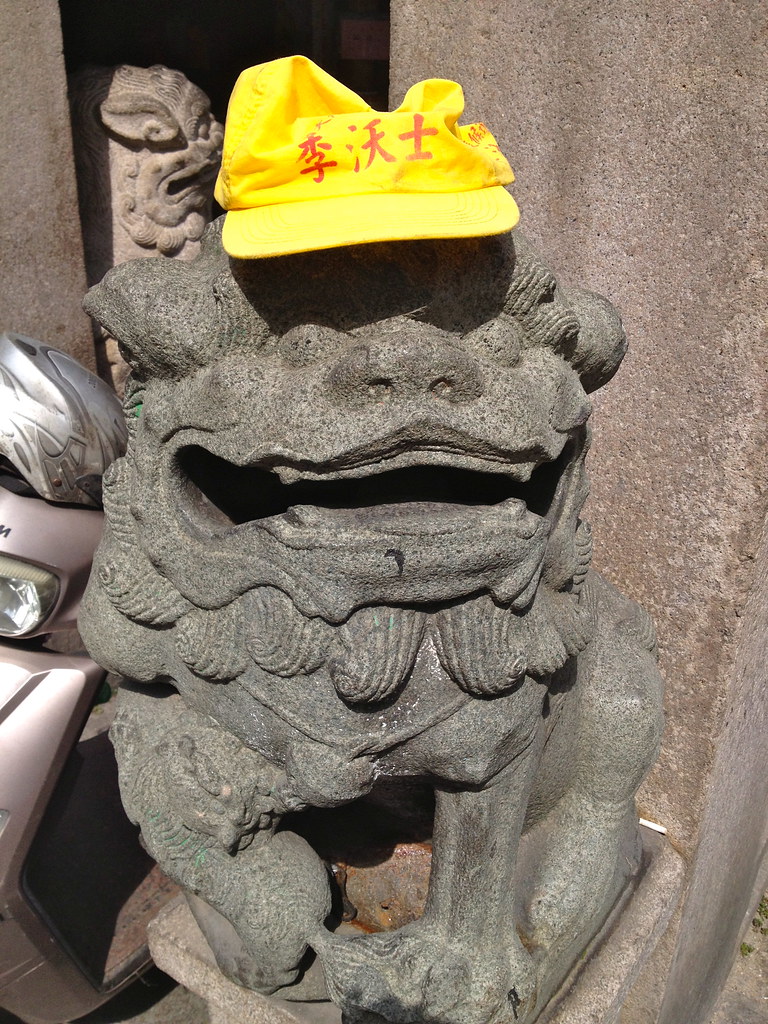
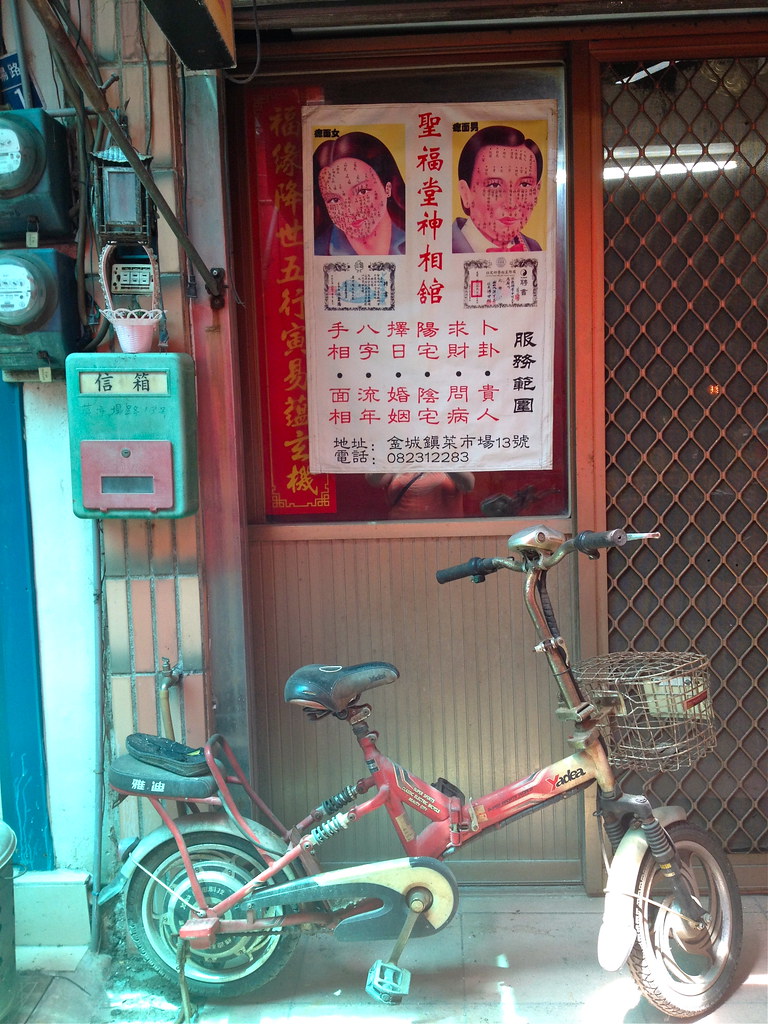
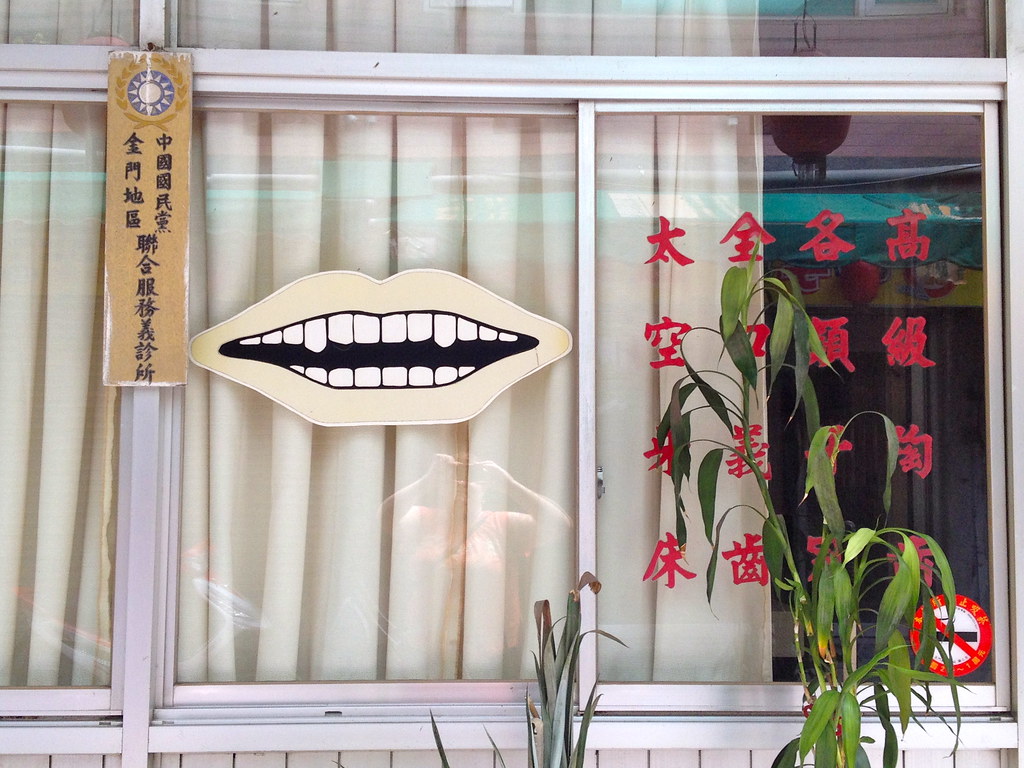
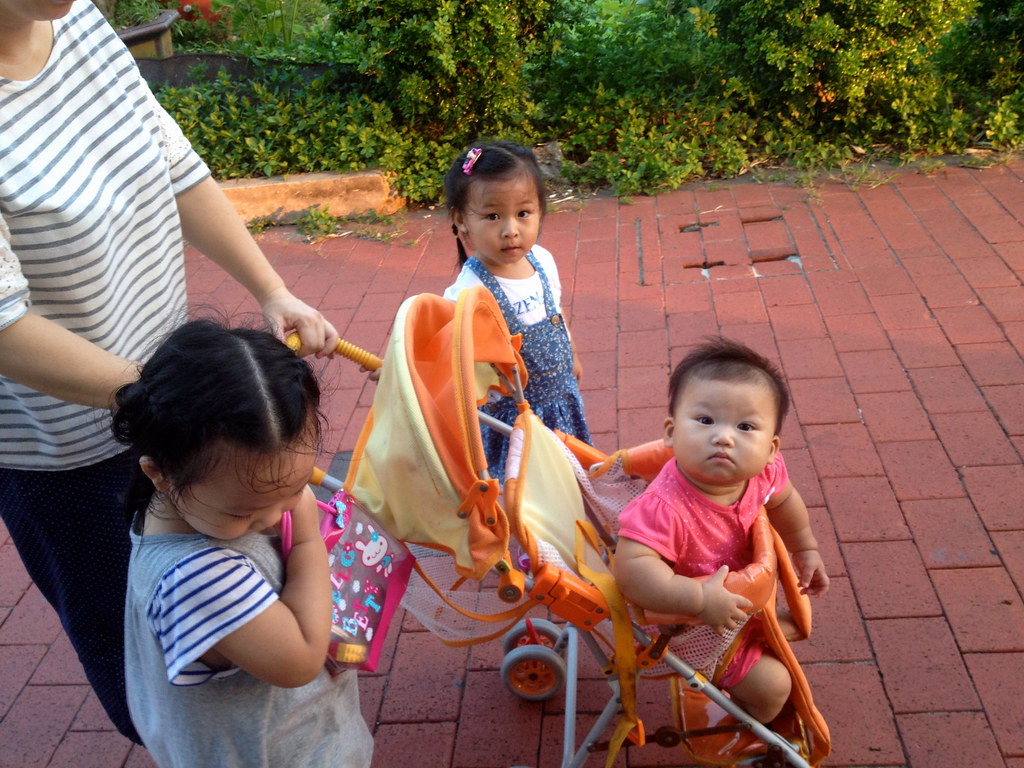
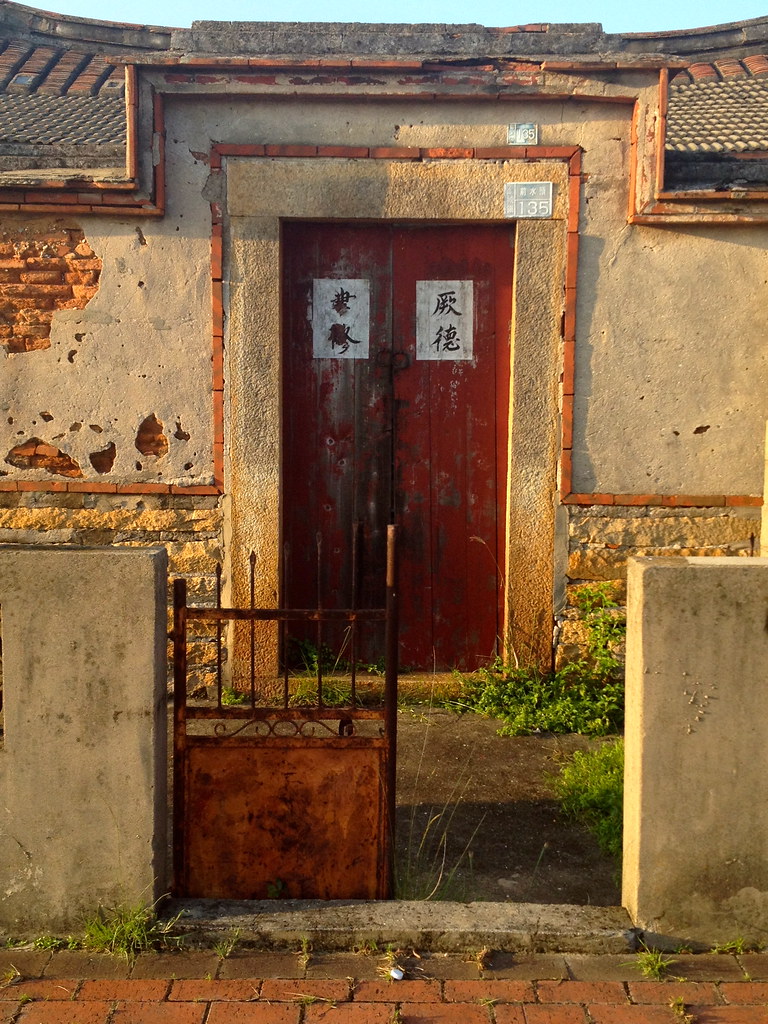
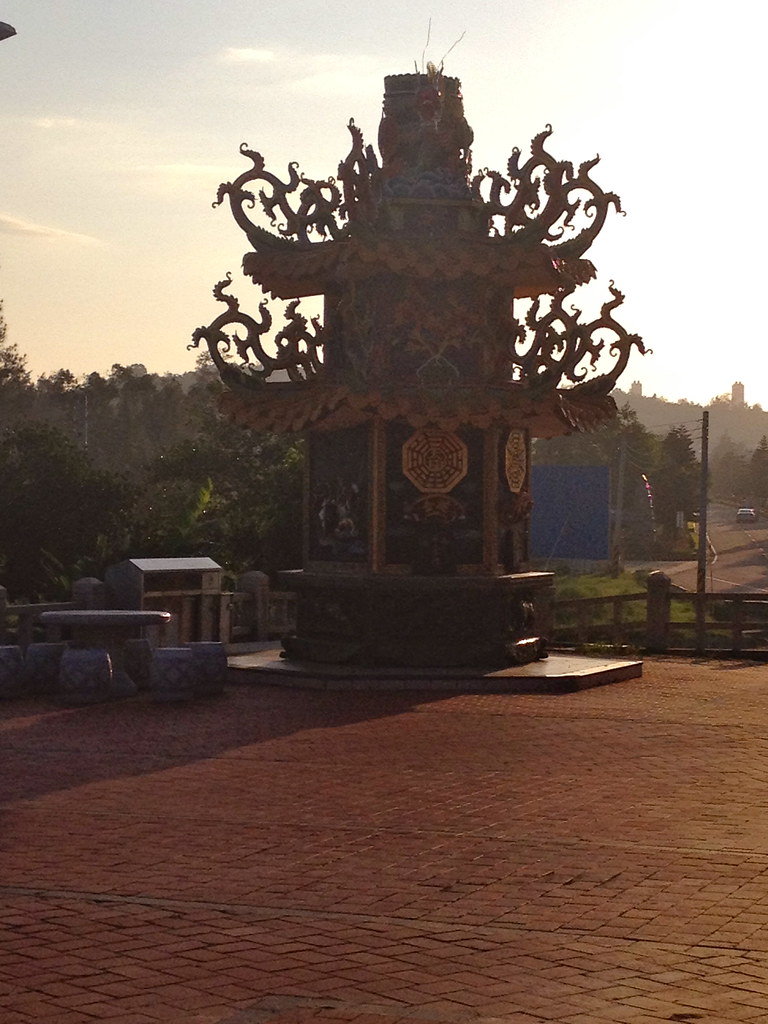
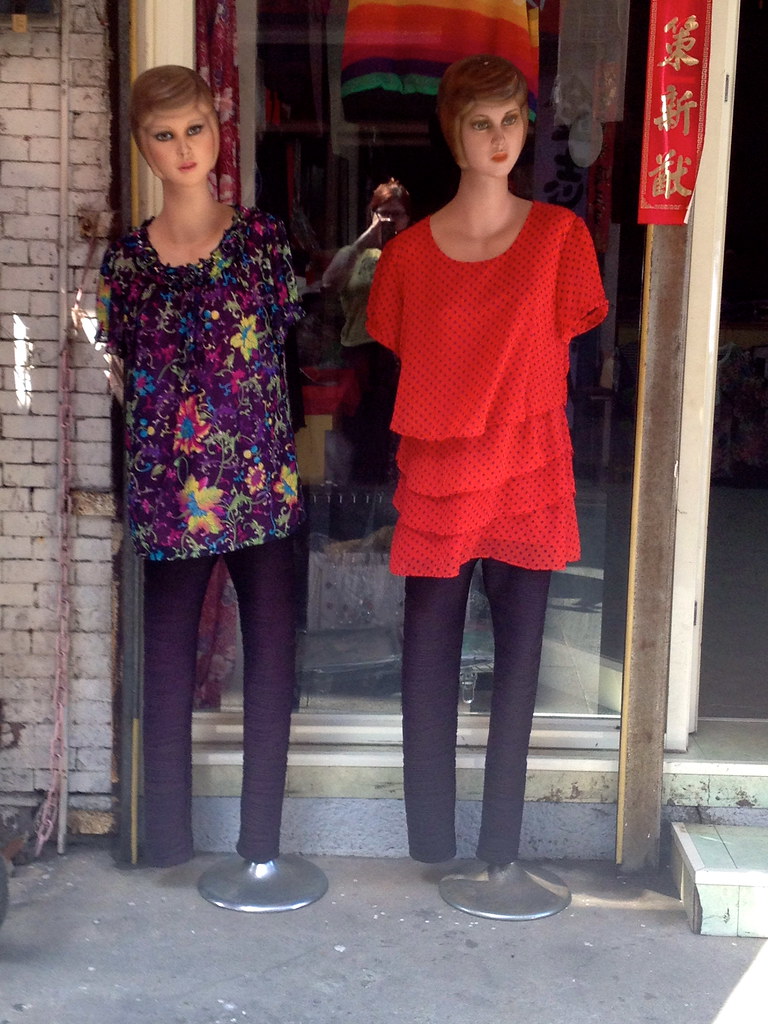
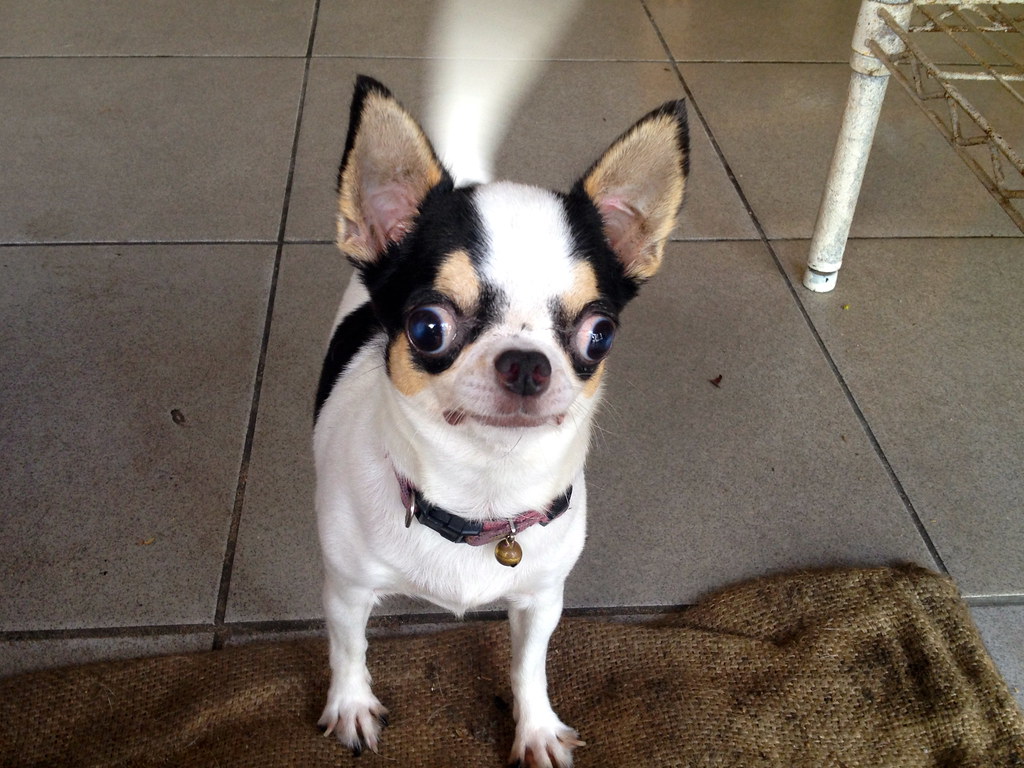
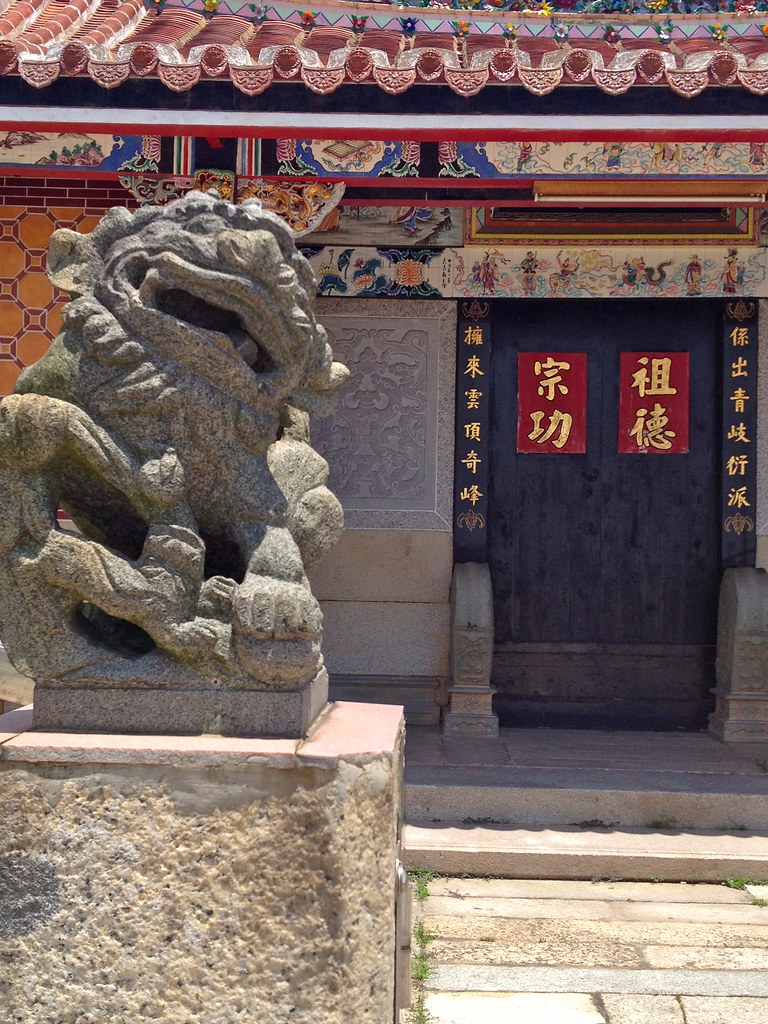
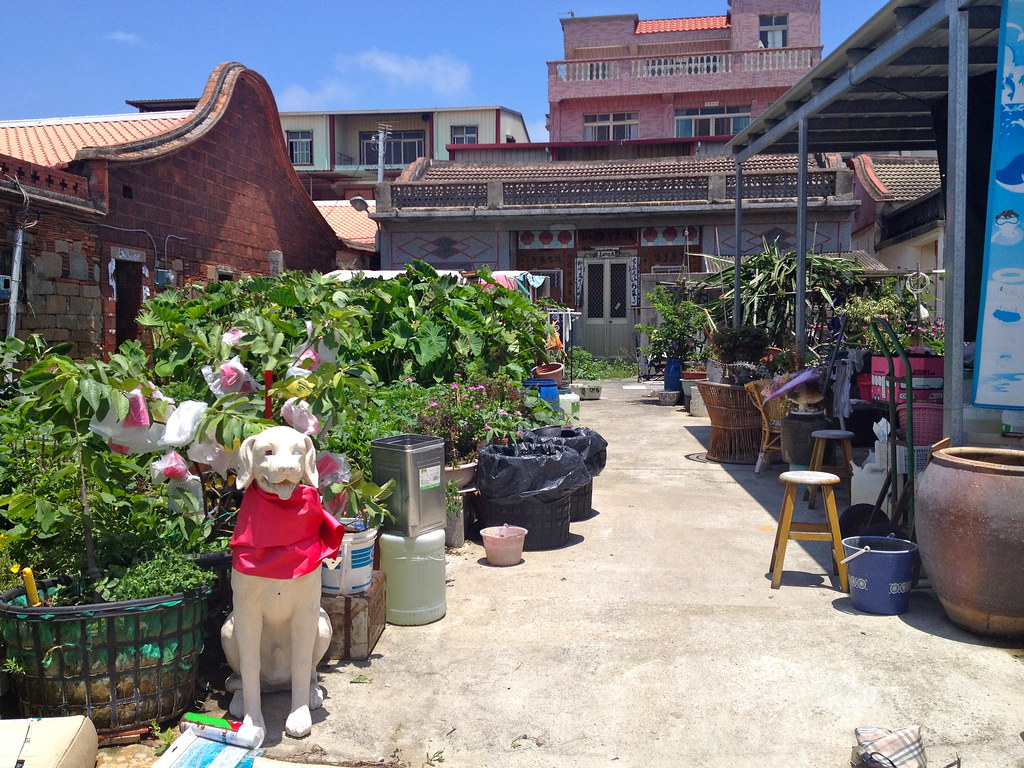
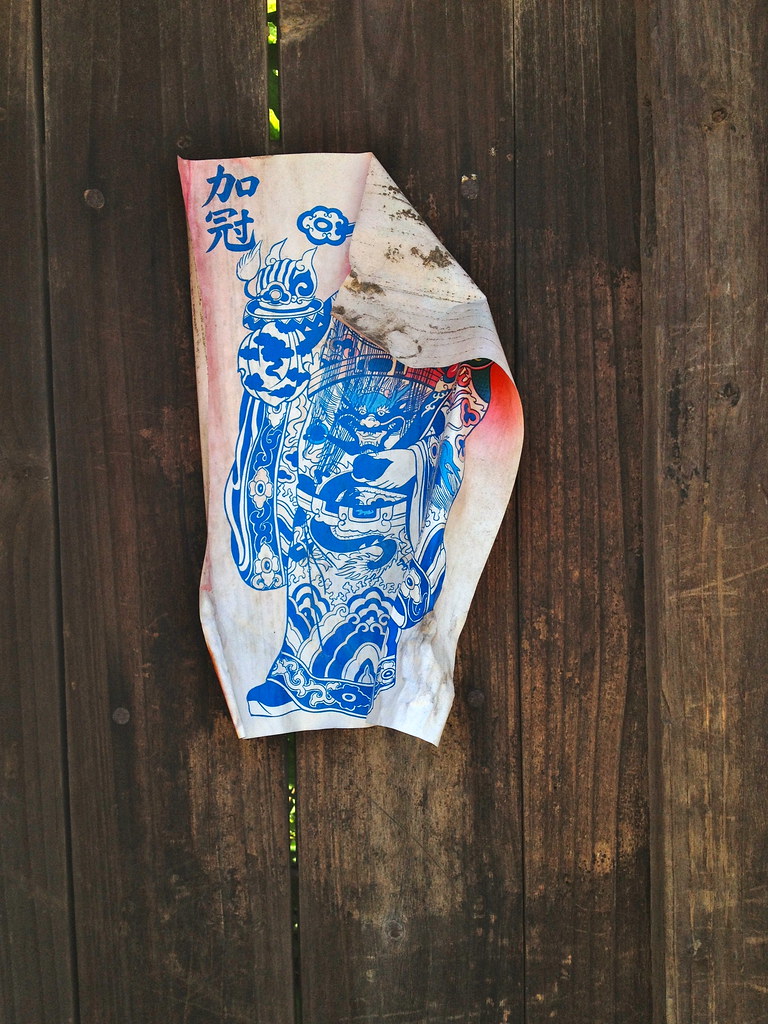

Anyway, as I've mentioned several times but haven't yet posted, over the summer Brendan and I went to Jinmen (Kinmen, Quemoy, whatever) just before I left for yet another trip to the US for yet another family issue (this one less serious). I decided I'd better post about it before I forget all of the particulars!
Two notable things about flying to Jinmen from Taipei: the first is that you pass right over Penghu, so you get a bird's eye few of Magong Island. It's quite something, and is a good reminder of how small Magong really is. Secondly, I didn't think anything of it when I took a few photos of the Central Mountain Range of Taiwan from the airplane as we flew down the coast - only to find it's actually illegal, at least according to Taiwanese law, to take photos of Taiwan from airplanes! Obviously it's a national defense thing, I just hadn't heard of such a law before.

We stayed at ㄚ樂的家, a small "foreign style house" (洋樓) a short drive from Jincheng city - you definitely need to rent a car on Jinmen, though buses do exist - to stay here a car is crucial as it's down several country roads at a tiny hamlet on the waterfront. Worth it!

The inside is also preserved in a traditional look, and there is a kitchen and dining area for your use (breakfast is provided - generous portions and very local-style).
A couple of things struck me about Jinmen - not just the sheer number of old houses and traditional architecture, but also the number of abandoned buildings, most of them old, some of them not. Some of these were foreign-style houses, others were more traditionally Chinese buildings, still others seemed to be from the 20th century.






Second, how many buildings still in use retained their traditional flavor:

Third, the extent to which a lot of iconography - old, but also at times new - conflates the KMT with the Republic of China, in a way you just don't often see in Taiwan proper these days (I'm not sure I've ever seen it).

Rui You School (not functional as far as I know) on the eastern side of the island
Check out the top of that building's arch - it's hard to see in the photo, but it's a KMT flag crossed with an ROC flag. Not something I can recall seeing in on the Taiwan mainland, although I am sure it must have at one time been quite common.
On our first day in Jinmen, we took a nap (our flight left at some crazy early time) before driving first into Jincheng city and then over to Shuitou as the sun set. I won't bore you with too many details, as Jinmen is a well-documented destination, and I primarily want to show off photos! We walked down Mofan Street, passed the maternal chastity arch, and checked out the Qing dynasty military headquarters before heading a bit downwind to the Kui pavilion - interesting in its own right but we had more fun wandering the narrow alleys and warrens between mostly abandoned buildings, which were alive with lots of scurrying cats - some well-fed, others not so much.
One quick thing worth noting before we get into photos - the Qing military headquarters' side rooms are used for storage for much of the year, leading to peeks in windows that reveal scenes such as this:

AAAAAHHHHH!
I was so intrigued by this creepy room of bridal mannequins in retro dresses that I went to some effort to ask about it - not really sure how Qing dynasty military operations and mid-century Western brides were related. Turns out they're not, this room is just given over to a local business for storage.

Ruined buildings around Kui pavilion

Mofan street - nice to walk down but not a lot going on

Another interesting old building near the Qing military headquarters

The largest surviving memorial arch in Taiwan (Qiu Liang-gong's maternal chastity arch)

Just a pretty window casement

Creepy, cool Frankensteiny abandoned "Western style house" near Kui pavilion
By the way, the Rough Guide recommended oyster thin noodle place near the arch, and the scallion-oyster bun place just under it? Both excellent. Worth it, even though they're in a guidebook. On Minzu Road just near the turn-off to the memorial arch are a few shaved ice places. The one we went to was also excellent, and I have it on good authority the others are too.
For those who need a place to relax, get some air conditioned cooling-off time or just have a decent cup of coffee, near the end of Mofan Street there are two cafes, and the one we went to was pretty good.

Special water glasses are designed to sit at an angle at this cafe, which also serves coffee grown in Taiwan among other things.
In Shuitou, which is very popular with tourists (and justifiably so), we wandered a bit until it got dark. There is a pretty good restaurant here that serves "Jinmen local food" at a set price per person - no menu, they just bring you a set number of dishes according to the size of your party. It's set in an old foreign-style house (just ask around). The inside looks like this:

One of the more ostentatious old houses is also a cafe, which is worth a stop (just to get the chance to go in), and is open until 5pm. They don't have food per se, except cafe style snacks like waffles, which are okay but nothing to write home about. Chinese tour groups sometimes come here, which may account for the Mao signs.

The next day, I realized that I had not seen any wind lion statues at all - and with wind lions being, well, THE famous thing from Jinmen (other than that historic battle, and Kaoliang liquor), so rather than hit sights in the guidebook, we just circled wind lions on a local map (they are all labeled) and took off driving to see how many we could find, with the idea that we'd see interesting stuff along the way. This is where the whole "chasing the wind lions" title comes from - we literally did that, basically for an entire day!
We drove out to the far east of the island, passing through Jinsha, Shamei, Shanwai and Shanhou. Here's the thing about posting in December about a trip you took over the summer, for which the map you'd used, on which you'd circled your various planned destinations, was so tattered by the end of the trip that you threw it out: we stopped in a whole bunch of interesting places not in any guidebook (well, not in our edition of Rough Guide anyhow), but I can't remember exactly where those places are.
I'll do my best - here are some of the wind lions we found, and things we saw along the way. First stop, Huishan Temple (會山寺), just off Huandao E. Road.


These two lions are a short walk behind (the former) and just out front (the latter) of the temple.
This is not the temple, this is an example of an old house in this area, which is well worth stopping and walking around in despite a few angry dogs, that is still very much in use and beautifully preserved.




A short drive - also walking distance - from here is a small village, notable (and most easily found) for its old movie theater (closed), which was spruced up and used as the set for the movie Paradise in Service, which I have never seen (but would like to). You can wander in and out of the old shops, which are outfitted with period furniture and even products, at least insofar as they needed to be to function as a movie set. The whole thing is now maintained as a tourist attraction and is genuinely worth a stop, even if none of the old shopfronts are authentic (and I'm not sure they are).
There's a decent cafe here called 心情咖啡 that has good stuff and is a nice place to take a break.



The old movie theater was almost certainly a part of the movie set, and features a few old-style hand-painted movie posters (which are probably too good quality to have just been the background for a movie shoot).



A big, muscled ROC soldier takes out a Voldemort-like Communist
A little further along Yangsha Road, where it meets Dashan Road, you'll come to another set of long-neglected foreign-style houses (at least one has a population of geese in its front yard) and the Rui You school, pictured near the top of this post. There are a few more wind lions around there (I think I've got the correct wind lions matched to their locations:

After the "Paradise in Service" movie set, I have to say, I was more intrigued by old-style buildings with old-style signs that are still in use, and not refurbished for a movie.








At some point we passed through Shamei and got some of the famous shaobing there (tasty - worth it - check your guidebook) though my favorite part of this section of the drive was stopping to wander some of the quiet backstreets. It is easy to get very hot and very tired in Jinmen, so we took a rest on a stoop in one of the older, more shambling back lanes and chatted with locals while local cats lazed about.






I'm not sure when this happened, though, because after we left the neighborhood with the Rui You School, we followed the road out of town right to the coast (past some interesting-ish views of windfarms), turning at a small reservoir-like lake that is either man-made or man-contained, before heading up a road that led to a turn-off (forgive my vagueness, I really don't remember well) where, completely by accident we came across a tiny little parking area with a stone staircase leading up a hill, which looked like it'd have an ocean view. Why not, right?
Turns out at the top there was some old gate - I actually don't know how old although we checked at the time, but old (like 14th century) and fairly recently restored. Checking the name online after a deft Street View search, it was 觀日門, near Tianpu (田浦) village. Of course then I upload my photo and realize the name is right there. Doof.

Then we drove along Buhua Road, which is not that interesting in and of itself but is dotted with a fairly high density of wind lions. Here are just a few:


...before heading into the Lake Tai recreation area looking for more wind lions. We missed the museum as it was getting late, but managed to get this lovely picture of the sign for the "amusement zone":

AMUSEMENT IS MANDATORY IN THE AMUSEMENT ZONE.
...and we only found one fairly unimpressive wind lion, but it was cool to ride around the back roads.
We finished off with dinner in Shanwai, after finding a few lions there, too - including this sad-looking colorful one at the edge of a parking lot who is very definitely male:

Throughout Shanwai we kept seeing these flags, and although I am fairly knowledgeable about Taiwanese folk religion and culture, I have to admit I don't know what they signify:

If anybody does know, I'm all ears. I rather hope I didn't take a disrespectful picture (though that's pretty rare in Taiwan, other than perhaps funerals you can photograph nearly everything).
Jinmen is a KMT stronghold, which means that a lot of old statues of Generalissimo and general Mass-Murdering Jerkwad Chiang Kai-shek (ptooey!) are still kicking around, where they might've been taken down in other parts of Taiwan. However, both Brendan and I appreciated the context of the statue in this circle, flanked as he is by a massive election poster - for the DPP! Ha haaaaaa, sucks to be you, Chiang. I hope you choke on it in the afterlife.

We hiked up a hill past more friendly cats - Jinmen has a lot of cats - to a few more wind lions before having dinner and driving back to our hotel. Wind lions in older sections of towns, usually far from the modern center, tend to be older:

And we also passed this dalmatian-themed hotel with a pet dalmatian:

And found parts of Shanwai to be fairly attractive:

Another good thing about our hotel is you can hang out outside at night and drink Taiwan Beer (or whatever you like), and you can even have free Kaoliang, though I only had a tiny thimbleful. I'm not afraid of strong spirits - my whiskey of choice is Laphroaig after all - but I just don't care for Kaoliang.

But wait, there's more!
I also can't remember when we did this, but at some point we stopped at Shanhou culture village. Historically the home of the Wang family and their many, many, many extended cousins and various relatives, now it's mainly a tourist attraction, but worth a visit. The oyster omelets are actually delicious, and there's a wind lion not far away. You can buy Kinmen Wang Da-fu balm here - a green herbal balm not unlike Tiger Balm but milder and more vegetal - the third-most popular Kinmen export after knives made out of bomb casings and Kaoliang, possibly fourth after those cookies you see everywhere. I bought some because I love balms, and we already have a bomb knife (thanks Joseph!), and I don't like Kaoliang.
Anyway, some photos from Shanhou:







...and while we didn't make it to Maestro Wu's bomb knife shop (because we already have a bomb knife), or the Kaoliang distillery (because neither of us really likes Kaoliang), we did go to the Guningtou battle museum, with it's wonderfully/horribly propagandistic oil paintings of the ROC forces defeating the PRC on the nearby beach. Not a lot of photos from that, but here are some photos from the nearby town, with the famous bullet-ridden yanglou (foreign style house), after which we visited a temple erected for an ROC general, Li Guang-qian (李光前將軍廟), who died in the battle on Guningtou, which is a short drive south on Huandao Road:



We had no particular reason to visit the temple other than that we drove by it and it looked interestingly militaristic in a way that most temples, uh, don't. That's the great thing about just tooling around and not worrying if you hit every sight in the book.

Another benefit of tooling about is that you find things you didn't even think existed. Rough Guide mentions one old granite tower (also 14th century), but if you wander enough and stop where you see interesting signs, you'll come to a few more (no idea if they are authentic vintage or were built/rebuilt some time later).

This is the one in the guidebook.
And this is one of the random ones we found:

...and we found at least one more besides these two. They all look about the same though.
We also hiked up Taiwushan, which sounds impressive except it's not particularly high. Before going up we explored the old military cemetery near the car park. There are some nice views, and notably, more of Jinmen's many cats.

We stopped at the old inscribed stone (my photo wasn't very good) and Haiyin temple, which was a pretty good place to take a rest before heading back down (somewhere along the road up Taiwushan we found a pathway to another one of those granite towers).

On our last day we drove around a bit more and found a few more wind lion gods, including some way out in the countryside by the airport. These lions, it seems, are undeniably gendered:

Well hello there. Aren't you just a happy little fella?
...and a few photos that didn't really fit anywhere else but I basically just liked:











Labels:
historic_sites,
jinmen,
kinmen,
kmt,
quemoy,
roc,
taiwan_islands,
travel,
travel_in_taiwan
Subscribe to:
Posts (Atom)

